Text
A Discussion Of LavenderTowne and Hazbin Hotel
So, a little while ago, a YouTube channel called LavenderTowne ventured into the Hazbin Hotel fan space to propose some criticisms and fan redesigns of the characters.
I had thoughts on the original video, but those are irrelevant because its reception was… tumultuous, and in my opinion disproportionate. The video has since been taken down, and LavenderTowne uploaded a follow up to it (link). In which she stated that her experience with the Hazbin Hotel fandom wasn’t the most pleasant, something I would like to address.
So, this post will be an academic discussion of the designs from the second video. Because I think her criticisms were interesting and because I want to show that it is possible to disagree with someone without being unpleasent.
Also, I want to give LavenderTowne a more welcoming experience with the fandom, and try to make up for some other members of the community.
Let me explain.
SPOILERS AHEAD (Hazbin Hotel)
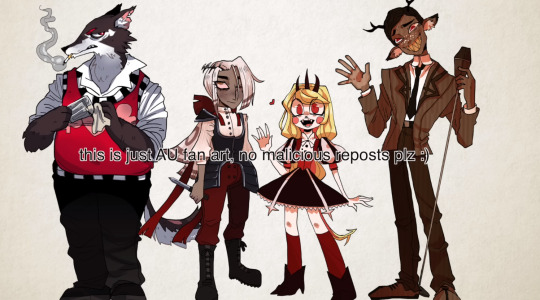
I'm going to start with something that needs to be said. You can disagree with the rest of my post, but this is non negotiable:
It is never, under any circumstances, acceptable to harass someone for their opinions, especially about art. I don't care if you take issue with conclusions or perceived motivations, actions like I observed are not ok, and are not welcome in this fandom.
I hope I made that clear.
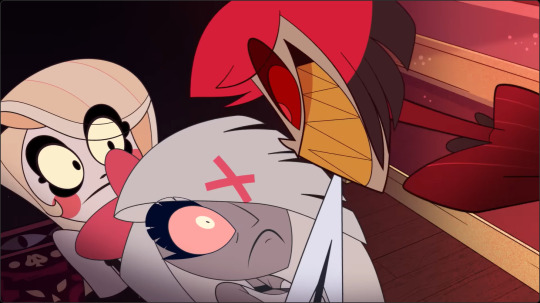
Anyway, I am going to be addressing the second video, because LavenderTowne took the first down, and I'm not about to intrude where I'm not wanted.
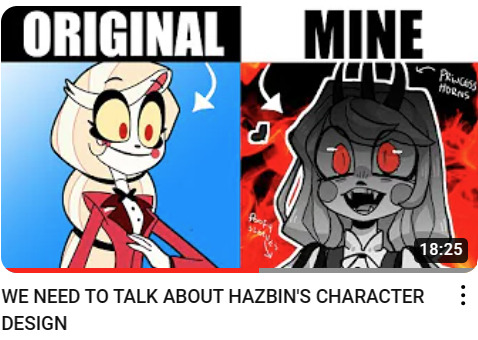
LavenderTowne mentioned the overarching stylistic choices, and I think that is a good place to start with this post, because they are good source of difference. Several of LavenderTowne’s criticisms are leveled at the Hazbin Hotel visual style itself, discussing what specific elements didn’t work for her and how she would personally draw things differently.
That is what I want to discuss here. Rather than the specifics of artistic technique, I am going to talk about the character design decisions brought about by the difference in style. This isn’t a question of skill, but an examination of the ideas presented.
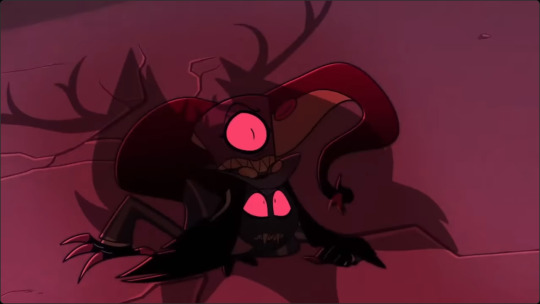
Both LavenderTowne’s style and that of the Hazbin Hotel team range on the scale of realism, as is the nature of art, and that has caused a few of the design decisions that they have made. But it has also had a weird effect on the implied plot that is worth discussing.
Hazbin Hotel is more cartoony, for example, which means its logic is a bit more fluid. Vaggie's eye scar, for example, is shown over her hair, which isn’t how scars work in the real world.
This is a way of getting the tone across. Sir Pentious, at one point in the series, gets caught in the blast of an explosion and sent flying across the city. The design style lets you know that this is being played for a laugh and that he will probably be fine. If LavenderTowne had drawn Sir Pentious in her style, I guarantee that version of him would not survive the event, because hers is grittier (that’s the wrong word, but you get the point).
I do, however, really like the colour palette shift in LavenderTowne’s designs. Don’t get me wrong, I like the limited palette of the actual show, and I think it suits the setting more than the pastel aesthetic of LavenderTowne’s style.
But, those pastel colours are gorgeous and they are a really neat way of solving one of the problems that LavenderTowne identified and I agree with, that being how difficult character differentiation is when everyone has the same colouration as each other and their background.
Now, neither of the two options are implicitly better, there is just a different design sensibility going on.
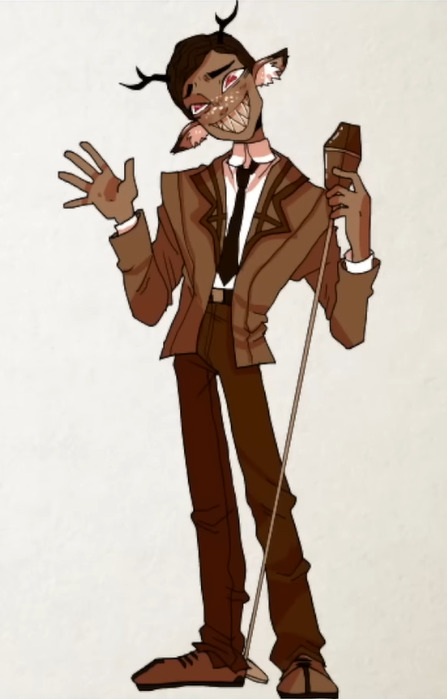
As for the designs themselves, I actually prefer LavenderTowne’s Alastor over the original. I would like to see how it interacts with Alastor animation and transformation, but I think the design overall works better for the character. I like the horns being more pronounced, and I like that neat hairstyle. I think it's much more suited to an overly refined character who revolves around appearances.
“Just because you see a smile, don’t think you know what’s going on underneath. A smile is a valuable tool, my dear! It inspires your friends, keeps your enemies guessing, and ensures that no matter what comes your way, you’re the one in control.”
I think that Alastors original hair style is more about looking cool than looking refined. The shorter style, combined with the more prominent antlers, gives that air of someone actively concealing their more wild undercurrents.

That being said, I'm not as sold on Alastor's expression in LavenderTowne's design. This is a stylistic choice, but I don't think that the Cheshire Cat smile translates over to the alternate design as smoothly as his concept. In the original, that smile was the thing that denoted him as malicious, but LavenderTowne's design seems more huggable, at least to me.
LavenderTowne did raise an interesting point about the voodoo symbolism, a point that others have raised, and I think is worth noting. Incorporating that aesthetic as synonymous with dark magic in a setting based heavily off Christianity is funky, thematically. It's a use of stereotypes as shorthand, which carries the baggage of those stereotypes, intentionally or not. However, I am about as far from qualified to talk about this in detail as possible. I recommend that you listen to the opinions of people who know more about this than me, and who's case this is to make.
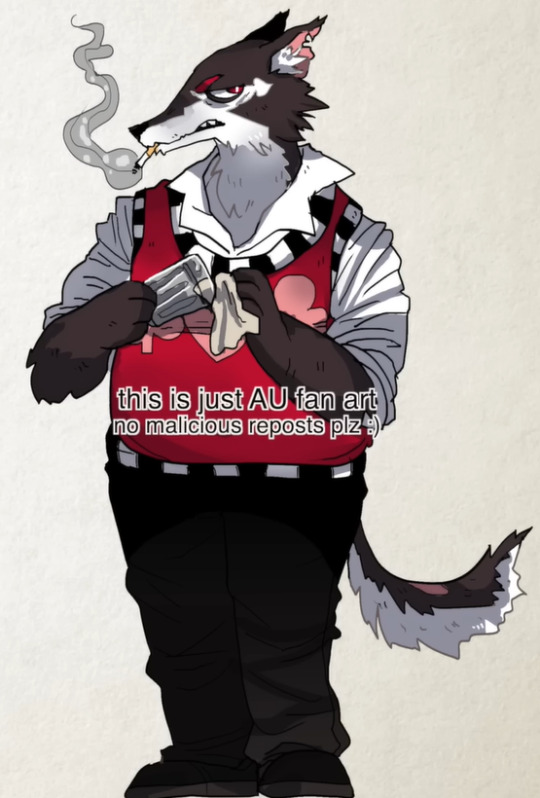
Husk’s design is another that I like, but this one I have slightly mixed feelings about. The body type change addresses another of LavenderTowne's criticisms of the series, again in relation to character differentiation. That is a strength of the video, LavenderTowne gives criticisms, and explains what she means and how she would go about doing it.
Interestingly, that body type issue is something I disagree with. I think the way that LavenderTowne has handled the issue she identified is fascinating, and one of the best parts of her process. But this is simply an issue I don’t see as a problem.
The criticism is that the silhouettes of the characters are exceedingly similar, meaning that identifying them is difficult, as well as limiting in terms of variety of proportions. I could point out Sir Pentious or Husk here, but that is arguing in bad faith because Husk is very clearly the exception to the rule, and Pentious actually conforms to her observation. Without his hood out, Pentious’ silhouette difference is in his tail, which is rarely onscreen.

The reason I am ok with this, is that Hazbin Hotel has a thing for transforming character designs. Charlie, Valentino, Emily and Serah, Lucifer, even Adam, Vaggie, and Lute, as well as a ton of others. All of these character designs shift as the story progresses, revealing aspects of them that they have kept secret. I like having the baseline similarities if everyone gets a moment where they show off how different they are from that baseline. I think that is a cool story beat that, for me at least, outweighs the problem of similarity. I’m sure LavenderTowne would disagree with me here, and that is more than fine.

Back to the point, Husk is a character who is surprisingly acrobatic and martially competent, and the slight shift in the alternative design switches him into more of a bar brawl type character. This feels like the guy who would just deck you and tell you to cool off, rather than throw something at you. He looks like the type of bartender he is, cool and calm, and ready to offer advice when needed.
The removal of the wings is an interesting choice. On the one hand, it clears up his design and makes him look more down to earth. On the other hand, it leads into my main bugbear with this design. I don't think this version of Husk looks like an overlord.

This is subjective, and I am struggling to quite explain it. But the wings, as well as his voice, give a sense of gravitas to Husk. Without that, Husk looks relatively unremarkable.
The outfit plays into this. While I prefer it and its subtlety, there is little that marks this version of Husk out as higher ranking.
Again, this isn't a case of the original designs being objectively better. This is a different design that communicates different things. LavenderTowne’s Husk is a humble bartender rather than an overlord playing pretend. I simply like the story that the original offers more.

Vaggie’s new design is both my favourite design of the four, and the one that is the furthest from the story of the show.
I love the quieter eye scar, I love the silhouette, and I think moving the ribbons to her back is a genius bit of visual storytelling.
The outfit is cool (I especially like those boots), but there's an asterisk to that, because I don't think it entirely suits Vaggie as she is presented in the show.
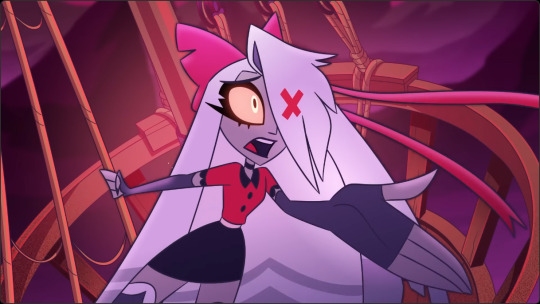
At the risk of oversimplifying, Vaggie is a fairly uncomplicated character. Not because she's written to be shallow, but because the show doesn't have time to explore her personality.
So, you get her past, which is fascinating, and it leaves some interesting things on the table.
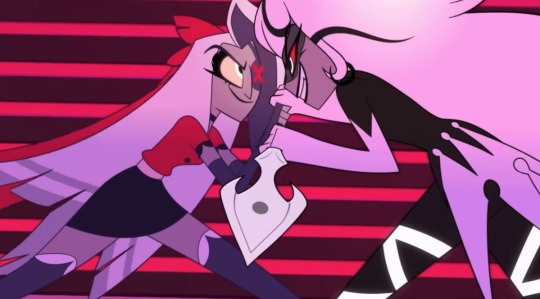
For example, Vaggie has zero self preservation instinct and will burn herself to the ground for Charlie. This isn't complex, but it's remarkable how much the writers (and animators if you’re looking for that kind of thing) get out of this one detail.
Most notably, her character grows into realising that love means living for someone rather than dying to keep them safe. This culminates in the defeat of Lute, the embodiment of her past, who doesn't think to move out of the way of a collapsing building.

Similarly, Vaggie was an angel and wants to hide that aspect of herself. This makes her multifaceted in backstory, but the reveal doesn't have time to dwell on her characterisation, so it just feeds into what I said before.
I think that with another season of time to develop, Vaggie’s characterisation will become as complex as her backstory. But that doesn’t come quickly.
The point I am making is that I don't think this version of Vaggie would wear armour until the end. She doesn't think she can get killed, so why would she need to protect herself?
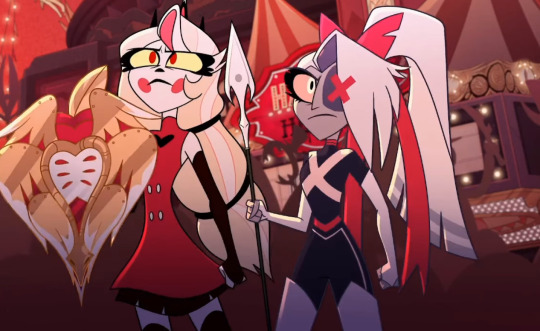
Which means that LavenderTowne's design would work for the last episode of the show, if it had wings, which is sacrificing the single best piece of foreshadowing I have seen in a long time. Seriously, I cannot stop gushing about those ribbons.
What we have, then, is a version of Vaggie with a slightly different story and personality. To me, LavenderTowne's Vaggie looks like a character who craves safety. She seeks Charlie because she offers emotional stability and kindness, the one person in hell who Vaggie doesn't think is against her. But she would wear the armour and outfit because of the injury. She realises she can be wounded and grabs the heaviest set she can find, the twin coloured trousers come from that desperation, and add to the imbalanced aspect of her design.
This version of Vaggie is defensive rather than offensive, and though it renders Out For Love obsolete, I find it more interesting than the original.
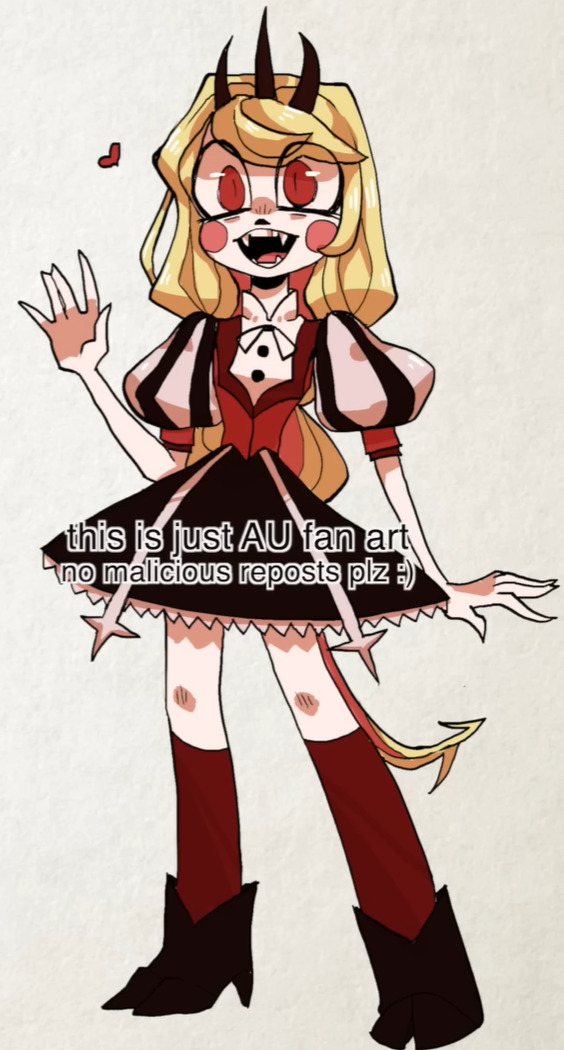
Charlie's design, however, I'm not such a big fan of. I'm sorry LavenderTowne, I really am. But this design really doesn't sit right with me.
Hazbin Hotel has a circus theme going on. The main foyer has a circus tent affectation, for example, and Charlie gives off the aesthetic of the ringmaster.
Charlie is very overtly the antithesis of a Disney princess, and that comes across in her design. Instead of wearing a floaty dress, she wears a suit and suspenders.
Yes, the hooves and horns being more prominent is a cool alteration that I appreciate, but the alternate outfit really doesn't feel like Charlie.
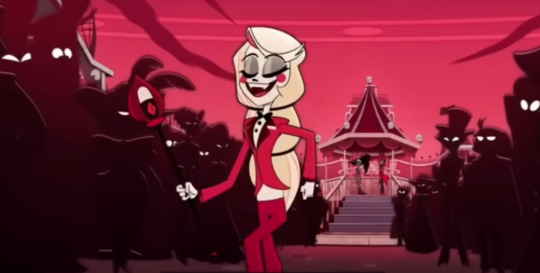
I think the difference is in the framing. To me, LavenderTowne's Charlie comes across as naive and optimistic, where the original design is more relentlessly hopeful, and that second one matches how she is in the series.
Charlie in Hazbin Hotel showcases true hope. Not optimism, hope. The type of emotion that keeps getting knocked down, but picks itself off the floor ever single time, and gets ready to try again. Charlie has no proof of her philosophy, no basis. She's not trying to recreate phenomena, she doesn't even know she can succeed. That's why she needs the hope.
I don't think that LavenderTowne's design has that vibe. Instead, this Charlie seems younger, which contributes to the naivety. It feels like it leans into her regular design, so the more fearsome transformation comes as a shock, mostly.
On the other hand, the three horn tiara element is genuinely really cool. It gives that air of reality, and hints at the transformation without giving it away. They round out the design and make the “this is a demon princess” clear.
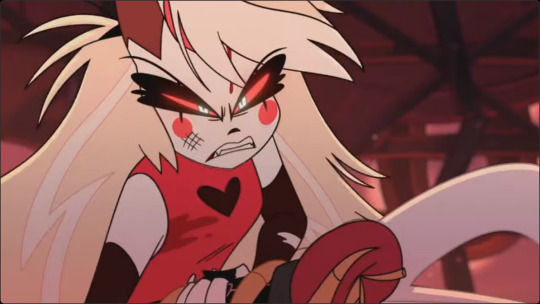
Interactions between this Charlie and Adam, Lute, or Sarah would be interesting, as this version seems designed to foil off them, rather than the other way around. Especially Emily, this design seems genetically engineered to mirror her and make her question her ideals just through existing in the same place.
In short, this Charlie seems more gentle than the original, which might help in some aspects, but I prefer the original.
One again, this is my opinion, and not objective by any stretch of the imagination. If you disagree with me, good, that's the bread and butter of how analysis and discussion exists. But I hope I have shown that disagreement is possible without aggression.
Which brings me to my conclusion, and I have something here that I hope you will like.

LavenderTowne's designs feel like they are made for the same story, but paced differently. They feel like a different style of musical. They feel like they were made for a version of Hazbin Hotel that had more episodes and has time for subtlety, something that the original show unfortunately didn't have.
The story feels the same, but the minour changes make it seem more drawn out. The tone is different, and that effects the entirety of the rest of the story.
In other words, she is designing an AU, something she makes explicitly clear at least five times in her video.
LavenderTowne mentioned in her video that she might do a follow up with a few more characters. I would be intrigued to see this, because I want to know what Angel Dust would look like in this version of the story, as well as the actual angels and even the Vees.
I also am fascinated by how the art style affects the tone of the story. And with LavenderTowne's permission, I might have a crack at writing some of the key scenes from the show to fit this aesthetic and tone. I think that would be an interesting thought experiment.

Final Thoughts
LavenderTowne’s designs were dope as all hell, and the points she raised were worth discussing.
I love the series, but I understand that it's not everyone’s cup of tea. Content warnings should get that across, but also some people just won't like elements of it for any number of reasons, and that is ok.
I think @ohnoitstbskyen put it best in his discussion of the finale of the series. (Link). In his closing remarks, he spoke at length about people who will discover the show and the effect that it will have on them. That sentiment, boiled down, became the title of that video, and concisely says what I have taken just under 3000 words to talk around.
“This show will save someone’s life, but it isn’t for everyone.”
But let me be clear about why I wrote this.
I saw some of the shit that people wrote about LavenderTowne's original video, and though a lot of it was positive, a fair chunk was not, and I want to put my foot down. Disagreement about art is healthy, but if you think that involves harassment at all, then tell Husk he still owes me a drink.
On a lighter note, this is my first post about Hazbin Hotel, so for those who are reading my stuff for the first time, hello. I am Ari, I do media analysis, and I plan on doing a series on Hazbin Hotel, going through each song with lyrical and musical analysis once I finish my current one on Wicked. So, if that interests you, maybe stick around.
#rants#literary analysis#literature analysis#what's so special about...?#character analysis#hazbin fanart#hazbin hotel fanart#hazbin hotel#hazbin alastor#hazbin charlie#hazbin vaggie#hazbin husk#lavendertowne#I will write for this AU if LavenderTowne lets me
20 notes
·
View notes
Text
This Is The Owl House (Through The Looking Glass Ruins)
Ruins are what civilisation fossilises into. They are a weird microcosm of time, representing past, present, and future simultaneously. They are the legacy of a world long gone, its lies and the crumbling truth beyond them. A ruin represents a story.
For those who don’t know, a looking glass is another term for a mirror, so if you combine the two into a single title, Through The Looking Glass Ruins, you will end up with a tale of introspection. Who are you? Who do you think you are? What is your legacy? And does that actually match reality?
This is an episode about self image.
Let me explain.
SPOILERS AHEAD: (The Owl House)
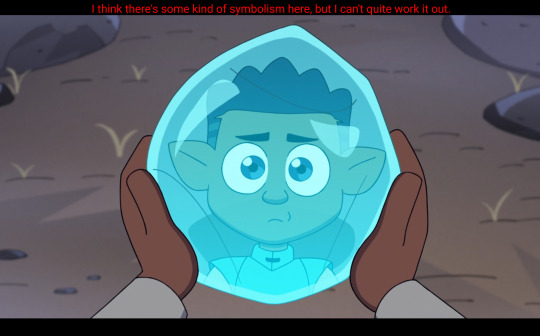
Discussing Gus is a deceptively difficult task, because there are so many lenses to read him through, and most of them either contradict or are actively incomplete.
The fact that The Owl House’s third season is so short is the main cause of this, and I want to stress that I’m not blaming the team behind the show for that failure. Disney pulled the plug and it is remarkable what was achieved, but there is no denying that Gus got shafted.
So, this post, as usual, will stick primarily to the episode at hand, with nods to the future. Just understand that those nods to the future are more difficult than usual because there is a lot of setup in Gus’ arc for things that never came to pass.
We cool?
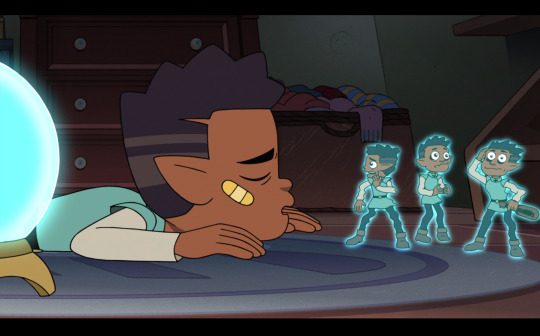
So, first up, mental health. Gus has what a professional will probably diagnose differently to me, but I will call self worth issues for the sake of clarity. This episode manifests this as Imposter Syndrome, which is interesting from the illusion stand point.
Speaking as someone who deals with Imposter Syndrome, I think it is important to understand that the syndrome is a lie. Not that it isn’t a real issue, but because it is your brain lying to itself and convincing you that you aren’t good enough and will not be good enough no matter how hard you try. It tells you that your pride in your own work is false, and that you should constantly be trying to emulate others, something that, because it tells you you aren’t good enough, you will never be able to do satisfyingly, which will cause you to spiral.
Once again, this is a lie your brain is telling itself.

But here’s what makes it insidious, and here’s why a tumblr post isn’t going to magically fix it. Hell, here is why I still suffer from it, despite apparently knowing that it is false.
Humans aren’t rational, the brain isn’t rational, and imposter syndrome isn’t rational. You can intellectually understand something, but emotionally be in the dark, and that’s how something like this strikes. You know that the feelings don’t make sense, but you still feel them, and it’s a nightmare.
All of this applies to Gus. He is intelligent, possibly one of the most intelligent people in the cast in terms of the streamlined, reductive view of intelligence that school cares about and pretty much nobody else. So, Gus is clever enough to understand that he is skilled and that illusions are powerful, he has even been told that multiple times over the series, but he is yet to emotionally come to grips with that aspect of his life.
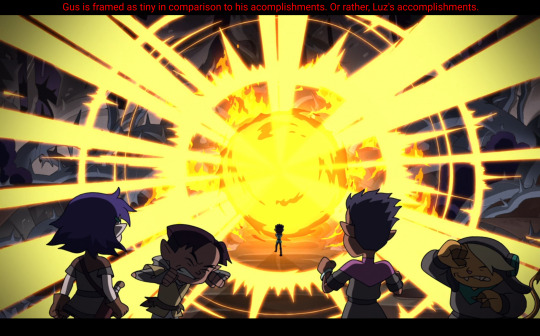
That thing about streamlined, school approved intelligence is also a cog in this machine. Gus is conventionally intelligent, he can remember things, and has the type of charisma that feels at home writing a lengthy essay (the type of charisma that I would kill for). This is the type of intellect that schools praise above all else, and at least where I live, to the detriment of anything else. It is a restrictive view of the world that means people like Luz, who’s brain is much more heavily wired towards problem solving and creativity, are excluded.
In simpler terms, Gus fits the mould, so his ability set being limited to one type of magic is a magic literalism of that. But at the same time, that unique powerset isn’t particularly useful in its basest form. When the Glandis students mock illusion magic, the image that they come up with is fairly useless, but it’s a strawman, and it's a strawman that Gus has confined himself into trying to be.
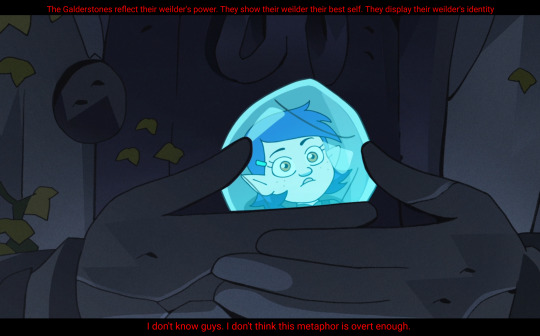
The Galder Stones have a really neat place in this as amplifiers. They are reflective, something the episode goes out of its way to show multiple times, as characters stare at their own faces in their hands, literally holding their legacy in a crystallised form. But, they are also amplifiers. They make a person’s magic more powerful, and if magic is an expression of individuality, as it usually is in stories, that means the stones exacerbate a person’s identity. Essentially, they turn anyone who uses them into a caricature.
But why can’t illusionists gain power from them? I have a theory. I think that illusionists are already projecting themselves and their minds into reality with their spells. They are creating things that are both real and not real at the same time, so the way they gain power isn’t through amplifying the illusion, but through creativity in application.
Which brings me to a scene I like to call “The camera is alive, and it hates you.”

The Owl House has had fun with animation before, and I am a sucker for the moments where the show gets visually experimental. But those have just been scenes. The Gromethius flashback, for example, is fun and quirky, but it barely exists for a minute.
This, however, is fun and cathartic. It is clear that at least one of the animators on this show has roots in horror (like me), and was having an absolute blast with this entire sequence. Every visual is traumatising in more than the series’ quirky usual. This stuff is genuinely terrifying, and it's shown from Bria’s perspective.
Gus effectively takes the camera and starts calling the shots himself. This is his episode, and he is controlling what the audience sees and how they see it. Don’t push your luck with the Director of Photography, they will mess you up.
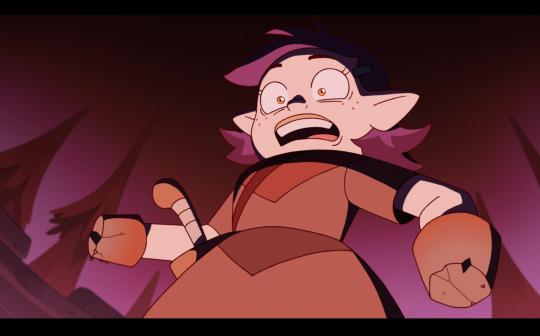
It’s also worth noting the contrast between Bria and Gus, because it makes the result of their confrontation that much sweeter. Gus is a trickster who, up until this point, has been playing by the rules. He is wacky, but he’s more lawful than chaotic. Bria is a physically skilled character, who believes in strength and power and… ok I can’t be the only one who ships her and Boscha, right? Right?

Anyway, Bria has a highly regimented worldview, if you are strong, you deserve to be on top. If you are weak, you deserve to be on the bottom. She’s also a construction mage, meaning she actually makes things, while Gus only pretends to, hence why she calls him weak.
There is, however, one flaw in that conflation of weak and illusory. Well, there are a few flaws, but one in particular. How do you fight something that isn’t actually there?
Answer: You don’t. You really don’t. Turns out that Bria’s weakness is a foe she can’t take head on. Bria is literally holding a Galderstone, something that makes her nebulously more powerful, and she gets clowned on.
Bria’s defeat involves the ceremonial disintegration of her hands, and the loss of her magic. Back to that idea of self image that this post was supposed to be about, Bria has built an identity around being powerful. But that persona crumbles when she is confronted with something powerful in a different way to her, and when she loses her own power. Her identity isn’t built on rationality, but on vibes, and illusions are really good at getting into people’s heads.
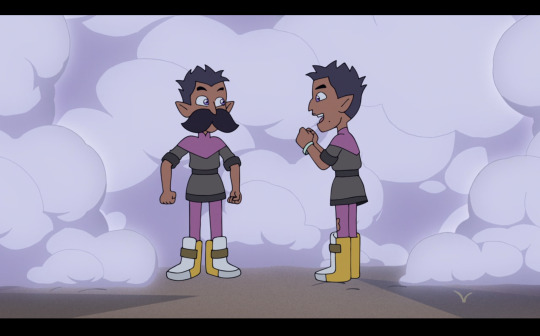
On a different note, Gavin’s identity revolves around getting his father to pay attention to him, which fits into the theme of self image pretty well, but it’s notable how each of the four Glandis are specifically designed as foils for the Hexsquad. Gav has the parental issues and the ambition, linked to Amity. Bria is the kind and nurturing one, linked to Willow. Mattholomule is the lowest on the ladder, how Gus perceives himself. And Angmar, well Angmar is my sweet blonde boy who is remarkably athletic, hyper fixated on a specific kind of animal, and is a mix between terrified reaction to any threat and immediate willingness to step in front of an out of control animal without hesitation. In my mind, he reflects a fifth member of the Hex Squad who will be introduced in about… one episode’s time.
Although, you will probably have noticed that this is an extremely reductive view of every character I have mentioned, and that is the point. I mentioned in my first post about The Owl House that the series has a thing for introducing characters twice, once as a trope, once as a character. So, each of these characters are introduced as “x character stand in”, but get their identities built up throughout the episode until Bria doesn’t resemble Willow at all. Again, this relates to the idea of self image, and how a character sees themself in contrast to how others see them.
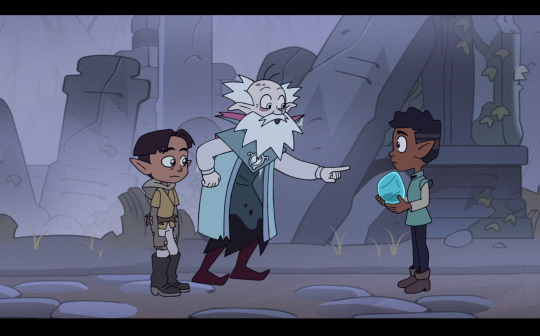
“Keep honing your powers of observation.”
Powers of observation, huh? Not powers of imagination, observation. The guy who knows the most about illusions in the Boiling Isles specifically draws connection between the tradition and the ability to see things. This is a tradition of making things that aren’t there, right? What gives?
Each illusion that Gus conjured to scare away the Glandis students was tailor made to fit them. It didn’t take a genius to point out that Angmar likes butterflies, and Gav straight up told him about his issues with his father. But Bria? Gus worked that out on his own.
Because illusion isn’t about making stuff up, it's about realising things.

Illusion magic is about the balance of understanding the world around you, and turning people’s thoughts into something they can actually interact with.
On the topic of interactions, Lumity.
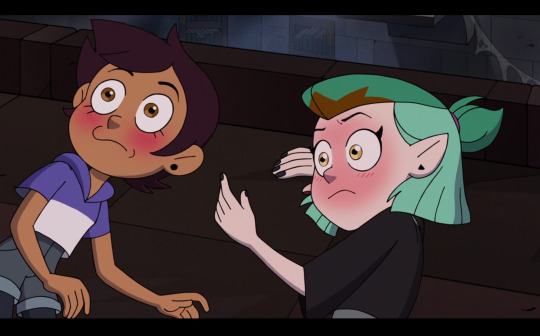
Often in stories, romantic relationships are made compelling by the characters involved and very little else, and this is a perfectly valid way to write stories. Two characters are slotted into a ship dynamic, and you get something interesting. For example, any action movie ever written, or the entirety of Big Bang Theory.
Lumity isn’t this. The romance between Luz and Amity directly causes conflict and drama in the plot, but also drives character development between the characters, and is related to the themes of the story. Those being identity, freedom, and here specifically, self image.

I’ve mentioned before that Luz’s greatest strength as a character is her ability to act as a catalyst in other people’s arcs. That’s what the light motif is all about, she shows people the way forwards.
Most obviously, Luz has been a majour foil for Amity. She challenged Amity’s ideas of ambition in I Was A Teenage Abomination; She caused Amity to reflect on herself and showed her a way of rekindling her relationship with Willow in Understanding Willow; And she forced Amity to stand up to her mother in Escaping Expulsion. Now, in Through The Looking Glass Ruins, Amity has to reflect on what has happened.

Because this is functionally the B plot of this episode, backing up Gus’ story, the actual plot of this is remarkably simple. Luz and Amity need to find a McGuffin, and they need to do it together. Basic plot, shenaniganry ensues.
But basic doesn’t mean bad. In this case, it facilitates some of the series’ coolest set design, and some brilliant interactions between the two characters.
“Malphas is actually the one who gave me my job and my own study room. He's usually nice, but if we're caught, he'd feed us to the book wyrms.”
“I know here that probably means unholy, blood-sucking snake monster, but in the Human Realm, that's just a kid name for nerds”
“Huh. The human world sounds odd.”
“Maybe it would be less odd if I showed you around someday. But, uh, let's turn back. I don't wanna push you.”
“We're getting that diary.”
First up, there is the repeated establishment of stakes. The monster threat is just an excuse for a cute moment. But the real thing that Amity cares about the most is her job and her study room. Symbolically, her ambition and her isolation respectively. But she is willing to risk both of those for Luz.
I think that the speed of Amity’s decision is also important here. She doesn’t have to weigh up the options and the risks. She is doing something for Luz and that is, by default, more important.

However, I want to point out that, at the end of the episode, Luz gets Amity’s job back. That isolation and ambition are valuable to her because they are valuable to Amity. As much as I will complain about not getting to see the trials, it is obvious what Luz has had to do to get there. But that’s weird, right? Luz probably nearly died to get back the symbol of the old Amity, why?
I think at this point, Luz is changing the metaphor. The study room no longer represents isolation, but the connection that she and Amity forged. The job, meanwhile, transitions from ambition to agency, as it's a small microcosm of Amity’s independence from her mother.
Essentially, Amity emotionally let go of her old self to be with Luz, but this doesn’t mean she has to sacrifice everything. This isn’t an exclusionary relationship, Amity can be more than just Luz’s girlfriend. She doesn’t have to define herself by one, specific thing.

That idea of self image is a big thing in Amity’s arc. Although it exists in contrast to Gus. Gus knows who he is, he just can’t work out if he likes that or not. Amity, however, has no idea who she wants to be, and what is important to her.
“Everything's changed since you came here. Being around you, it makes me do stupid things and I wish it didn't.”
Who does Amity think she is? I’m not being incredulous here. It’s a question worth asking because, at this point, I don’t think Amity herself could tell you. The impeccable acting decision to make this line into a flood highlights that conflict within her. She is having thoughts in bursts, then faltering and regretting it.
She wants to move towards Luz, but she can't risk falling off her throne, so she keeps taking big steps in every direction, overcommitting to everything, but then walking it back.
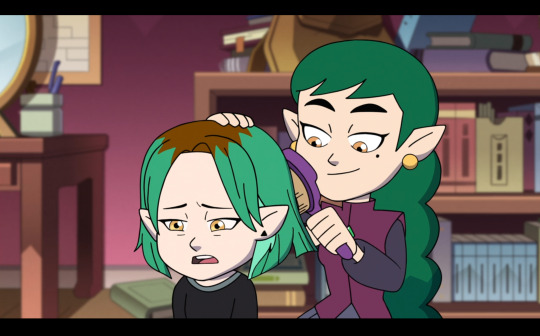
After that, Amity talks through her inner turmoil with her siblings, people who represent both her old life by being her family, and her new life through their rebellion and encouragement.
“Ever since Luz came here, things have just gotten confusing. I'm thinking things I've never thought before. I'm feeling things I never used to feel.”
“Is that so bad? You weren’t happy before.”
Hey Emira, do you… do you want my blog? Because that was the most insightful thing anyone has ever said on or about the Boiling Isles.
But she’s right. Amity is trying to choose between two aspects of herself, and trying to work out who she thinks she is. Emira simply points out that one of the options isn’t at all worth it.

But now, I finally get to talk about hair. The single most iconic visual metaphor of the series, this is the type of good storytelling that means you don’t have to over analyse to know you are looking at something done well.
The green coloration matches Odalia, to parallel Amity’s closeness to becoming the golden child that her mother is trying to shape her into. But this is dyed, it is a decision by either Amity, Odalia, or both. It’s a character beat of a person trying to appear in a specific way. It is Amity communicating to the world that she is Ambitious.
The natural brown hair is linked to Alador, and his creativity. It relates to a trait of Amity’s that I will talk about when I cover Reaching Out, because that is my favourite episode of the series. It represents a desire for connection, an ambition to not perform successfully, but live well and happily.

The purple is Amity’s choice entirely, and it is her decision to be happy. Abomination coloured, something Amity takes pride in for herself. It represents happiness with oneself, and the agency to derive joy from something that previously only inspired anguish. It is also related to Luz, who has been associated with purple throughout the series, although that is a byproduct of her own theming.
Luz is the concept of individuality incarnate. She is unique in every way, and this doesn’t cause her shame, outwardly at least. So, she is represented by the rarest colour in nature, and the most valuable. The history of purple and its association with royalty is too fascinating to condense into a tumblr post, so I will say that it intrinsically symbolises value because of its rarity.
It is a colour that says “I am who I am, I am unique, and I am valuable because of that.”
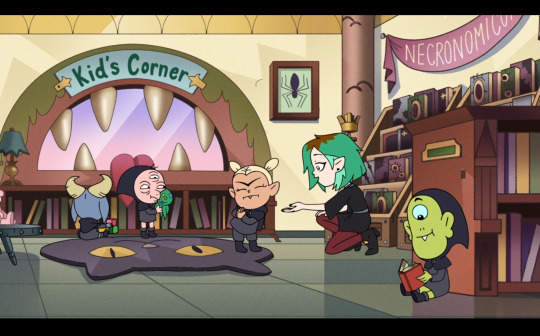
What I haven’t seen discussed as much, is how the style relates to this. Amity’s hair is usually up, keeping her refined and held together, reminiscent of her mother. Its looseness always coincides with her softer nature being made apparent. In this episode, when we first see her, her hair is down and we see someone who is happy with herself, quietly.
I do like the symbolism of a child taking her accessory, causing her hair to be let loose while at the same time forcing her to bring out her gentle side.

However, at the end of the series (spoilers until the next image), her ages up character design actually walks back a few things. Her hair is now back up, and her brown roots have come back. So what gives with that?
You don’t stop changing when one story in your life comes to a close. Amity probably keeps moving forwards during the timeskip, focusing on that connection, and styling herself in a way she sees fit. Consciously, she has found a balance.
That hair symbolism actually continues into her song. Ok it’s not her song, technically, but the The Owl House fanbase claimed it, so I get to talk about it.

Little Miss Perfect is a song written by Joriah Kwamé as part of an album called TAPES: A Song Cycle. It was then submitted to the 2019 Write Out Loud competition, where it was covered by Taylor Louderman. A competition that it won.
Strictly speaking, this isn’t a song about Amity. But the animatic by ThatDorkWhoDraws was incredible and effectively commandeered the song for the ship. I would do some analysis of this animation, but it got taken down by the creator for understandable reasons, and I don’t want to intrude into a space in which I’m not wanted.
I’m talking about the song and the song alone. Because it has entered the fanbase’s public consciousness, and because the song is really interesting for how it relates to the metaphor I am talking about.
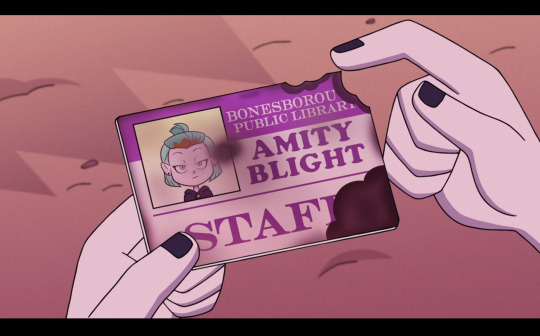
The song is about that crisis of identity that I have been going on about. The protagonist is choosing between ambition and love. It is an exploration of that love itself, and despite there being little evidence for Amity’s realisation of her own sexuality being so chaotic, it is a compelling story that brings about some really cool metaphors. Not least of which, is the hair.
Straight hair, straight A's
Straight forward, straight girl
Little Miss Perfect, that's me
The hair is associated with her perceived perfection, her pride (heh) in her composure and ambition. But when she lets someone in, what happens?
She braids my hair, I sit there
Blacking out for the first time
The blacking out thing is a direct callback to an earlier line, in which she lists her ability to stay awake at parties as one of her aspects of perfection. But the braiding of hair is the underrated key part of this. Her hair is no longer straight, she is no longer perfect, and that’s ok.

Final Thoughts
I really wanted to talk about the Zosan ship when I was talking about romantic subplots that drive character development, but I couldn’t make it work. That one is a fan ship, and it works brutally well for similar reasons to Lumity, actually. So, I guess I’ll have to leave that for another post.
Other than that, this episode is awesome, and is The Owl House flexing its muscles. The fact that this is a phenomenal episode of television, and it's still about average for this season is a testament to the skill of the team behind this show.
I will say something controversial though. I don’t particularly see the Matholomule x Gus ship. I think if you squint, it could be read as an asexual, homoromantic ship, but that’s only if you squint. I think these two are genuinely just good friends.
Next week, we get to talk about my precious boy, and maybe even my own crackpot reading of this character. We will see.
Previous - Next
#rants#literary analysis#literature analysis#what's so special about...?#character analysis#the owl house#toh#toh lumity#toh luz#amity blight#toh amity#toh amity blight#toh gus#toh gus porter#gus porter#lgbtq#lgbtqia#lgbtq community#queer#little miss perfect#don't fuck with the director of photography#the camera is alive and it fucking hates you
13 notes
·
View notes
Text
The Cooler She-Ra (Huntara)
Let me clear something up.
She-Ra and the Princesses of Power doesn't get good, and it doesn't go places. It is good, and it has been in those places since day one. The first story discusses the cost of war with considerable nuance, lest we forget. Yes, the quality of the writing, animation, and debatably the acting increases as the series goes on as the crew finds their feet. But the themes of this series are explicit from the jump and do not change.
Reading that back, that was a bit more confrontational than I intended, so let me try and phrase it a different way.
For a lot of episodic stories, good and bad, the overwhelming vibe is of acceleration. The themes start out slow, then get piled in over time. Scooby Doo: Mystery Incorporated, for example, starts with the basic idea of friendship and secrecy, but matures to discussion of family, history, and legacy over time. This isn’t a flaw with the writing of Mystery Inc. at all, it’s just a way of writing.
Watching She-Ra and the Princesses of Power is like being in a single roomed house with a few small windows. You can see the outside world and the story through those windows, its clear enough to know there’s something interesting, but you can’t see the whole thing.
Then in season three, the walls start falling down and you start to realise where you have been the whole time.
Let me explain.
SPOILERS AHEAD: (She-Ra and the Princesses of Power)
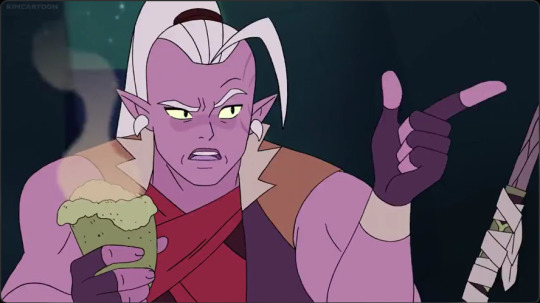
I’m going to start with something small that isn’t particularly related to the rest of the post, but I think it’s of equal importance and can’t be ignored. Huntara is gay.

This may not seem like a big deal, but it kinda reframes the rest of the series. Because up until this point, the queer coding we have seen has been a few background characters, and Spinnarella and Netossa, who have an implied relationship.
That’s just what it is, coding. They are coded together, but it isn’t dwelled upon. If it had only been season one that got made, I guarantee you there would be eejits online who would argue that they were platonic friends.
But Huntara explicitly flirts with another woman in a bar. This is a named character, who is casually queer, and that is what sets the precedent retroactively. Now it can no-longer be argued that this series isn’t interested in showing queer stories. Now Spinnerella and Netossa’s relationship is essentially confirmed, as the series has made itself and its stance abundantly clear. This is a show with queer people, it isn’t subtext, and it hasn’t been subtext this whole time.

Let me be clear, I am not arguing that Spinnarella and Netossa aren’t married in the first season at all. They are together, end of argument. But on a literary level, it is coding in that season, and it stops being coding retroactively.
The reason for the coding angle is actually linked to the casualness of Huntara’s sexuality.
Unfortunately, in popular culture and mainstream storytelling, the idea that a character is straight unless proven otherwise is a general attitude. This often means that a queer character isn’t queer unless proven so.
But Huntara establishes a different precedent, casualness. Huntara is just gay, there is no fanfare about it. The episode doesn’t dwell on it. But at the same time, it’s undeniable. This is a series where people are just queer, there doesn’t need to be confirmation, you can assume.
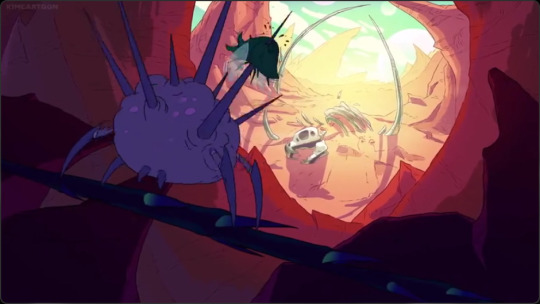
Anyway, Huntara, the episode, is still early on in season two, so it is still setting up what ideas the series will focus on. I mentioned earlier that the series as a whole has themes that it has been discussing from the get go, and I stick by that, but every season and every episode has to zero in on something (with exceptions) for clarity’s sake. In this case, Huntara centres around the idea of revelations, hence this post. Nothing in this episode is what it seems.
Worldbuilding is a key storytelling concept that is rarely dwelled upon except by Game Masters for TTRPGs, and Necrit. But it’s actually one of the most important elements of any work of fiction. Stories are based around vibes, and the easiest and most effective way to set up a specific feeling is to evoke that through the setting.
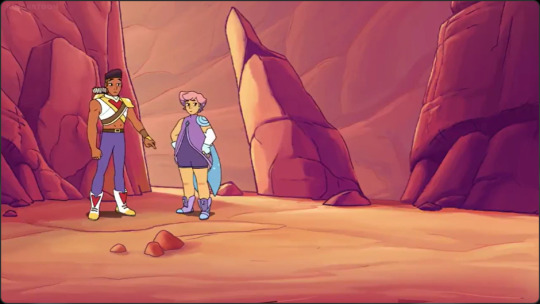
For a few key examples, Bloodborne is a story about injustice, horror, and monsters hiding in plain sight, so what better place to put it than the false civility of Victorian London? Similarly, The Magnus Archives is a story about injustice, horror, and monsters hiding in plain sight, so it is set in modern London. As a contrasting example, Robert Galbraith’s series, “Harold Pots and the Magicky Magic Stuff”, is about how the status quo is fine, actually, and that any attempts to change that is tantamount to murder, so it is set in a British boarding school. I disagree with the premise of one of these stories, can you tell which one?
The Crimson Wastes is an area where nothing is what it seems and everything wants to kill you. The ground could easily be quicksand, or deadly bushes, or a pile of snakes.
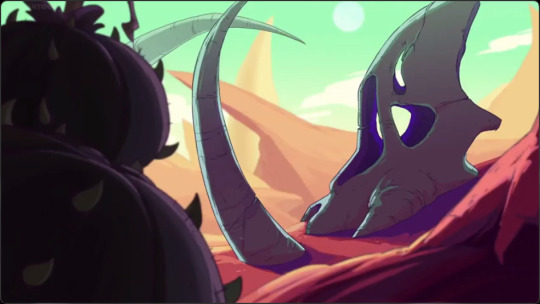
The opening scene is a phenomenal way of establishing the new territory. Not the dialogue, but what it shows you. Enormous skeletons of creatures that couldn’t handle the environment litter the ground, fossils that stand as a testament to life that had to adapt to survive
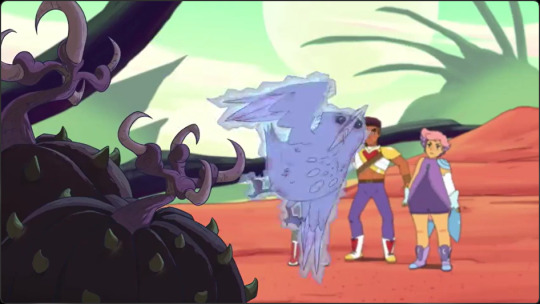
A bird drifts past the characters, landing on a plant. It’s peaceful. Then the bird literally iced, and falls from view, leaving the camera to focus only on the plant itself and all of that terrifying glory. This is telling you a few things. One, look twice at things before jumping in, not everything is as it seems. Two, this story is dangerous, and not even a cute little bird is safe from death. Three, nature and magic are one and the same. I wonder what that will mean going forward.
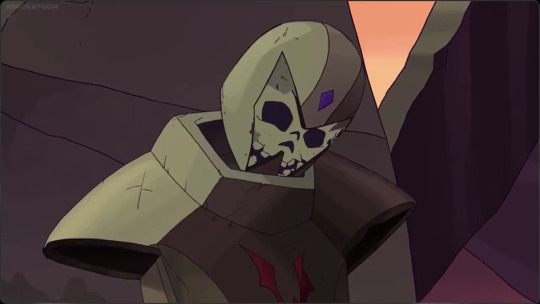
Also, there is a reason that the Horde hasn’t managed to conquer this area. I think praise needs to be given to the sound design of this episode. The scratching noise that accompanies the skeleton is unsettling, and it exists to make you remember that image. This area is dangerous in a different way to anything you have seen before. Not even the villains of this story can reach you here.
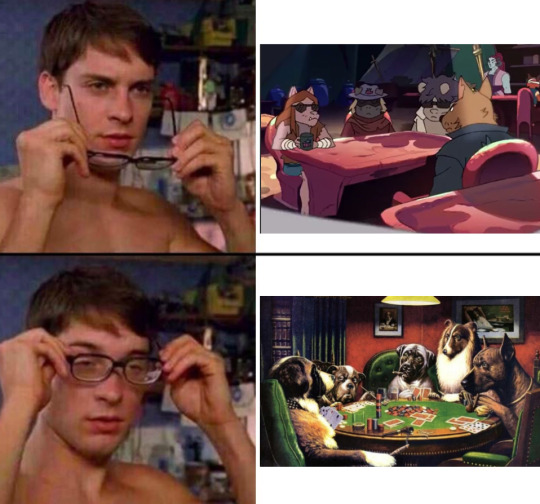
However, there is humanoid life here, which comes back to the theme of revelations and things not being what they seem. Making a living in the Wastes is possible, and that bar being literally inside an enormous skeleton is about as blunt of a metaphor as you are going to get. Surrounded by death, there is life.

Enter Huntara’s eponym, and let's take her apart, starting with her character design.
Huntara is practical, first and foremost. She carries a weapon that can double as a stick to poke things with from a distance (remember this), in case they turn out to be dangerous. She is dressed in simple clothes, not too heavy as to cause her to overheat, but enough to protect her from the sun. She is partially armoured (remember this too), and wears the exact same shoes as Adora, hinting at her background, although she has reinforced and repaired them, again, she’s practical.
But there are two things that I’m missing, and they are the two most obvious things about her. She’s built like a brick privvy, and she’s cool as all hell.
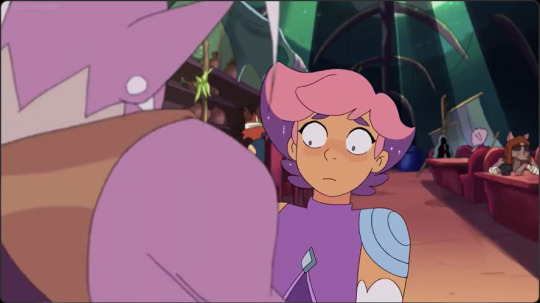
The coolness thing is partly based on her sense of self image. This is someone with a distinct sense of style, utilitarian as it may be. She has styled her hair, wears clawed earrings, and has that tattoo across her head, as well as the torn crop top. Despite her surroundings, Huntara has taken effort to make herself look good. She’s confident in herself.
The strength thing, on top of being the other seventy percent of her coolness factor, leads me into something weird about her design: she looks like Adora. Bear with me on this one.
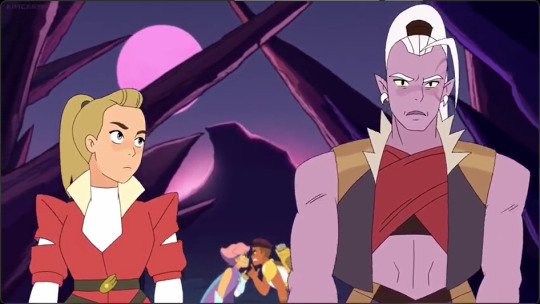
This isn’t exact. Don’t get me wrong, the designs aren’t a one-to-one thing. Her design just has the same energy as Adora’s. The short jacket, with its jagged collar, kinda matches Adora’s jacket. But where Huntara’s is open (remember this too), showing off her strength and confidence, Adora’s is closed in, restricting her and keeping her polished and refined. I mean “polished and refined” here in less of a mark of quality, but more in the sense that she has a lot holding her back and holding her down.
Similarly, Adora has those shoulder pauldrons, making herself look bigger, like a prey animal with false eyes. But Huntara has boxy shoulders that form a shape language, as she has actually developed the defences Adora pretends to have. In that way, she acts as a more completed version of Adora, which is interesting.
Finally, there is that hair, which is put up in a similar way to Adora’s, not the same, but alike enough to make the silhouettes echo. The shot below is about as much proof I have for this crackpot theory.
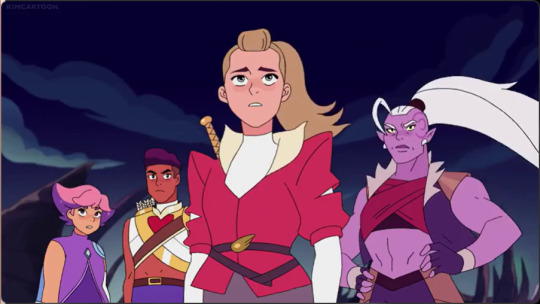
But she’s not exactly a good role model, is she? She’s duplicitous, which harks back to those ideas of revelations and second glances that I mentioned earlier. But she’s also standoffish, at which point I will bring back those elements of her design I said to remember, the spear, the partial armour, and the open jacket.
Huntara isn’t emotionally healthy, she has just dealt with PTSD in a different way to Adora, she has run. She has adapted to keeping things at a distance, and not letting people get close, exemplified by the polearm that doubles as a long range weapon. She is also terrifying, which also helps her stay isolated.

This all covers up for the fact that she has very few emotional defences. She is only partially armoured, and despite her best efforts, she has nothing protecting her heart. Adora brings up something that is a little too close to Huntara for comfort, then asks her about it, and her only reaction is to make a threat.
She does this twice in this episode. She feels emotionally vulnerable, and immediately pins the cause of that vulnerability to the closest wall. It's as if it's a stock reaction.
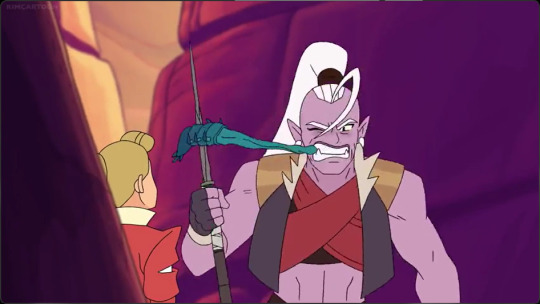
“Huntara doesn’t run from anything. I want to be here.”
I call bollocks on that. It’s a mantra, a myth, not an actual response. It’s like saying “haven’t you heard the legend”. But I actually want to talk about the vernacular a bit here.
The second sentence is reminiscent of a character not yet mentioned in this episode. She has intellectually acknowledged that things are bad, but she has convinced herself, emotionally, that this is where she wants to be. She wants this, this is her life, she cannot be out of control. Similarly, if things go wrong, it’s what she deserves, because she wanted this. If the phrasing of that and the need for a feeling of control doesn’t sound exactly like Catra, I don’t know what does.
On a different note, the third person thing isn’t done by many other people in this series, but isn’t it a funny coincidence that two of the people who do it are in the same place at the same time? Who could have foreseen this?
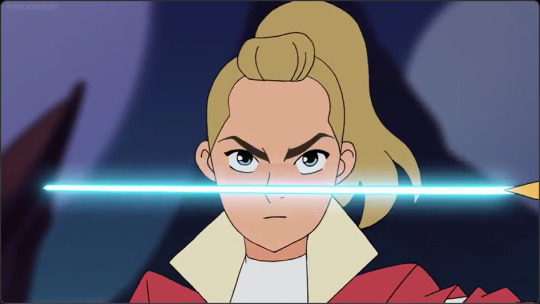
Putting it mildly, Adora, throughout the series, has an identity crisis going on. She cannot decide if she is Adora or She-Ra, and it leads into a true Jeckyl and Hyde plot that I discussed in more detail in this post, which manifests most acutely as her referring to herself in third person. When she is most powerful, she is She-Ra, and Adora is a different person. But when she is feeling weak, she is Adora, and She-Ra will save her.
Although, in another weird twist of fate, Huntara knows more about She-Ra than anyone else besides Razz and Light Hope, because she has heard of the legends and has studied what Mara left behind, she gives us a summary of what this whole She-Ra thing is, through all the biases of Adora and Mara. So don’t think this line escaped me:
“She-Ra is a person?”
From everything that Huntara has seen and heard, nothing has told her that She-Ra is an individual. Instead, it's a thing to be revered, a concept rather than an identity and this is… correct?
She-Ra isn’t another person who Adora becomes, it isn’t an identity for Adora to assume, its something to be, like a hero, or a friend. It’s a facet of Adora, rather than her whole being. But Adora can’t see that, because of the aforementioned identity crisis.

I mentioned in my last post that season three gets as close as this series gets to evading the tragic format without actually breaking free, and I think that the talk of identity is a good place to explain where Adora fits into this.
Adora’s tragic flaw is also her greatest strength. She thinks incredibly quickly. This makes her a phenomenal tactician in the short term but causes her to be incredibly shortsighted. This is in contrast to Catra, who is always about ten steps ahead of everyone, ut can’t see the forest for the trees most of the time.
So, Adora internalises things quickly, and a majour side effect of this is that she doesn’t always complete things rationally. Her identity problem isn’t so much this incarnate as just this problem exactly.

She has been given a magic sword and told a bunch of things about it, and she has taken that at face value and moved on, internalising this in a way that isn’t accurate. She is She-Ra, but that doesn’t remove everything else about her.
Adora has been tossing up the idea of giving up her past and embracing this new identity that she has been given, and season three presents her moving away from that idea. Huntara is an example of that extreme, and it isn’t enviable.
But at the end of the season… well, you will just have to wait for more of my blog to see how that works out.
Or you could just watch the show.

Lastly, I would like to talk about Hordack and Entrapta, because their scenes in this episode are both really cute and really thematic.
The reveal of Hordack’s frailty plays into that idea of revelations that I have been talking about, but it also plays into his and Entrapta’s themes of failure and self worth and sets up those themes in Horde Prime.
Stylisation is something that this series plays around with a lot when it comes to backstories and asides (I conveniently have a post talking about this idea in detail), and that comes back for Hordack’s flashback.
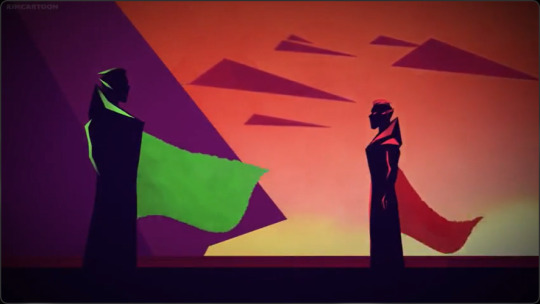
This is simple, incredibly so. There are simple shapes, and very few colours on display. It is flat, but in a way that is very clearly intentional. Hordak has an extremely simple worldview. He isn’t a two dimensional character, but like Glimmer, he sees the world in an overly reductive way.
The colouration also sets Horde Prime out from the rest of the scene here, holding him up on a pedestal. Hordak and everything around him is a shade of red, orange, or yellow. It’s warm in tone, but also blends together with the purple to make Hordak look at home, and one with his surroundings. But Horde Prime stands out, and the eye of the viewer is drawn to him because of that abrasive green. He is at the centre of Hordak’s mind.
The flashback does this multiple times, using that green like a highlighter to focus the viewer's eye on the most important part of the image.
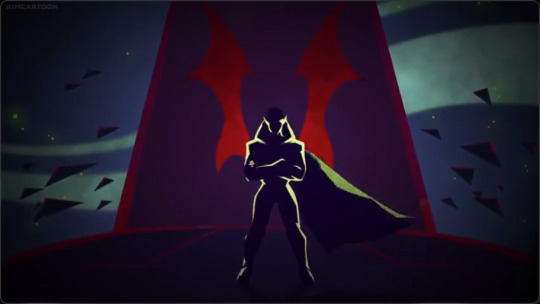
Also, this looks like a political poster, doesn’t it? It’s propaganda, and Hordak has taken it, hook line and sinker. That actually serves to explain the flat stylisation, it’s conveying simple ideas. Horde Prime doesn’t get any detail to what he actually looks like other than “he probably looks like Hordak” and “he’s got a cape and that collar thing”. This is the idea of Horde Prime, not the actual guy. We are looking at the pedestal this character stands upon, rather than the character itself.
That collar thing is actually a neat little character design element that is reflected in Hordak until this episode. Entrapta replaces it with her armour, and I think its important that Entrapta and Horde Prime are immediately presented as opposites.

The literal only thing we learn about Horde Prime’s personality in this episode is that he doesn’t particularly like individuality. Failure, defects, and deviations are all worthy of being killed for. You have to prove your worth, instead of it being assumed. And even then, I am inclined to doubt whether Hordak will be able to prove himself, no matter what he does.
Entrapta is villainous, kinda. She is aligned with a machine of war and death, which isn’t the most ethically sound of activities. But, she opposes the main villain of this story on principle.
“Everybody needs help sometimes. And you shouldn't be upset that you're not perfect. Take Emily! Her programming is glitchy, the left leg sticks, and she's loud. Emily's got quirks, but that's why I like her. Imperfection is what makes scientific experimentation possible. Imperfection is beautiful. At least to me.
… And you're really too obsessed with this whole failure thing, I mean, I'm a failure...
I don't fit in. I became friends with Adora, but she abandoned me. Then, I became friends with Catra, but she doesn't talk to me anymore. But that doesn't mean I give up. I scrounged up a few more pieces of First Ones Tech, and I can't think of a better use for it than this.”
Imperfection is beautiful.
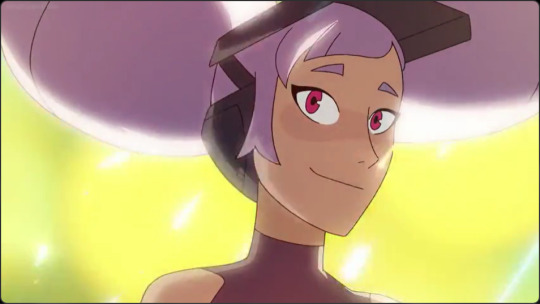
There is also the scientific aspect of Entrapta, which I think hasn’t been discussed that much. She-ra makes a point of equating the natural with the good, and the artificial with the bad. But Entrapta is a scientist and an inventor, where does she fit into that?
Curiosity. Science is the study of the world. It is a means of learning more about nature, and to create things from that nature. She experiments, and understands. Imperfection is beautiful, and if there is one thing nature is good at, it’s variation.
Entrapta doesn’t exist in contrast to nature, but parallel to it. All she does is express the natural aspect of this story in a different way to everyone else.

Final Thoughts
The sound design of this episode is unrivalled so far in the series, and it will get better over time. The sting at the start with the skeleton is perfectly unsettling, and the ambience of the Wastes is superb.
Also, the cinematography of the fight in this episode is really well done, filled with motion and dynamism and tactical expressions of character. The sword duel is cool, and the fact that Glimmer is out for blood isn’t really dwelled upon, but it's notable that both of the goons she fights survive the experience through sheer force of luck.
However, Huntara figuring out Adora was from the Horde because of how she fights was a little weak to me. “I recognise that training”, really? Not the boots? Not the fact that she keeps bringing up the Horde? Ok.
Next week, I will be looking at One Upon A Time In The Wastes, so stick if that interests you.
Previous - Next
#rants#literary analysis#literature analysis#character analysis#what's so special about...?#she ra and the princesses of power#spop#she ra#she ra princess of power#she ra and the princess of power fanart#she ra adora#she ra spop#adora#she ra hordak#she ra entrapta#she ra horde prime#spop adora#spop hordak#spop entrapta#spop huntara#she ra huntara#huntara#fuck jk rowling
18 notes
·
View notes
Text
Welcome
Hello, I'm Ari.
Welcome to my blog, I make posts about media analysis, so stick around if this interests you.
Below are links to some series I have finished, or have ongoing, all in one place for your convenience.
Enjoy.
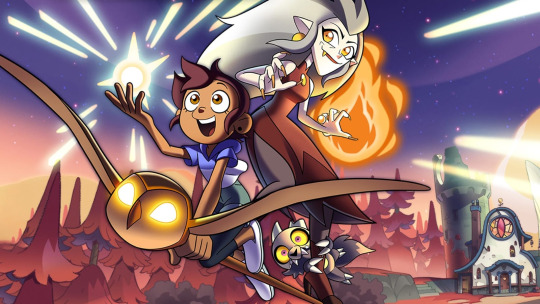
The Owl House (Ongoing)
First - Latest

She-Ra and the Princesses of Power (Ongoing)
First - Latest
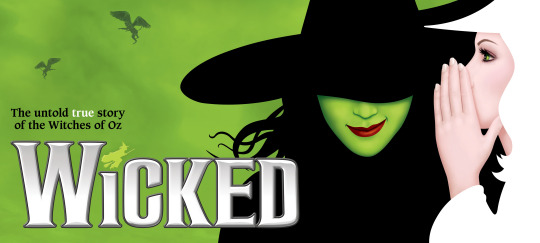
Wicked (Ongoing)
First - Latest
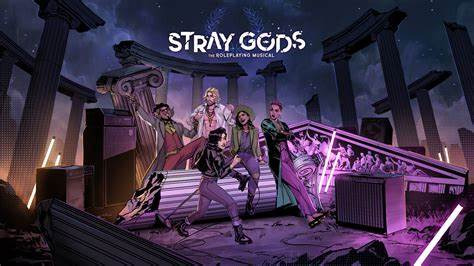
Stray Gods: The Role Playing Musical
First - Last
#table of contents#stray gods musical#literary analysis#literature analysis#what's so special about...?#toh#she ra and the princesses of power#stray gods#spop#the owl house#she ra#wicked musical
12 notes
·
View notes
Text
One Last Hurrah (I'm Not That Girl (Reprise), As Long As You're Mine)
Those who are familiar with my blog will know that I don't particularly agree with the concept of genre. I think it is restrictive, and the dynamicism of storytelling makes it less important for writers than the general public is aware for.
Wicked backs up my claim, I think. The opening number is a booming epic that Glinda switches to a more quiet tragedy, at which point the first act becomes a love story set in a boarding school. The second act mirrors this, slightly, crashing in with a full scale war that Glinda again pushes back to a love story. That same love story and love triangle then takes precedent in act two. Until it abruptly doesn't.
As Long As You're Mine is the finale of the romance arc of this story, and it centres around enjoying the life you have before change takes effect. Although, the romance is a love triangle, Elphaba and Fiyero get a song, but Glinda? Where does her romance end?
With Elphaba. The love story of this musical ends with Glinda thinking of Elphaba.
Let me explain.
SPOILERS AHEAD: (Wicked, Dead Poet Society)
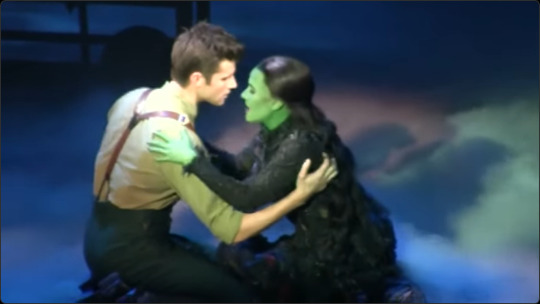
"Don't wish, don't start
Wishing only wounds the heart
There's a girl I know
He loves her so
I'm not that girl"
Well gee, this looks familiar.
This is an interesting case of thematic association. Because on it's own, I'm Not That Girl (Reprise) isn't really that important or interesting. It's a nice melody about unrequited love, which is heartfelt and everything, but not really saying much.
But the word's "on it's own" are doing a lot of heavy lifting in that paragraph. This song is the reprise of an earlier number by the same name, and that means all of the meaning from that song gets carried over to this, and it gets to give its own take on those themes, which is interesting.
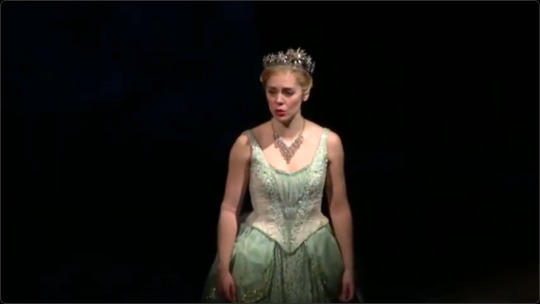
In the internet world of oversimplification and memes, one will probably come across the idea that teachers overanalyse things. The "the curtains are blue because he likes the colour blue" joke. The weird thing is, this joke is correct, but it misses the point entirely.
Yes, overanalysing media is exactly what folks like me do. Technically, you don't need to engage with anything more than the baseline of what you have been shown. If your takeaway from blue curtains is that the owner likes the colour blue, go for it, nobody is stopping you, and that is perfectly reasonable. The key, is that that approach is not inherently more or less valuable than an overanalytical one.
I will wager that blue curtains will evoke a certain emotion in you. Maybe they are a deep blue, like the night just before dawn, giving you a tired, more chill vibe. Maybe they are much lighter, like the sky, giving a more youthful atmosphere. Or maybe they do not match with the rest of the room at all, to comedic or unsettling effect.
The point I am making is that subtext exists, and you don't have to dwell on it, but its a vital part of how communication works. It's also usually a majour factor in engagement. So, at the very least, acknowledging it will help you understand why you do or don't like certain stories.

Once again, I turn to PBS's Wicked In Concert and recommend the versions of these songs from that. This version of I'm Not That Girl (Reprise) is sung by Gabrielle Ruiz, and is really good.
For the moment, however, I'd like to conduct a thought experiment. Imagine that Wicked is actually happening. This is a world where people spontaneously break into song and this isn't weird.
Do you have any idea how hard it is to make up a song once, let alone mimic a song that you were not present for?
In universe, there is only two ways Glinda would know this song. Either she overheard Elphaba pining, or Elphaba sang it to her. Take that as you will.
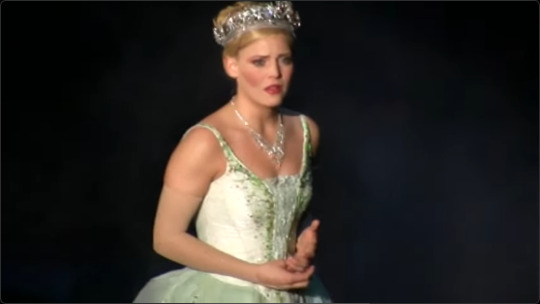
Exiting that thought experiment and back into overanalysing things because it is fun. I have another post about I'm Not That Girl and it's thematic implications (link), so check that out if it interests you, it will form a background for what I am saying here.
Essentially, I'm Not That Girl is the Jolene of musical theatre. It is a song about resignation, but it's core idea is this: Elphaba doesn't think of herself as beautiful or deserving of love. The person she associates with those qualities is Glinda herself. The song is essentially a biromantic heartbreak, when both of Elphaba's love interests love each other, and she can't bring herself to break that for either of them. That is the meaning ascribed to this song and these notes.
Now, Glinda sings the same melody, and it is suddenly flipped. She realises she has been outplayed in the romance game, but she can't bring herself to break it apart for either Fiyero, or Elphaba. The audience doesn't need to hear the same song again, just the highlight reel to let them know that these same emotions are being felt.
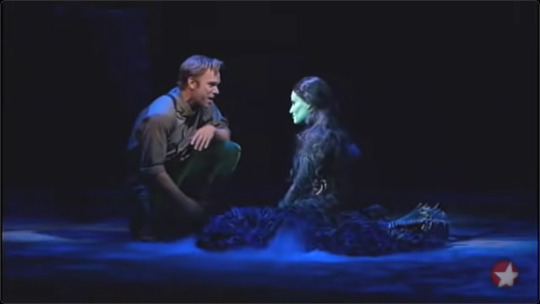
The song then cuts off, and is replaced by a much more active, much more passionate number, As Long As You're Mine. The meaning of which has been summed up best by my flatmate. "Reject society, bonk in a hedge".
That is kind of the entire point of this song, though, isn't it? Living in the moment in total freedom. It is proof that Elphaba isn't crazy, that there are others who see her dream, and that even if this goes wrong, the story will end with her happy.
Full disclaimer, I am asexual, so I cannot comment on the more intimate subtext of this song. I am aware it is happening, but I would rather stay away from the specific thematic significance of that, if that is ok.

The transition of this song comes through that repeated low note. It is hammered, like a war drum, and it drives home that urgency and collision of the two plots. This is the moment in which the musical goes from a romance to an epic, and that rhythm is a threat of what is to come.
Although it is notable that the swaying melodies of Elphaba and Fiyero overpower this drum, their love holding off the inevitable. Specifically, the instrument hitting the note changes from a piano to what my, admittedly lacking, musical knowledge thinks is a bass guitar. (Music scholars, please correct me on any of this). That change means that the heavy beat becomes distorted and stretched, as if time is stretching out.
"And just for this moment
As long as you're mine
I've lost all resistance
And crossed some borderline.
And if it turns out
It's over too fast
I'll make every last moment last
As long as you're mine."
Would you look at that, there is even explicit lines in the song about stretching time out and seizing the day. Carpe Diem.
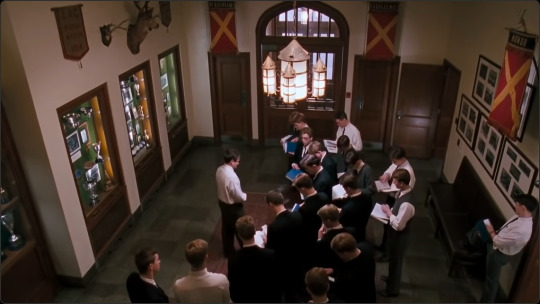
Dead Poet Society is one of the greatest films ever made, and that isn't just my Robin Williams bias speaking. Despite some elements that haven't aged well, the film is truly heart wrenching and has a meaning pretty similar to As Long As You're Mine.
As a side note, this film has a lot more similarities to Wicked than you think. It's about challenging unjust rules, and forging your own path. It's a film about personal freedom, essentially. Although it ends less than happily. It also has about the same amount of queer subtext as Wicked.
In any case, the central thematic of "Carpe diem, seize the day" tells its characters and its students to take life as it is, and live it to the fullest. It is about making the most out of limited time. Quite a lot like As Long As You're Mine.
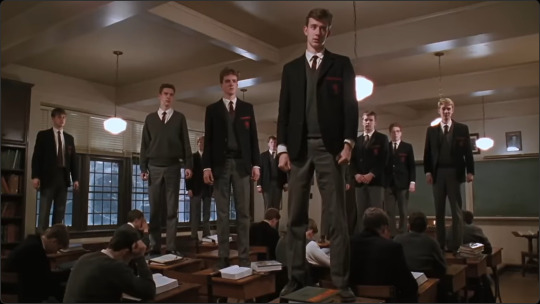
The ending of Dead Poet Society is a tragedy. It ends with the death of a student and the loss of the teacher's job. But it also ends with hope. Things change in Dead Poet Society. The Latin teacher shifts up his lesson, the boys actually learn, and the "Oh captain, my captain" scene is synonymous with looking at the past and making the future better because of, and in spite of it.
That's a familiar ending, isn't it. The main character dies, and the people in their life resolve to make the world better because of the life they lived. In Wicked, the death isn't permanent, because this is a gospel and no main character in a gospel can ever stay dead for more than a few days.

That motif of making time last is reflected in the music as well. Each stanza has a squash and stretch thing going on with the formation. The triplet brings the three notes within together and plays them faster than is normal, making them feel like they are stumbling over each other, falling forwards, until that held note at the end evens out the pace. Things are moving quickly, but it is a conscious decision. to slow down.
Those held notes also create a feeling of clarity in the music. Once again, music knowledge ain't my forte, but to me, this seems like it is working in a similar fashion to key frame animation. Each held note is the crux of the phrase, and the rest is just making up the difference.
Which means that there is a neat little progression going on here. The first phrase, "kiss me too fiercely" contains two, a B flat on "fierce" and an octave fall to another B flat on "ly", as Elphaba tries to fly away, but is brought back down. Then there is the F on "tight", and the E flat on the latter third of "believing", before the stanza links back to B flat for "tonight".

This, according to google, forms a B flat chord with a suspended fourth, which loops back on itself to form a stable, self-enclosed sentence that descends to keep itself together.
The second phrase operates within the same notes but changes the inflection slightly.

That last note creates an upward inflection to prepare the audience for the chorus, rising into it to set up a crashing theme of power and freedom that... doesn't arrive yet.

Instead, we get the same notes repeated, mostly. It's a quiet moment, an E flat that rises to an F for "borderline", then to a high C for "fast", before resolving back to F and then down to a lower C.

Ok music scholars help me with this please. The sheet music that I have found for this song (link) claims the second part of "fast" is a C flat, which my piano app tells me doesn't exist. Any clarification on this would be really nice.
In short, this is understated, and this isn't the first time we've heard an understated first chorus in a Wicked love song, is it? That's how the first chorus of Defying Gravity sits, before Glinda joins Elphaba and pushes her to new confidence.
Which leads me back to my point. Elphaba relies on other people, she needs Fiyero to comfort her, but also to prove she is right. That's the moment she is cherishing.
When Fiyero joins in, he literally makes the song more hopeful by changing the key signature from E flat majour to C majour. He is more graceful and easy with this. He is the rock that Elphaba is anchored to and that supports her.
As such, that final chorus looks like this:

"Just for this moment.
As long as you're mine.
Come be how you want to,
and see how bright we shine.
Borrow the moonlight,
until it is through.
And know I'll be here holding you.
as long as you're mine."
Freedom. Come be how you want to, I'll be there to support you. This is a musical about dreams and reality colliding, and this song is the victory lap of things going well. One small dream has become real, that being the desire for love. And if one is possible, what else can Elphaba do?
On a related note, if Fiyero is the rock that grounds and supports her, what might happen if he is taken away?

FINAL THOUGHTS
Bear with me. Chord analysis is new to me, so if that was completely false, please let me know. As a behind the curtain thing, this blog exists as a place for my hyper fixations to breathe, but also to help me learn more about this whole analytical thing. So, any advice from people who are more knowledgeable than me would be greatly appreciated.
You may note that I didn't talk that much about Fiyero, and there is a reason for that. Honestly, I don't think Fiyero's character in the second act of this musical is that interesting. I'm sure there is lots to talk about with him, but to me, he has been reduced to "love interest for the main character", which I find less captivating as "jock on the verge of an existential breakdown". That's just my opinion.
Next week, I will be looking at No Good Deed, the first true clash of dreams and reality, and Elphaba's breaking point. So stick around if that interests you.
Previous - Next
#rants#literary analysis#literature analysis#what's so special about...?#wicked#wicked fiyero#wicked elphaba#wicked musical#wicked the musical#elphaba#fiyero#as long as you're mine#wicked is a queer story#dead poet society#robin williams
17 notes
·
View notes
Text
Imperfections Part 1 (Keeping Up A-Fear-Ances)
It is an understatement to say that The Owl House's second season has a focus on family. From just Luz's perspective, she has two different mother figure, one and a half adopted brothers, and a deceased father.
But here's my hot take: contrary to popular belief, Eda isn't naturally good at being a parent, and that's not a bad thing.
Eda spends the entirety of the series amassing a larger and larger family with her at the head, but she routinely has no idea what she is doing. However, that doesn't stop her from trying, and that doesn't stop her from learning and improving and being a good mother anyway.
Eda is the embodiment of the balance between found family and born family, and that is exemplified in her connection with her mother, Gwendolyn.
Let me explain.
SPOILERS AHEAD (The Owl House)

This is going to be a two-part post, with the second installment coming later in the series. I want to contrast Eda's motherly behaviours with those of Gwendolyn, and see what Eda learned.
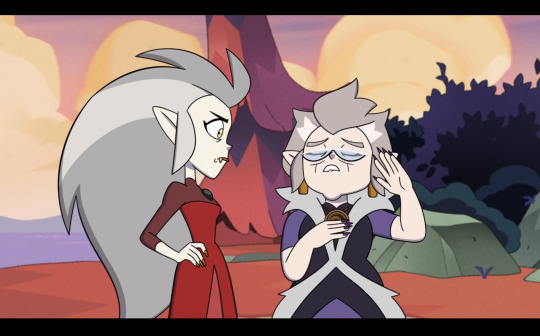
Before hand, however, I need to do some recommendations. The YouTube channel Oakwyrm (@oakwyrm on Tumblr) has two videos that discuss Eda's curse through the lens of disability, titled Curse as Disability and Disability in the Owl House, which are phenomenal. The former of which delves into this episode in detail, specifically surrounding Gwendolyn's reaction to the curse.
In a similar vein, the channel Idlescree (@idlescree on tumblr) also has a video surrounding the disability, titled The Truth About Eda and Disability.
I say this because I will not be talking about the disability angle in detail in this post as I simply do not have the expertise or experience to delve into the topic. I recommend these videos because that angle deserves to be spoken about, and I guide your eyes to people who can and have given it the spotlight it deserves.
I will be talking specifically about the parenting aspect of this episode and what it means for the series as a whole, as well as the ways in which it is presented through cinematic techniques.
Speaking of which, the first thing that Eda learns from her mother is adaptability, and she learns it from Gwendolyn's decisions in this specific episode.

Gwendolyn is introduced as a less than stellar mother, she is overbearing and overprotective, to the point where that has cycled back to hurting her daughter. In the first moments of this episode, she gives the following line:
"My daughter is suffering and I want that thing out! Cut it out if you have to."
Not great. Gwendolyn is willing to hurt her daughter to heal her from something she has been told might not be healable. She isn't willing to stop and take stock of the situation, she wants to preserve what she thinks she has.
Interestingly, this forms a polar comparison with Lilith, of all people. In season one, Lilith made sacrifices for power, and convinced herself that she was doing it to help her sister. Gwendolyn, however, has convinced herself that anything is worth sacrificing for the health of her daughter, even her daughter. Hold on to this thought.

But then Gwendolyn changes, she realises the error of her ways, and pivots pretty quickly and harshly. It takes time to prove to her that what she is doing isn't helping, but once Luz gets through to her, Gwendolyn changes.
That is the adaptability that Eda learned. She saw her mother change her actions, but she also spend years with a mother who refused to change and experienced the effects of that first hand. Essentially, she learned from the example Gwendolyn set, avoiding the pitfalls her mother hit and replicating the successes.
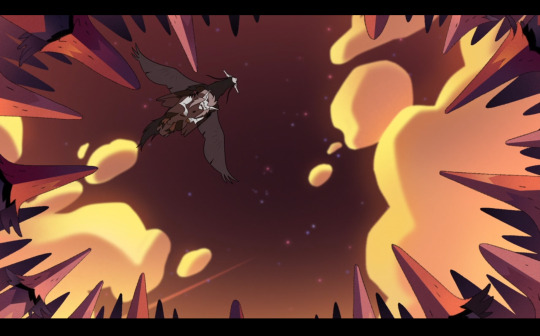
Gwendolyn also showed Eda that you don't have to be perfect, you just have to listen. Even after Gwendolyn changes, there is no chance she will be an infallible mother. She will probably keep some of the tendencies that she has already displayed, but she will learn.
"She was trying to do her best."
Sometimes what you think is the right thing to do is not as clear cut. Sometimes you need to reevaluate. Being a good parent is understanding when you are wrong and adapting to fit that.
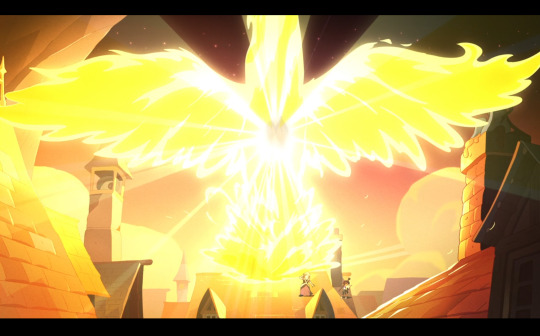
The column of fire is reminiscent of a phoenix, which, on top of being dope as all hell, has some implications I would like to examine.
To those who don't know, a phoenix is an immortal bird associated with fire and rebirth, as well as with the sun. When the phoenix dies, it is reborn from the ashes. As a side note, the sun thing is fascinating, as it has led to multiple different cultures developing a similar myth. When the sun is already associated with life and the sunrise has birth connotations, birds that sing at dawn get that symbolism applied to them as well.
Gwendolyn rekindling her bond with her daughters with that phoenix imagery then implies a rebirth of that relationship. She has destroyed it, and now she has to start again, this time better.
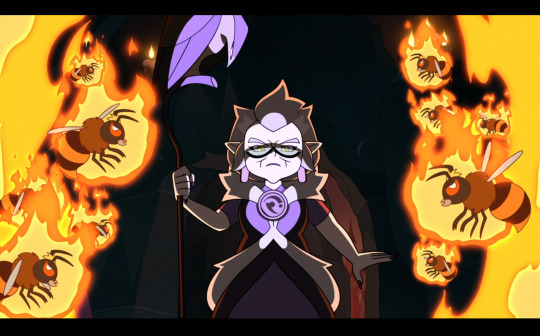
Second up, moderation. Gwendolyn's fierce loyalty to her family is both a good and bad thing. When she can't realise she is wrong, it becomes the bane of Eda's existence, but when she clocks on to her mistakes, it saves everyone.
Also, her fierce loyalty drives that change, in a weird way. Gwendolyn's priority is her family, first and foremost, all of the time. Even through it all, her pride is secondary to that loyalty.

"You know, right after Eda was cursed I joined the Beast Keeper Coven. I thought they surely would know what to do. But the beast keepers told me the curse couldn't be tamed. And the healers told me it couldn't be healed. Eda told me she found something that made it manageable at least. But I didn't listen."
Someone on the animation team really likes fire, because the animation from the moment Gwendolyn snaps is gorgeous and terrifying.
But the monologue itself is that moment of realisation, and Gwendolyn isn't too arrogant as to not know when she is at fault. Everyone told her she was wrong, and she did it anyway, and it hurt her family.
There is also something to be said about the direction of this scene, and how cool it is. That coolness has an effect, although its entirely based on vibes. It's memorable, and that's vital. "I didn't listen, and it cost me."

Also in this tiny scene, Wartlop is preying on Gwendolyn's insecurities and shortcomings as a mother. He offers her an easy way out and a clear solution to her problems, but that is a lie. It isn't easy, it isn't clear, and it doesn't work. Gwendolyn's monologue and fancy magic stuff is the confrontation of her desire for simplicity.
The monologue continues, though.
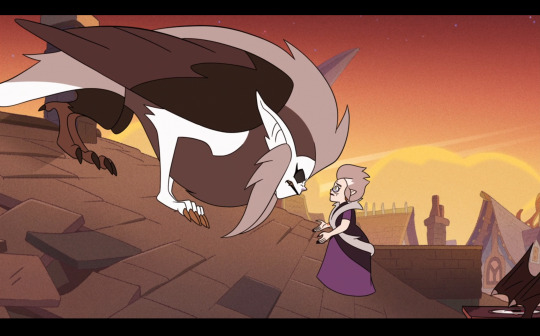
"My beautiful daughter's I failed you.
Edalyn, you're in there, aren't you?
I should have listened to you. I know now why you pushed me away. I made you think that your curse was something to be ashamed of. Whether we want it or not, it's part of you. And I love every part of you.
I'm so sorry."
Realising you are wrong only works if you act on it, and people can see it. If Gwendolyn had intimidated Wartlop and then watched from the sidelines as Luz saved Eda and Lilith, that wouldn't have made any difference. But she chose to step in.
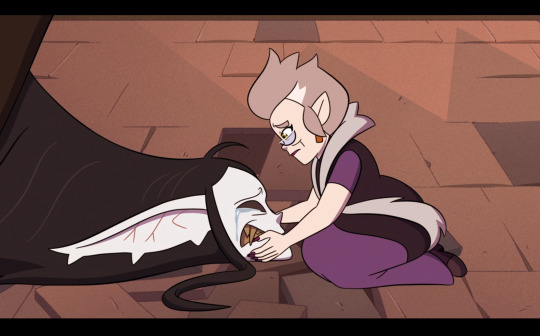
"And Lilith. You were always so self-sufficient. But, I didn't give you the attention you deserved."
Bear with me, I need to clarify some biases.
I think that Lilith was handled really well in parts of this episode, but not all of it. There are definitely parts of this episode, in my opinion, where Lilith's storyline could have been better. However, this isn't a series about what I liked and didn't like, its about what the series gave us, and what that says, so I will try to focus on the analysis until the end. I'm just being clear about some mitigating factors here.

With that being said, Lilith is the reason for Gwendolyn's self reflection. She is a side effect of her mother's tunnel vision, and the fact that Gwendolyn missed it is uncomfortable for her to realise. Lilith's transformation is the moment Gwendolyn realises exactly what she has sacrificed to get nowhere, and her maternal mind kicks in to scream at her that this was in no way worth it.
But the owl beast transformation isn't the only thing that Gwendolyn has inflicted upon her daughter.
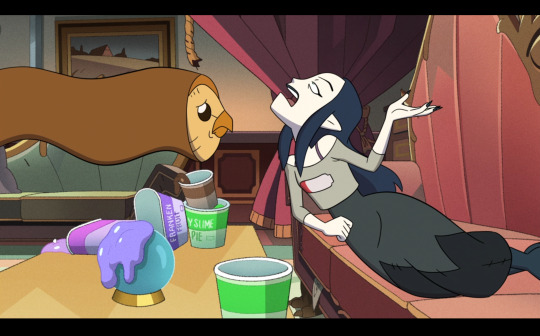
The couch scene is half comedic, half very much not comedic. Lilith has zero coping mechanisms for stress. She has only just reconnected with her sister after a long time, and her mother, judging by what this episode has said, has provided next to no support for Lilith in her growing up after Eda's curse took hold. So, she gets drunk on icecream.
"Are you my mother? Because that is an aweful lot of judgement."
Holy moly. I know she's intoxicated and not thinking straight, but that is a hell of a thing to bubble to the surface. It could be one of two things, either Lilith has never emotionally developed past her teenage years and so she has the brittle and exaggerated worldview still heavily in effect; or she has matured, but she still associated Gwendolyn with unfair judgement more than anything else. Neither of which are particularly healthy mindsets, and I would hold Gwendolyn to blame for both.
Again, the phoenix and the restarting of the relationship is important symbolism that needs to be properly understood.
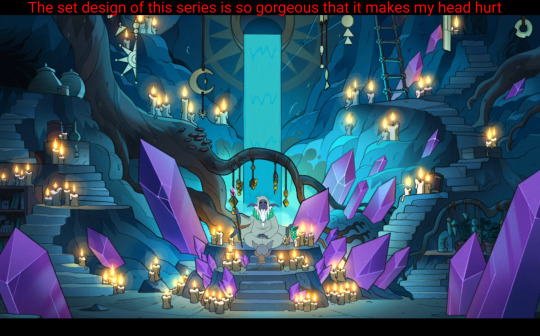
So, what has Eda learned from her mother? Always have your children's best interests at heart. Don't succumb to tunnel vision if things get tough. It's ok to be imperfect, as long as you recognise your failings and try to act on them. If something doesn't work, adapt and try a different way.
Oh, and don't give people your money in exchange for miracle cures.
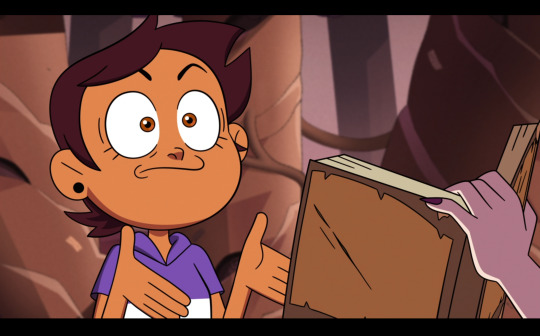
Final Thoughts
This episode is complicated for me. I have stated my bias already, but other than the Lilith stuff (leaving the story like Poochie wasn't my favourite writing decision), I think that the episode was pretty good. The animation abruptly decides to stop holding back halfway through the episode, and Deb Doetzer's acting is brilliant.
Speaking of animation popping off, next week, I will be looking at Through The Looking Glass Ruins. Specifically, I want to look at self image and relationships with others and how Gus, Amity, and Luz explore that concept. So stick around if that interests you.
Previous - Next
#rants#literary analysis#literature analysis#character analysis#what's so special about...?#the owl house#toh#the owl house gwendoline#the owl house clawthorns#clawthorns#gwendolyn clawthorne
10 notes
·
View notes
Text
Spiraling Upwards (The Price Of Power)
Repetition is the bread and butter of She-Ra and the Princesses of Power. The series is about cycles of abuse and trauma, and the tragedy inherent in that. It's about breaking out of those rythms, and to do that, it needs to establish what is holding its characters back.
But, showing the same thing over and over again is boring. It's stale, and overplayed, and stale, and overplayed, and stale. See what I mean?
Season three of the series shakes things up. It is a masterclass in twisting a formula to its breaking point, and that starts with The Price Of Power.
Let me explain.
SPOILERS AHEAD: (She Ra and the Princesses of Power)
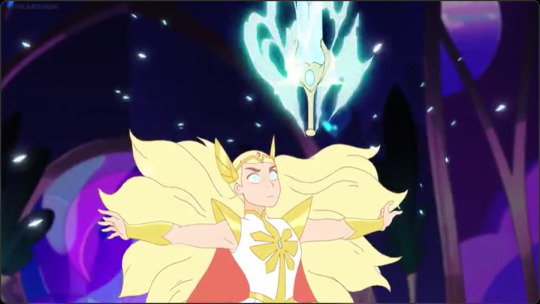
The title of this episode has so many meanings that it's impressive. The price of power is what it says on the tin, but it could relate to almost any character in this.
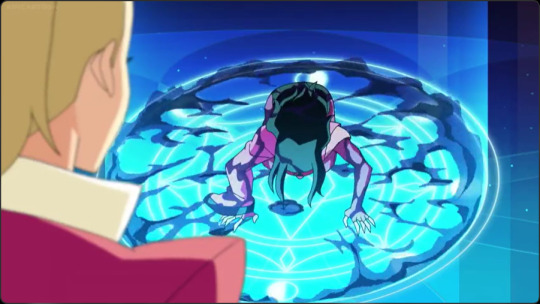
Shadow Weaver finally has her villainy catching up to her (side note, the animation of SW's magic side effect, which I will be referring to as "death juice", is stellar), and it is sapping her life. Catra is realising that her security wasn't as solid as she thought. Adora is making a Faustian bargain with her abuser. Even Angella is weighing up decisions about her family and her kingdom.
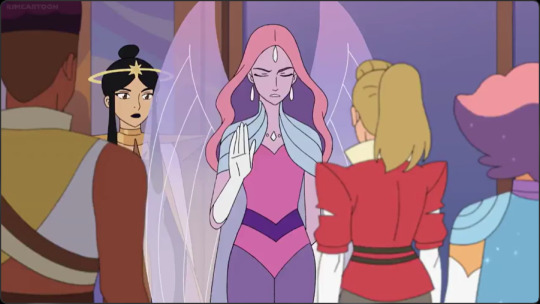
Angella's compete lack of willingness to let Adora near the source of her trauma sets her up as an actual maternal figure for Adora, rather than the simple source of authority that she has been up until this point. Remember this, it will come up later on in the season.
That reframes the conflict between Angella and Shadow Weaver's conflict, turning it into mother vs mother, and their ideologies come into conflict. Altruism vs selfishness. And, with that in mind, I'd like to do a shot breakdown of that scene.
The principle I will be using here is screen presence. Typically (I am using the word "typically" here because this isn't a rule, its a generalisation. There are exceptions), the person who takes up the most of the screen has the most control in the scene. This stems from a few places, but mostly it's just that humans are hardwired to associate "big" with "powerful", so the person who is the largest in your perspective has the most power.

Stable, wide shot. Nothing is really happening yet, Shadow Weaver is learning her surroundings and how trapped she is. She is small, and crouched, and boxed in by that barrier and forcefield. Simple stuff.
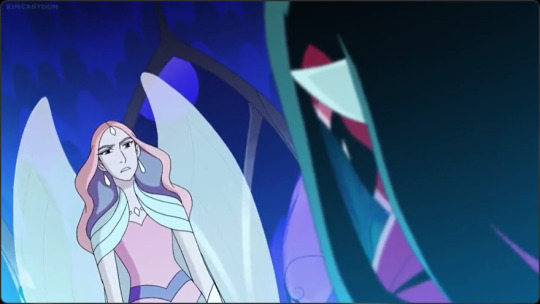
This shot is diagonal, bending backwards so that the audience can look over Shadow Weaver's shoulder at Angella. The two are roughly equal in screen presence, so the angle sells the power dynamic, mostly. It is a bit up in the air at this point, the audience isn't sure which way this interaction will go.

"This is a prison?"
"Why does everyone keep...? Of course this is a prison."
Look who's the largest now. Shadow Weaver looks down on Angella, as she finds a crack in her psyche, and the queen reacts predictably. Now Shadow Weaver has a weakness she can exploit, and she takes control.

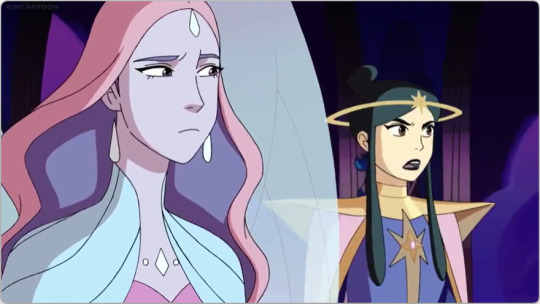
We are closer to Shadow Weaver than either Angella or Castaspella, reflecting the immediate change in dynamic. Now Angella and her sister-in-law vie with each other for control, disorganised against a monolithic force.

These two are powerless against her. She frames them in the smallest possible space, her very presence confining them and removing their agency.
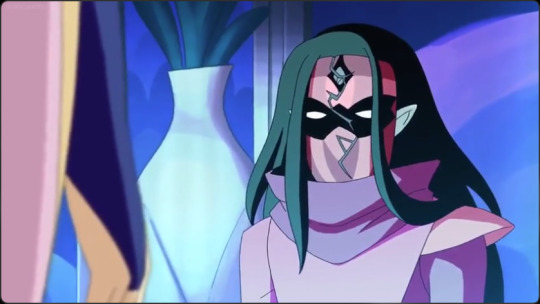
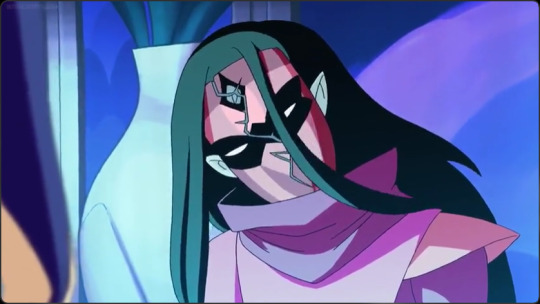
This should be Castaspella taking control. She accuses Shadow Weaver of something concrete, but Shadow Weaver takes that away. The camera draws in, removing Castaspella from the frame, literally siphoning off her control of the scene.
This scene wasn't the point of this post, but I felt it needed a little more time, as it shows just who Shadow Weaver is. She is a parasite, who feeds on other people's trauma and wounds. She leads with the fact that she has hurt this woman's daughter, then plays on her deceased brother, then turns that same blade into Castaspella.
It is also worth noting that this is Shadow Weaver at her worst. She has been given a chance to try something new, to gain empathy and healing from people who would probably give it to her if she was honest with them. But Shadow Weaver is two things: cruel, and ambitious. She is awful to the people she needs, in order to get to the person she wants.

That person is Adora, of course. This season shakes things up by changing the trajectory of the arcs. Instead of Catra falling further and further, with Adora managing to climb out of her own trauma, it's the reverse. At least until the end.
So, Adora begins in a good place, and Catra begins at rock bottom. Adora has a support network, and feels in control of her own life, but Catra wakes up in a jail cell, reliving her recent punishment at the hands of Hordack.
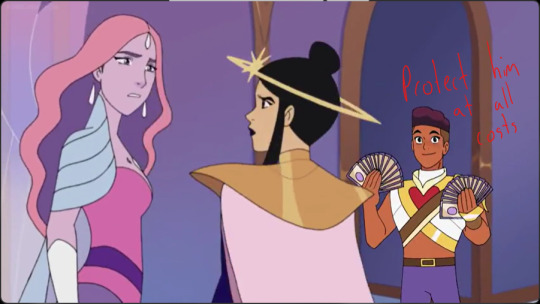
This is also the season in which ideologies get challenged most overtly. Starting with Glimmer and Bow.
Bow believes that good people do good things and bad people do bad things. Which is a neat sentiment and I kind of agree. The problem, is that he has associated "bad people" with "the horde", and has rationalised Adora as different because of She-Ra. To his credit, when he is confronted about this, he rethinks things. Bow is a simple character, and he needs to be to contrast with the rest of the cast.
Glimmer has that black and pink morality that I mentioned in my post on Rolling With It. She believes in a very distinct idea of good and evil that doesn't really match up with the rest of the series. She skirts the edge of being an anti-hero at times, which is a phenomenal choice for a story about war. Most obviously:

"Listen up, lady. After all your kidnapping and mind-wiping, I am just looking for a reason to serve up a little payback. So, if you do anything to hurt Adora..."
So, at this point, Glimmer thinks Shadow Weaver is working for the Horde, which would make her a prisoner of war. I'll let you decide what this means.
Adora believes in redemption, and this is where things get funky, because Adora has done the same thing as her friends. She has associated morality with allegiance, and this is a false positive, mostly.
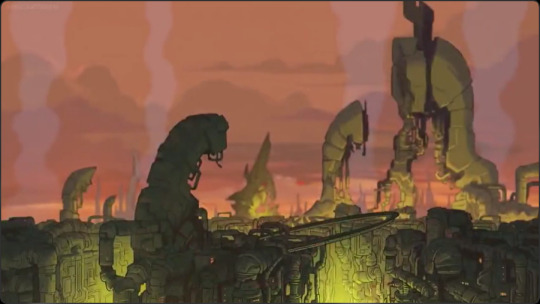
I want to stress that the Horde destroys environments, levels settlements, and definitely kills civilians off camera, amongst other things. I am adamantly not trying to both-sides this conflict and I don't want any of that nonsense in the replies to my posts. What I am saying is that switching sides without changing behaviours doesn't immediately make someone a good person.
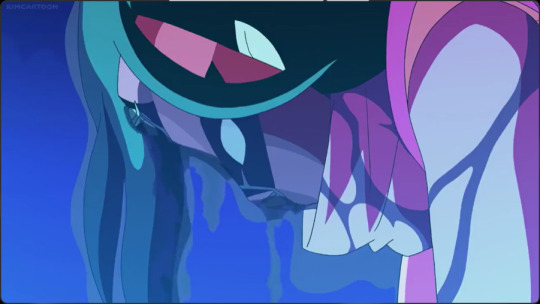
Shadow Weaver switches sides to the princess allegiance, but then routinely pressures the protagonists to corrupt themselves and actively get themselves killed. Shadow Weaver does not get redeemed, she gets a sea change.
It is also notable off hand that Adora thinks she has switched side, therefore her own redemption is finished and she has fully healed. But Shadow Weaver still moves her like a puppet on a string.

That is core to Adora's arc in this season and the series, the idea of personal agency vs the influence of others. Adora received a similar change in circumstances when she discovered she was She-Ra, so she thinks that Shadow Weaver will change as well.
What Adora is missing is the balance. Yes, her circumstances helped her, but she made a choice to be better. She was given the information about the Horde's evil, and made an informed decision to become a hero. Later on in the series, this will come up again with the Old Ones and their weapon, and again, Adora will make a decision to do what is right, not what her side thinks.
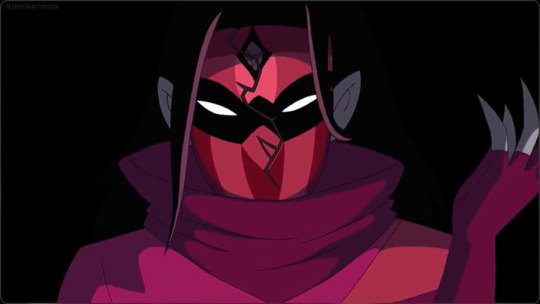
This is, however, more complicated, because the question of redemption is more complicated than a Tumblr post can properly address. I can try, but I recommend literally any philosopher ever to philosophise. So here goes my attempt.
Anyone can be redeemed, but "can" is the operative word there, not "will". Redemption is an informed choice to be better, and in my most humble of opinion, the truly evil people are the ones who refuse it. I think that She-Ra as a whole agrees with this premise.
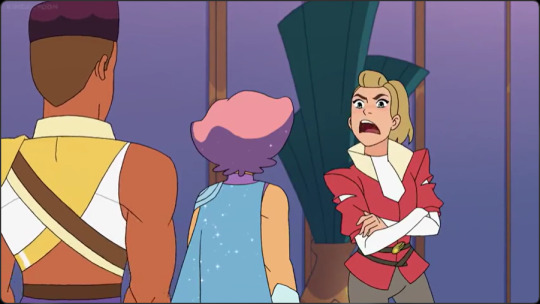
This episode sets up a ton of thematic ideas in direct opposition to each other, telegraphing to the audience that the season will go into these in detail, but also that the season will be about dissecting preconceptions.
Most notably, the third season of She-Ra will discuss Adora's idea of redemption becoming more nuanced, as Shadow Weaver actively disproves her premise, and she has to rethink things.
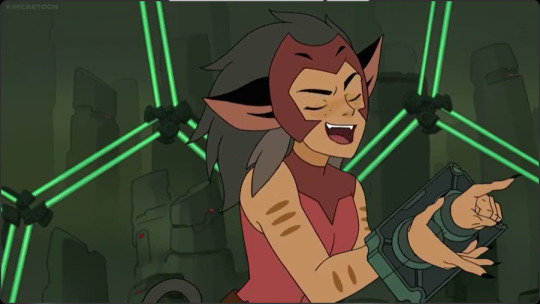
Which brings me to Catra, who is on the receiving end of all of these themes in quick succession throughout the season. For the moment, however, she is confronted with two. Connection, and preconception. Catra wakes up from a nightmare, in a cell. She believes that having friends will only cause her irreparable pain, and as a person who craves safety and emotional security, that isn't a risk worth taking.
Then Scorpia and Entrapta actively try to rescue her from death and succeed. It is imperative to understand that this catches Catra by surprise. She is used to that conditional acceptance that was Shadow Weaver's style, and has internalised Adora's departure to match those behaviours. Hordack hasn't helped.
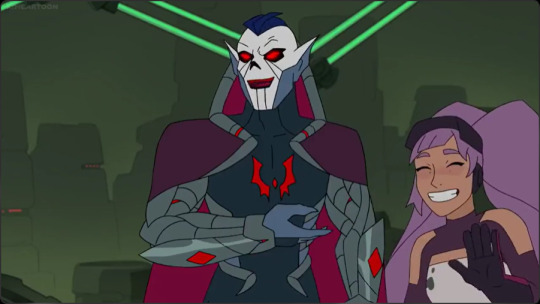
But here she is, at her lowest so far, and Scorpia and Entrapta stick their necks out for her, and it pays off. This is the power of friendship crystalised in its most pure and realistic form.
Season three centres around Catra almost achieving her own healing, and she does it on her own terms, accompanied by Scorpia, the embodiment of unconditional kindness. In essence, her spiral downwards has been reversed.

Redemption is weaved throughout Catra's entire journey, and while it isn't explicit in this episode, it is still an important element to bring up, because Catra is an explicit link to Shadow Weaver here, as well as Adora.
Shadow Weaver is given the chance for redemption, and intentionally refuses it. Catra is being given a similar opportunity to get away from the place that is directly causing her villainy, and improves, mostly.
It doesn't succeed, though, does it? Neither spiral completes. Catra almost heals, but comes crashing down, and Adora nearly succumbs to nihilism, but manages to claw her way out at the last moment. They try to break the mould and fail, but they rupture the neatness of this tragedy in the act, and if it can be torn, it can be broken.

FINAL THOUGHTS
Ok, here we go. Season three is my favourite season of She-Ra, so this is going to be a fun set of posts to make, because I have a lot of things to say.
This season fully eschews simplicity and revolves around having as many moving parts as possible. Everyone gets an arc, everyone gets a different thing that they are dealing with. Some stories don't even collide directly, but have massive impacts on each other.
This season shows that the story can be subverted while characters try and fail to do so. It's possible, but they can't do it without each other.
There's a storm coming, there's nuance in the air, and the winds are starting to change.
Next week, I will be looking at Huntara. The episode, not the person. I mean, kind of the person, but in an analytical sense. That got weird. Stick around for more analysis of this series if that interests you.
Previous - Next
#rants#literary analysis#literature analysis#character analysis#what's so special about...?#she ra and the princesses of power#spop#spop glimmer#spop adora#spop catra#spop bow#spop shadow weaver#spop angella#she ra#adora#catra#she ra catra#she ra adora#she ra bow#she ra glimmer#she ra angella#she ra shadow weaver#she ra princess of power#she ra spop#protect bow at all costs#the man walks up to a mage and tries a card trick that he isn't particularly good at. he is precious beyond all measure#theres also one shot in the entrapta hordack conversation where the lighting animation goes through the roof#but its just one shot and its onscreen for three seconds
24 notes
·
View notes
Text
The Wizard Is Wrong (Wonderful)
Across the story of Wicked, the audience has been introduced to characters with varying relationships to the concept of truth. From Elphaba’s unwavering honesty, to Glinda’s dissonant worldview, to the Wizard, who is an idiot and a liar.
I don’t think either of the observations about the Wizard are particularly groundbreaking. What I think is interesting, is how these two cancel each other out. As in, when the wizard tries to lie, he ends up saying things that are true. But this isn’t as obvious for most of the musical because the Wizard spends the entirety of it lying through his teeth.
But what happens when the Wizard tries to be honest? Well, then you get Wonderful.
Let me explain.
SPOILERS AHEAD: (Wicked)

The context around this song is that Oscar Zoroaster Phadrig Isaac Norman Henkle Emmannuel Ambroise Diggs (The Wizard) is trying to convince Elphaba to join him. He has tried deceit and bargaining, but Elphaba is clever, and has called his bluff. So now he is trying a different tactic, honesty. Unfortunately for him, that's not something he's good at.
“Then suddenly I'm here
Respected, worshipped, even
Just because the folks in Oz
Needed someone to believe in
Does it surprise you
I got hooked, and all too soon?
What can I say? I got carried away
And not just by balloon”
In other words, Oz was like this when I got here, I can’t possibly be to blame, right? And if we were to use his version of events, things are simple.
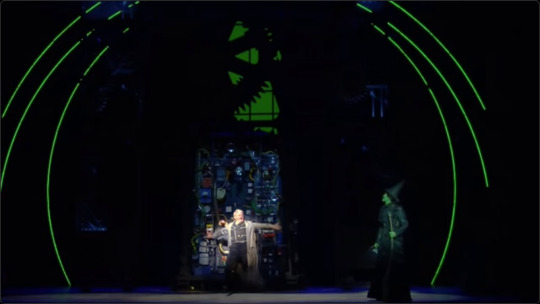
But as it happens, the audience has already been told that this is false. It isn’t an accident that Doctor Dillamond taught history, and that provides some more information. Diggs came to Oz after a drought, and people were looking for people to blame.
The Wizard then stepped into this world, and because he fell from the sky, he was handed everything on a platter. Essentially, Diggs is living a power fantasy.
But on an even more basic level, the people looked to the Wizard for help, and he used that need for personal gain and to oppress a specific group. Even from what he said, he is fully culpable for the current state of Oz, because he actively made the problem worse.

“So you lied to them”
“Elphaba, where I'm from
We believe all sorts of things that aren't true
We call it ‘history’”
This is… complicated. It’s a half-truth misremembered and twisted to fit Diggs’ beliefs. The real idea that this is inspired by is historical bias. By which I mean, if you are being pedantic, it is impossible to be 100% accurate about historical events. You can get really close, but because of biases and contexts that weren’t written down and fragmentary evidence, being entirely accurate is impossible.
There is a difference between “not having all the information”, and “believing a lie”.
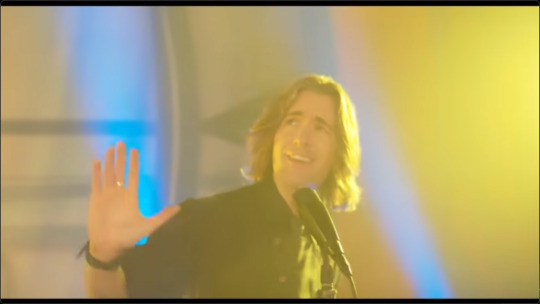
Voiceplay is an Accapella Band who gave their take on the musical as a whole that I highly recommend, and Geoff Castelucci's bass during Wonderful is really good.
The Wizard exists under the effects of a pretty strong Bandwagon Fallacy. Everyone else is doing it, so that makes it ok. But he’s wrong about everyone else, and he’s wrong about whether other people’s actions justify his. In that way, he is an equal opposite to Elphaba, who seeks to do the right thing despite nobody else wanting to make that choice, while Diggs uses those around him as an excuse.
"A man's called a traitor or liberator
A rich man's a thief or philanthropist
Is one a crusader or ruthless invader?
It's all in which label is able to persist"
This is, again, a misremembered half-truth. Because yes, historical bias does exist. There are historical figures who were less than perfect. But that doesn't mean reality changes to match modern biases.
Also, this doesn't actually answer the question he was asked. Diggs was told to justify his decision to become a cult of personality, and his answer was: "history is made of lies". Again, there is a difference between historians simplifying thigs and a person making up a persona for themself. But again, the Wizard suffers from a Bandwagon Fallacy, and so he thinks that this makes him right.
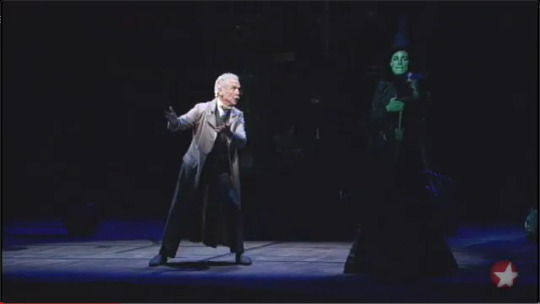
That there is the key, the Wizard is convinced that he is in the right here. But he isn't. The world doesn't work the way he thinks it does. So when he finally leads into his offering, it is already dubious.
"At long, long last receive your due long overdue
Elphaba, the most celebrated are the rehabilitated
There'll be such a whoop-de-doo
A celebration throughout Oz
That's all to do with you"
The Wizard is offering Elphaba what he thinks she wants, because it's what he wants; praise. The Wizard covets attention and is convinced that everyone else is the same, so Elphaba must want that same praise, right?
Not anymore. In The Wizard And I, this is explicitly one of the things Elphaba dreamed of, but now she has learned too much. Diggs is ok with Oz's flaws because they benefit him, Elphaba can't be.
I'm sure The Wizard believes that second bit, but I don't agree. Based just on Oz itself, in what parallel timeline will the people just accept Elphaba after the metric ton of trite that has been talked up about her. The Wizard thinks that prejudice will just go away if you conform, but that isn't how it works at all, and Elphaba knows it.
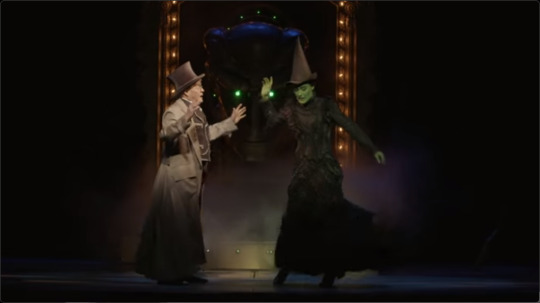
"If that's love, it comes at much too higher cost."
Different song, but it's a perfect putdown to the entirety of the Wizard's antics. He may believe what he is saying, but he is wrong. The acceptance he offers is fake and means that Elphaba must sacrifice everything she wants to achieve it. That isn't worth it.
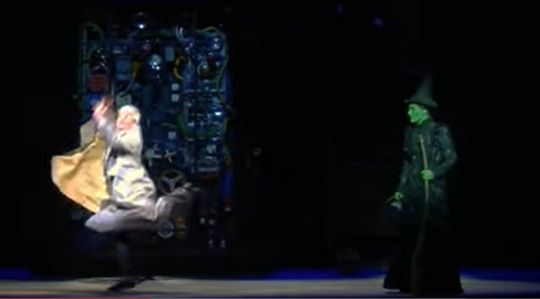
Final Thoughts
For all of his posturing, the Wizard is a remarkably simple character. He wants power, and he lies to get it. But if you combine that with his utterly scuffed worldview, you get some really interesting side effects.
He is also narcissistic, which doesn't exactly help his position. The world has bent over backwards to service his needs, and he has never truly known hardship. He is the stereotypical Iseki protagonist that gives the rest of the genre a bad name, the true Mary Sue.
The problem is, he's also bloody charismatic and fun to watch, which means people listen to him. I've heard people in real life agreeing with his line about labels, and it drives me up the wall.
Next week, I will be looking at the reprise of I'm not that girl, and Glinda's self reflection, as well as As Long As You're Mine. So, stick around if that interests you.
Previous - Next
#rants#literary analysis#literature analysis#character analysis#what's so special about...?#wicked wizard of oz#wicked#wicked the musical#Oscar Zoroaster Phadrig Isaac Norman Henkle Emmannuel Ambroise Diggs#wicked is a queer story
9 notes
·
View notes
Text
A Throne Of Ash And Dust (Echoes Of The Past)
How do you characterise a joke character?
Perhaps they have specific idiosyncrasies that drive them to making silly decisions. Maybe they have repeated blindspots that cause them to take the complicated rout when the simple would have been safer.
My favourite way is this: The character repeatedly cold guesses plot beats of the story, and nobody, not even the character, realises the significance of this. TV Tropes calls this the "Joke and Recieve", and it is almost entirely built on dramatic irony.
But dramatic irony isn't always funny. It's a tool that can be used to create some truly agonising stories, including Echoes Of The Past.
Let me explain.
SPOILERS AHEAD: (The Owl House, One Piece: Enies Lobby, Romeo And Juliet, Four Weddings and a Funeral)
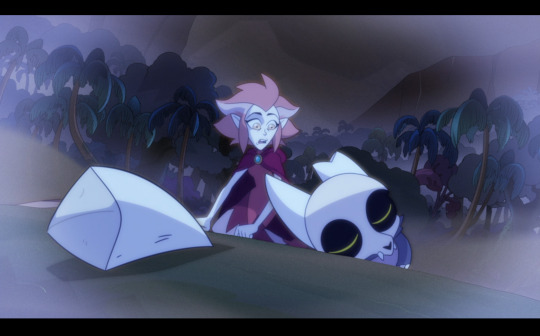
Throughout season one of The Owl House, King was written as the comedic side character. This is partly why I rarely mentioned him in these posts, his antics were usually thematically relevant, but not the main event of an episode, and there is little I can analyse from well made jokes.
But comedy is difficult to write, and even more difficult to act. So, when comedians get to act dramatically, they usually make that part of the job look easy. Essentially, Alex Hirsch is really good at his job, and to prove that, I'm going to dive straight in and talk about the revelation scene.
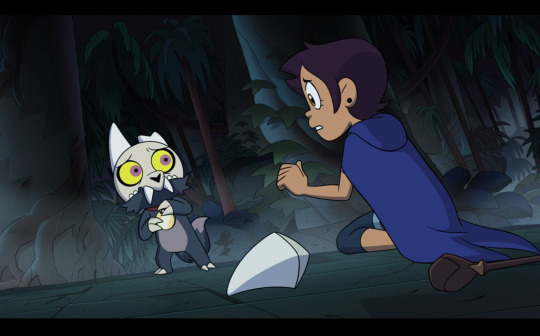
"You're all just making fun of me, like usual, right?"
This line read is phenomenal. You don't have to understand the words he is saying to understand the inner turmoil that this character is experiencing, and the hyperventilating is a genius touch.
The framing of King in this shot is fascinating. Luz is knelt down like she is reaching for a scared child, or a wild animal. Fitting for addressing a character who's entire sense of self has just been eviscerated. King meanwhile is small and frail, with his arms and tail squeezed in to make his silhouette tiny within the frame.
Meanwhile, a Dutch Angle of the shot (the horizon line is slanted) gives an unsteady vibe the scene, while simultaneously cramping Luz in to make her look bigger by comparison and doing the reverse with King to continue his isolation.
Between them, in the foreground, there is the broken piece of his horn, pulling double duty for two different themes. First, it separates King from Luz. Second, it highlights the injury that King's psyche has just suffered.

Finally, King is clinging to his self image. He is desperate to believe that he is both a king and a little guy. He is the underdog who people make fun of, but who is right in the end. But he can't believe that anymore.
The foundation of King's character and comedy was that he was either right and everyone else's misunderstanding produced the dramatic irony that makes it funny, or he was delusional, and the irony was instead derived from that.
In this season, we get two revelations about this dichotomy, and the first is the gut punch. King abruptly realises that he has been wrong all this time, and that hurts him, and by proxy, it hurts the audience.
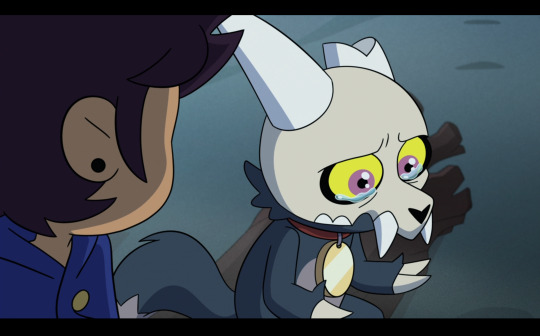
How do you characterize a tragic character?
Perhaps they have specific idiosyncrasies that drive them to making silly decisions. Maybe they have repeated blindspots that cause them to take the complicated rout when the simple would have been safer.
My favourite way is this: The character repeatedly cold guesses plot beats of the story, and nobody, not even the character, realises the significance of this.
If you don't understand my point here, please go and read the introduction of this post again.
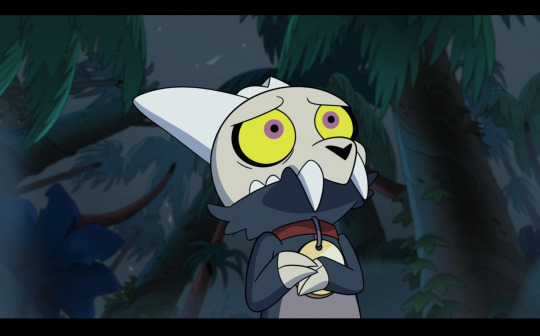
The line between comedy and tragedy is razor thin. If a character is funny, their idiosyncrasies are called comedic traits, or blindspots, or jokes. If a character isn't funny, those same traits become tragic flaws, hamartia, and foreshadowing for their doom.
Both types of story work in similar ways, they feature a long build up, and then a turning point in which every plot thread comes crashing down in either a display of humour, or an agonising train wreck. Often it is difficult to know what you are watching until that peripetia (the punchline) hits.

Case and point, Romeo and Juliet is a romantic comedy until Act Three. Romeo is an idiot who makes ridiculously stupid decisions in the first moments of the play, something that is called out in story. He is a starstruck lover who can't bring himself to look at the world around him, leading to him meeting Juliet and marrying her in quick succession, which causes antics. He's the type of character who Hugh Grant was born to play.
But then that same impulsivity causes him to get Mercutio killed, and kill Tybalt, Paris, and then himself. All of the tragic events of the story could have been avoided if Romeo had thought with his head and not his... I'm not going to finish that sentence.
This isn't a bug in the story at all, its the entire point. The idea of a tragedy is that the flaws cause the story. Those folks who complain into the ether about why characters making illogical discissions is a plot hole are, in my most humble of opinions, wrong about how stories work.

I don't believe in genre.
Well, that's not entirely true. A more nuanced explanation would be that I don't believe writing for a specific genre is worth it. Genre is a means of categorisation, for agents and libraries to arbitrarily seperate stories to allow for ease of access.
A genre exists so that a reader who likes specific stories can better explain what they are looking for. Instead of saying "I like books with the falling in love stuff and the will they won't they drama", a person can say "I like romance books" and leave it at that. Ease of access at the behest of accuracy.
But at what point does a romcom become just a regular romance story? How many explosions are needed to make something into a thriller?
My point is that trying to write within a specific genre isn't worth the struggle, and some of the best stories out there bend genre conventions entirely.

I mentioned Hugh Grant, though, and that's not just for the obvious reason. Four Weddings and a Funeral, a film that Grant starred in in 1994, makes my point for me.
Four Weddings and a Funeral is a comedy (kinda) about a collective of friends going to a series of weddings and seeing people they really don't want to see. They talk about how none of them have found their own love in the end, and comedy is derived from the obliviousness of Charles (Hugh Grant's character), and the over extroverted nature of Gareth (Played by Simon Callow).
Unfortunately, when Gareth's antics cause him overextend himself and he suffers a heart attack, that obliviousness turns tragic as Charles finally realises the true nature of the relationship Gareth had with Mathew (Played by John Hannah).
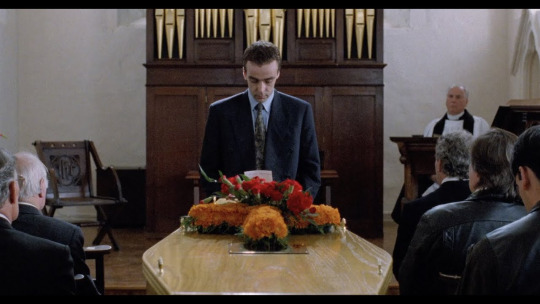
"Yes, it's odd, isn't it? All these years we've been single and proud of it and never noticed that two of us were, in effect, married all this time."
But then the film pivots back into being funny with the final wedding, which goes about as chaotically as the rest of the film. It's a story about enjoying the moment you are in and taking what life gives you with the understanding that it won't last forever. One of the film's theses is that something being short lived makes it more precious, and having elements of both tragedy and comedy in there really heightens that message.
As a side note, if you haven't seen this film, please do. There is a reason that Stop All The Clocks is so iconic, and it is this film. Please watch it, it's good.
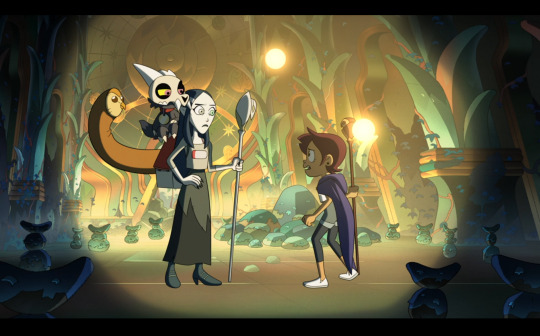
King's arc had me worried when I first heard about it. I was late to The Owl House, starting watching when season two was already out. And so, the friends that I had who had already seen the series spoke really highly of "what the show does with King".
The problem came from my preconceptions. In my experience, when a piece of media tries to do something with a comedic character to give them more plot significance, that character gets murked about halfway through the process. I have seen this happen enough times for it to get stale.
But, you will notice, they don't do this with King. Instead, they give him context, and they reframe his character. All they do is make him matter.
That there is the key to how to make a comedic character heartfelt. All you have to do is take them seriously, and you can keep the comedy while fully embracing the emotional depth of the story.
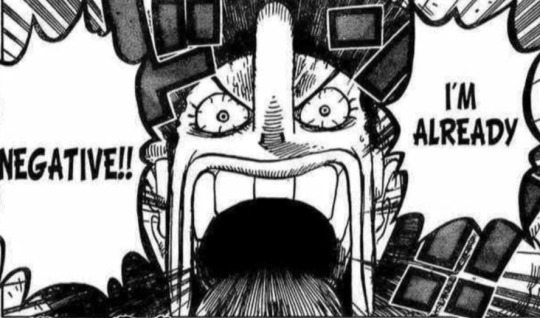
In One Piece, Usopp is easily one of the most human of the main characters. He isn't a great swordsman or a devil fruit wielder, he's human, and he knows it.
Usopp is also the single most insecure character in the entire cast, and that is what I want to link to King, because the way in which Usopp is given depth is really interesting. At all times, he is taken fully seriously.
Usopp's comedy comes from a place of fear. He is a liar who specialises in the Joke and Recieve style of storytelling to the point where it has become a running meme in the One Piece fanbase. But that was rarely explored until Enies' Lobby, when the straw hat's ship was wrecked and going to be left behind.
Suddenly, all of those jokes, all of those incongruities, find a reason. Usopp is afraid of everything but is most afraid of being left behind, something that I am willing to bet money will come up again when the Straw Hats finally meet back up with the Red Hair Pirates.
Context.

King gets this too, his comedy comes from a place of ambition, and a genuine belief in his own past. This episode rips that out from underneath him, and so he needs to redefine himself in relation to the world around him, and so his comedy needs to rebuild itself too.
From the moment the characters set foot on the island, this episode takes itself entirely seriously. There is no laughing at characters, no wasted space at all. This episode knows what it is doing.
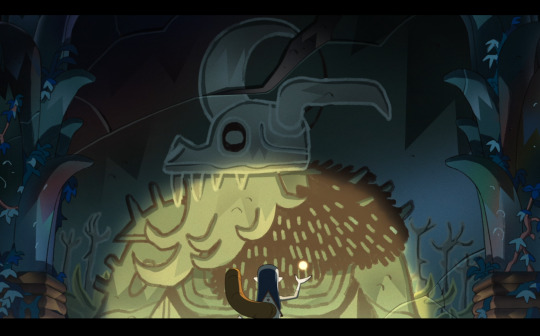
This episodes' use of light is phenomenal as well. Light illuminates, and combined with the motif of an obscuring fog, the thematic of revealed secrets could not be more obvious. They also, however, create a style that reminds me of the luminism of baroque paintings, which leans into the historical nature of this episode.
You will notice in later episodes that King makes fewer jokes than usual, and that difference is part of the emotional core of this season.
Now that I think about it, this season of The Owl House has a lot of characters trying to redefine themselves. Eda with her lack of powers, Lilith with her new allegiances, The Golden Guard with his storyline, and King.
We will see how that goes.
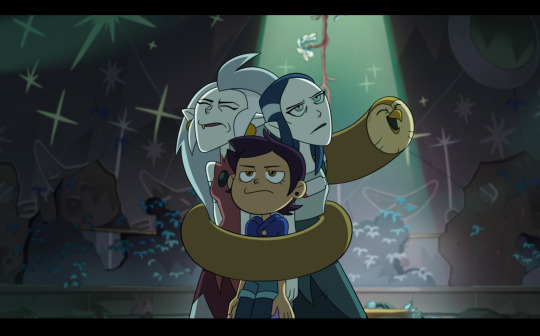
Final Thoughts
I am finally getting back into the swing of things with these posts. I took a break to go to a family wedding overseas, and then got back and had a few mental health complications. But I'm all better now, and ready to go.
King's story is a key part of season two of The Owl House, and this episode is pretty much the reason for him being a fan favourite character. Up until now he was funny, but with a hint of quirkiness. But from now on, this is a fully dramatic role, and Alex Hirsch nails it completely.
Also, I have to get this out of my system because I am way too proud of this joke. The title of this post is a reference to a generic book title (a _ of _ and _), as well as a song by Imagine Dragons, because King is the King of Demons. Admittedly, its a reference to Radioactive, but it still counts, right?
Next week, I will be taking a look at Keeping Up Afearances, an episode that I have mixed feelings about. So, stick around if that interests you.
Previous - Next
#rants#literary analysis#literature analysis#character analysis#what's so special about...?#the owl house#toh#the owl house king#toh king#one piece#one piece usopp#four weddings and a funeral
9 notes
·
View notes
Text
Inciting Incident (Thank Goodness)
One of the most popular songs in Wicked is sung by Galinda, and centres around the idea that the society she lives in is corrupt and that she is the only one who knows how it really works. But is she right about that? Does she actually know as much as she thinks?
I think the answer is complicated, and that's the fun of it. I think that Glinda has intellectually grasped that the system is flawed, but I don't think she's emotionally wrapped her head around it. Case and point, the complete and utter cognitive dissonance that is Thank Goodness.
Let me explain.
SPOILERS AHEAD: (Wicked, The Trekkie's Tale)
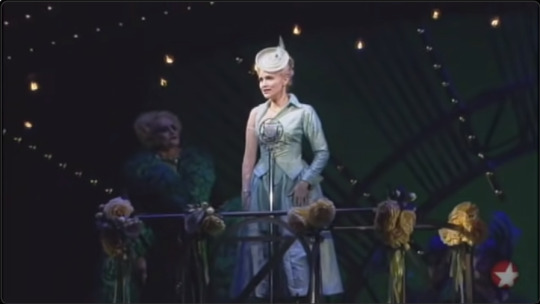
Thank Goodness is actually two songs. Thank Goodness itself, and a reprise of No-one Mourns The Wicked. So, it's a rehashing of the first act, opening with Glinda conversing with the crowd, the difference is whether or not she is appearing to agree with it.
In the first Glinda tries to argue for Elphaba's morality, and it frames the entire story. But now, Glinda stands idly by and goes along with all that the chorus says while they get more and more worked up by lies that she knows to be untrue.
You would think that the two segments of the song being in agreement would mean that they go well together, but they really don't. Thank Goodness and No-one Mourns The Wicked do not fit with each other at all, in my opinion.
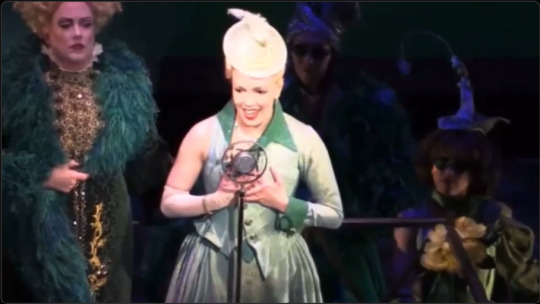
So, what does this mean?
I think that this song shows Glinda lying to herself, and finally starting to crack and realise what is happening.
Glinda spends this song deflecting from the problem, instead of confronting it head on. She relies on popularity and giving the people what they want to distract them.
My ex-girlfriend is being hunted by the masses for something she didn't do, but look over here, I'm getting married!
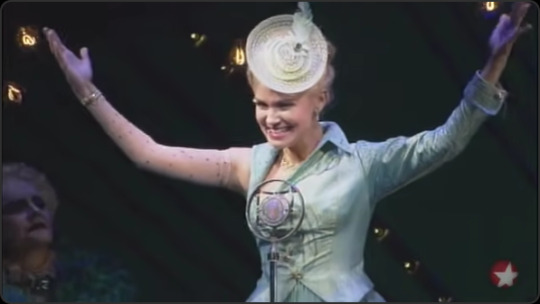
"Like some terrible green blizzard
Throughout the land she flies
Defaming our poor Wizard
With her calumnies and lies!"
The obvious thing here is the tense. This is happening now, as opposed to something the characters have lived through and made it out the other side of. It is more immediate.
But the other thing that I want to point out is the wall that the Ozians are putting up. The reason Elphaba can't get through to anyone is because they think she is lying, because who are you more likely to believe, someone who you trust implicitly, or someone who everyone around you says is dangerous?
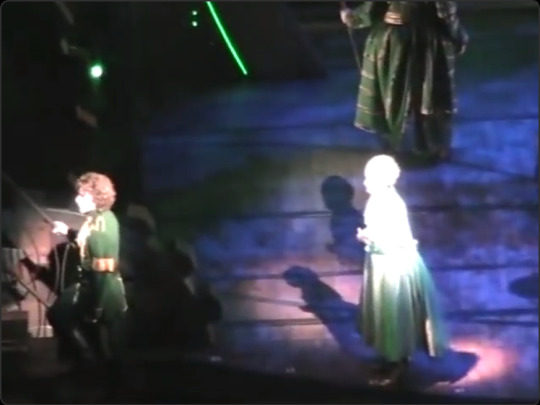
The song is broken into four sections. The introduction, Glinda's two reflections, and Madame Morrible's story, which prompts her to change her mind a bit.
"When you bowed before his throne
He decreed you'd hence be known
As Glinda the Good, officially!"
The following is an excerpt from The Trekkie's Tale, a Star Trek fanfic first published in 1974.
"Gee, golly, gosh, gloriosky," thought Mary Sue as she stepped on the bridge of the Enterprise. "Here I am, the youngest lieutenant in the fleet - only fifteen and a half years old." Captain Kirk came up to her...
"Here, take over the ship for a minute while I go get some coffee for us."
This is the archetypal Mary Sue story, a format where the protagonist gets all that they want and more. The world revolves around Mary Sue, and as a result, it isn't particularly compelling. She wins everything, then she saves the day and dies, and everyone mourns her.
Nobody online seems to be able to agree on whether this story was a satire of general fanfiction trends or not, a fact that I find rather funny.
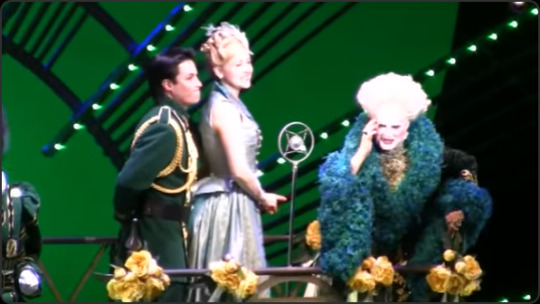
But compare that to the story Madame Morrible is telling about Glinda. Allegedly, the wizard gave her the title for... not much actually. In Morrible's version of events, good people get things just because, and nobody is asking any questions.
Essentially, Glinda is getting all that she wants on a silver platter, with no questions asked, no strings attached. Well, one string attached.
"Then with a jealous squeal
The Wicked Witch burst from concealment
Where she had been lurking, surrpetitially!"
I mentioned in my post on Defying Gravity (maybe go check that one out) that the central conflict that ended Elphaba and Glinda's relationship was that Elphaba was prepared to sacrifice everything, and Glinda wasn't. But Glinda did have to give up something to achieve her dream, and I don't think she quite understood that until now. To get the power she craved, Glinda had to lose Elphaba.
This song is essentially bludgeoning Glinda over the head with the fact that this tradeoff was not worth it.
That is the dissonance inherent to Glinda's entire character. She recognises the flaws in the world around her but has convinced herself that it will be worth it when she gets to power.
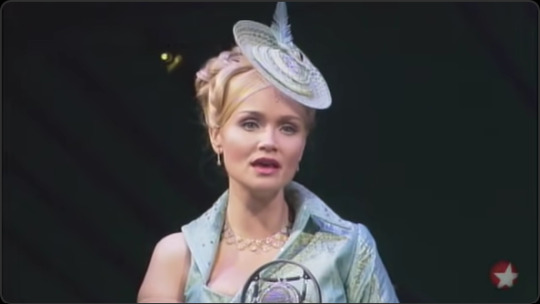
I don't think that Galinda would have realised this, and I am making a point of differentiating Glinda and Galinda. In my mind, Glinda is the version of this character who fell in love with and was changed by Elphaba. The two characters are incredibly similar, and one is an evolution of the other, but it is the influence of Elphaba that makes the difference.
Galinda was seeking power for the sake of it, a person who got her way because she couldn't understand anything else. But Elphaba changed that and gave her a purpose for seeking to climb the ladder. I think Glinda believed she could make a difference from within the structure of Oz, probably to help Elphaba.
Glinda has got everything she theoretically wanted, but at the behest of the reason she was doing it, and now that she is here, she can't even initiate the change she wanted to change. Glinda made the wrong choice, and is only now realising it.
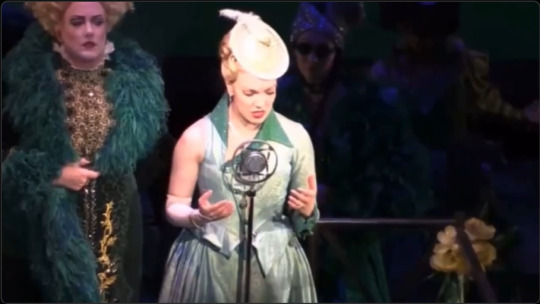
"We couldn't be happier
Right, dear?
Couldn't be happier
Right here
Look what we've got
A fairy-tale plot
Our very own happy ending."
If you are wondering why I've been leaving Glinda's monologues until the end, it is because they make my case for me, and make analysis rather difficult as a result. I have been saying over and over that this musical is about dreams and reality colliding, and that is explicitly stated in these verses.
The fact that there are two of these mirrors the two sides of Glinda's character. The first is the side that craves the attention and has got everything that she wants, then the song reminds her of Elphaba, and she tries again with a more nuanced perspective.
"Though it is, I admit
The tiniest bit
Unlike I anticipated
But I couldn't be happier
Simply couldn't be happier
Well - not simply
'Cause getting your dreams
It's strange, but it seems
A little, well, complicated"
This is literally what I've been saying. She's got what she wanted, but not in the way she wants. It's complicated, and that facade of hers is finally cracking.
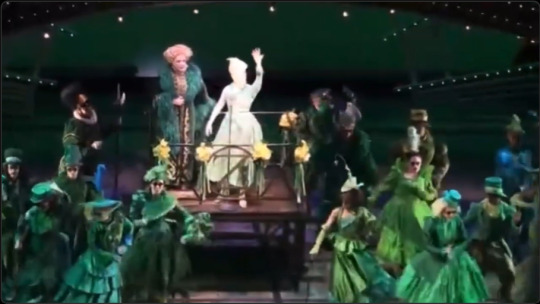
That duality is mirrored by the time signature, which is maddening. The song oscillates between a ton of different signatures, and if someone with more musical knowledge understands anything more about this than me, please give me a hand.

From my, admittedly limited, understanding, this feels like a lack of surety. Glinda doesn't know what she wants or thinks anymore, so she can't decide what she is singing.
It also gives an incredibly informal tone, as the lack of structure matches how a person speaks, almost. There have been two characters who have distinct speech patterns in this musical, Madam Morrible, and Glinda. The script of both of whom is written in recurring patterns and rhythms, making up words to match the metre of their sentence. It's pompous and pseudointellectual.
This is most obvious in how smooth the start of Defying Gravity is. There, Glinda doesn't have to change how she talks to match the song, because she is already speaking in the right rhythm.
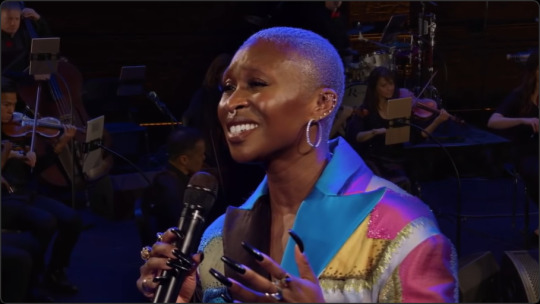
Cynthia Erivo's rendition of this song in PBS's Wicked In Concert is phenomenal and I highly recommend you check it out, not least of all because removing the crowd gives the song a completely different vibe.
But here, halfway through a song, she gives up with artfulness and just speaks her mind. It's still a song, so you still get the rhythms and melodies, but that is breaking down, and is gone in the script from this point forwards. That's partially why I say Glinda and Galinda are different people, they sound different to each other.
There are a few almost exceptions to this rule, and I say almost exceptions because they come really close to breaking the mould, but don't.

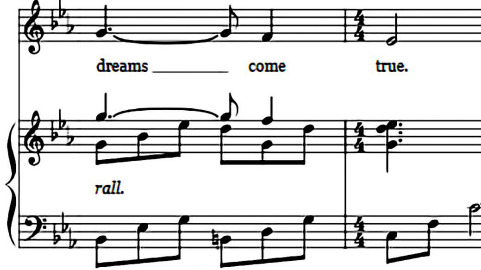
In this exception, Glinda is trying to convince herself that she is happy. The song is limited to one thought, the idea that Glinda should be happy, and there can't be anything wrong. She has got everything she wanted, and that would make her happy, right? Happy is what happens when all of your dreams... That's the word that throws her off, dreams.
This is no longer Glinda's dream.

This song is a microcosm of Glinda's entire arc in the musical. She follows the story laid out for her, but is changed by the journey until it no longer fits. She has changed, and now she can't do anything about it.
Ironically, Glinda has gained all the authority she could dream of, but she is more powerless and has less agency than she started with, and all of that happened without her notice.
"There's a kind of a sort of, cost
There's a couple of things get, lost
There are bridges you cross
You didn't know you crossed
Until you've crossed."

Final Thoughts
Genuinely, my favourite trope in a story is a character undergoing character development and not realising. For example, the "nobody's that heartless" line in The Emperor's New Groove.
But Glinda is my favourite example of this because of the way in which she reaches her conclusions. She is smart, possibly the most intelligent character in the entire musical, but her biases cause her to make some serious leaps of logic and ignore several things that would change her worldview until she runs headfirst into them.
Also, the stagecraft of this song is simple in order to not distract from Glinda's thoughts, but that means a lot of these photos are remarkably similar. I apologise for that.
Next week, I will be looking at Wonderful, and how it forms a neat little mirror of Sentimental Man, so stick around if that interests you.
Previous - Next
#rants#literary analysis#literature analysis#character analysis#what's so special about...?#glinda#glinda upland#wicked the musical#wicked musical#wicked#glinda the good witch#glinda wicked
37 notes
·
View notes
Text
Iconic (Defying Gravity)
If you look up "iconic Broadway songs", you get lists upon lists of musical numbers, but there are a few constants. Beside One Day More from Les Misérables, Don't Cry For Me Argentina from Evita, and Seasons Of Love from Rent, you will usually find Defying Gravity, from Wicked.
If you think about it, this is actually rather weird, right? The aforementioned songs are about preparing for death, dying, and looking back on life, respectively. Defying Gravity is about a witch deciding to fly. A story that is objectively fantastical (it depicts magic and flying monkeys in a place that definitely does not exist) stands next to stories of real-world history and events, and nobody bats an eyelid because... well... because it's just that good.
This is like a corgi winning a race fair and square against a ton of cheetahs.
I think it's worth examining just what Defying Gravity does to stand beside giants, and what story it is telling.
Let me explain.
SPOILERS AHEAD: (Wicked)
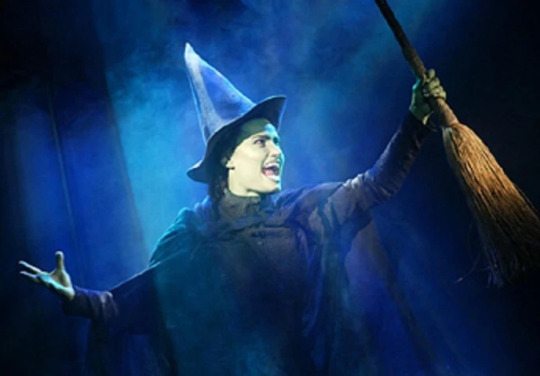
Defying Gravity is a battle cry.
When you examine a piece of media, the first thing you need to understand is what it is that that piece of media is trying to achieve. For example, if you examine a commercial for toothpaste through the same lens as a commercial film, that commercial will fall short. Similarly, if you examine a song that is trying to get stuck in your head through a classical, technical lens, things get funky.
You can, of course, apply those different lenses if you want. That's the fun thing about art, there are few rules. But even then, you need to understand the purpose of the text.
Defying Gravity is a battle cry.
It is a song that calls to arms its listeners. It says to Oz that things will get better, if Elphaba has to tear down the world to make it so. And it tells the audience to get excited, because someone has just started shaking things up.
The song is a turning point in the musical. It is the end of act one, and it sets the trajectory of the second half of the story. It defines how the characters will behave going forwards. But also...
Defying Gravity is a breakup song.
I don't think the two are disconnected at all. Wicked is about reality and dreams colliding, and it follows the seeking of freedom. The twist is that for freedom, you have to give up your safety, and Glinda isn't prepared to do that, but Elphaba is.
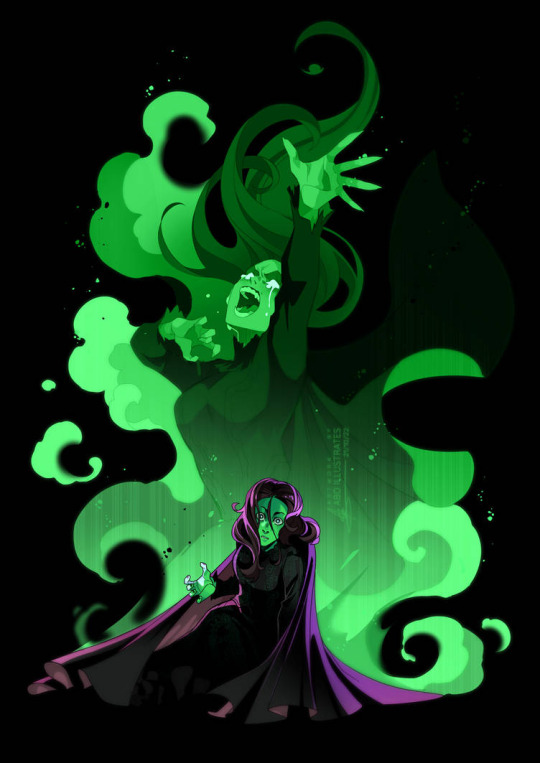
This is a piece by @abd-illustrates (Youtube, Deviantart). Although I believe it's technically about No Good Deed, I feel it's relevant here and a spectacular feat of artistic merit that I had to put it in.
Wicked has been accused of queer bating by fans, and while I see that angle, I don't quite agree. I think that the romantic relationship between Glinda and Elphaba does happen, but the fact that it doesn't work is key to the story. They are doomed lovers, and this song is that breaking point.
What is more valuable to our protagonists? Autonomy or stability? Both characters pick different options, and that incompatibility tears them apart.
"Elphaba, why couldn't you have stayed calm for once? Instead of flying off the handle!
I hope you're happy
I hope you're happy now
I hope you're happy how
you've hurt your cause forever
I hope you think you're clever"
Glinda's perspective here is clear, she believes in the system she is a part of. She sees its flaws, but because they work for her, she sees them as strengths. And this is understandable, the system has only benefited her, so she is blind to its faults.
But understandable is not the same as agreeable, and I am inclined to follow Elphaba's logic here. The system is unjust, and directly in opposition to her goal of fairness and equality. She wants to make the world a better place, and now that the system's lies are revealed to her, she needs to take things in a different direction.
"I hope you're proud how you would grovel in submission
To feed your own ambition"
So, the sides are established, and this song serves as a battle of ideas. Both characters want their friend to join them, and its notable how they go about doing that.

Glinda falls on aspiration and references a previous song to get her point across.
"You can still be with the wizard
What you've worked and waited for
You can have all you ever wanted"
I feel the need to point out that Glinda wasn't present when Elphaba sang The Wizard and I, and yet she matches the tune and meaning almost perfectly. Elphaba hasn't merely told Glinda her dream, she has shared her dream with her, and confided in her that incredibly vulnerable side of herself.
Elphaba acted so differently in The Wizard and I than in the rest of the story, she was less guarded, and more childish with that naive hope that she holds onto throughout the entirety of the show. That hope just becomes less naive and more relentless.
Elphaba has shared that naivety and hope and whimsicality with Glinda, and it's that relationship that Glinda is calling on now. Remember us, remember our dream.
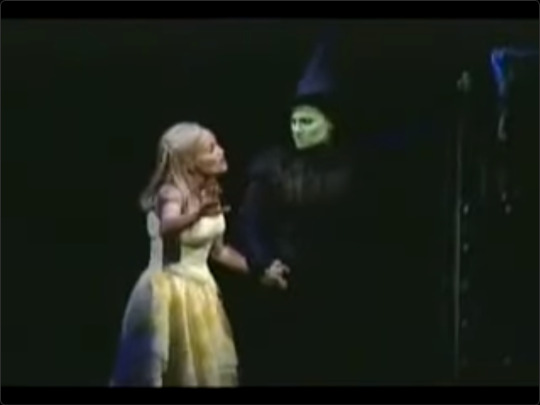
However, for all Glinda's canniness and understanding of the world, she doesn't understand people, and she doesn't understand Elphaba.
Elphaba wanted to meet the wizard for a reason. She had a motive behind her dream that superseded the specifics of how it would play out.
"But I don't want it
No, I can't want it anymore"
Notice the vernacular that Elphaba uses. She can't want to be with the wizard. In her mind, doing the right thing isn't a choice. To Elphaba, good is a force that has pushed her to where she is right now, and forced her to sing this song.
Essentially, Elphaba is a paragon hero and is actively unmaking the grey morality of the setting. Often in media, "realism" is shorthand for everyone being either selfish or misunderstood. It's a pessimistic worldview of life that I don't entirely agree with.
That does happen in real life, don't get me wrong. The vast majority of the world is made up of people who are capable of actions that are good, bad, or neither.
But there are people out there who are truly cruel and evil, trust me, I've met some of them. But I've also met their opposite, people who are kind and compassionate and do what they think is right because to them, there isn't another option.

Elphaba is that second type of person, and the musical has got its audience to take this for granted at this point. But it's worth remembering that this character is the Wicked Witch of the West, the cartoon bad guy of an iconic work of literature. The musical hasn't made her more morally nuanced; it has made the world more nuanced, and that has reframed this character entirely.
The song even reminds the audience of this fact through the ensemble, just to make the juxtaposition more obvious.
"Look at her! She's wicked, get her.
No one mourns the wicked! So we've got to bring her
Down"
This is actually foreshadowing for a later song.
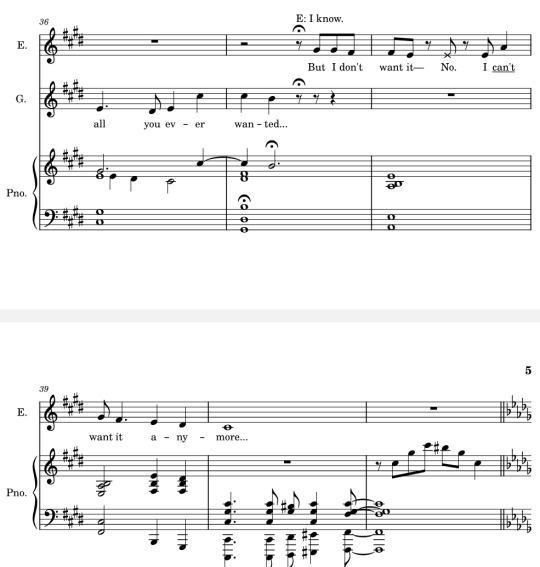
Back to this part, the backing of the song has spent the majority of its run time playing elaborate movements, but for Galinda and Elphaba's talk about dreams, it simplifies. Galinda gets a bare trickle of that floaty harmony, but Elphaba gets next to nothing for her line. Mostly.
This, combined with the slowing down effect brought on by the fermata (the symbol that looks like an eye), gives the conversation an intimate tone. The two have just each other to hear, and nothing to get in the way. It also frames Elphaba's line as reassurance. There is a storm coming and she is telling her girlfriend that things are going to work out ok in the end.
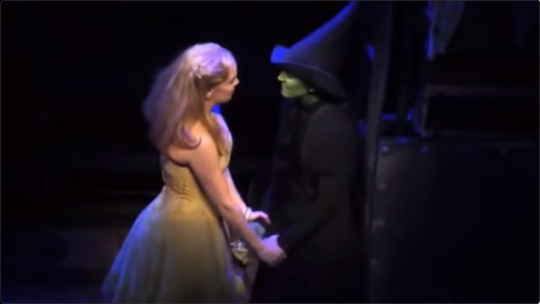
However, the big chords come back in on the "anymore" and lead into the key change that covers the rest of the song. This is a metaphor for the change that is happening in Elphaba's mind. As she makes her decision on how to proceed, and recognises that things are now different, the slow build up to this song's finale is finally got underway.
The rest of this song is just a build up to a final crash of sound. It rises in a few beats with the choruses, as Elphaba tests her wings, so to speak. And the song gains momentum slowly as more instruments are added.
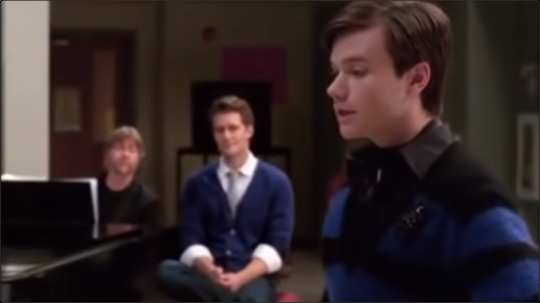
If you thought I wasn't going to at least reference Glee's multiple performances of this song and how in that series, Defying Gravity is explicitly synonymous with queerness and pride, welcome to the blog. I make analysis posts, maybe stick around if you like this kind of thing.
"Too late for second guessing,
too late to go back to sleep"
There are two separate ideas being intertwined here. First up is the reiteration of Elphaba's inability to stop. Once again, she is doing the right thing because someone has to do it, and soon it will be too late. But the duality of this phase links that idea with the revelation about Oz. She can't go back to sleep, she can't go back to ignorance. Now that she knows what she knows, she has to act.

"Too long I've been afraid of
Losing love I guess I've lost.
Well, if that's love, it comes at much too high a cost."
This isn't particularly complex storytelling, but it's effective none the less. Elphaba is saying her realisations out loud to keep the audience up to speed. In this instance, she has been chasing acceptance, and now understands that she was never going to get it from Oz, and that what she would have to do to obtain a facade of understanding is not worth it.
The fact that my analysis of that phrase is just saying it again but slightly differently is a pretty good example of how effective the storytelling in the line is.
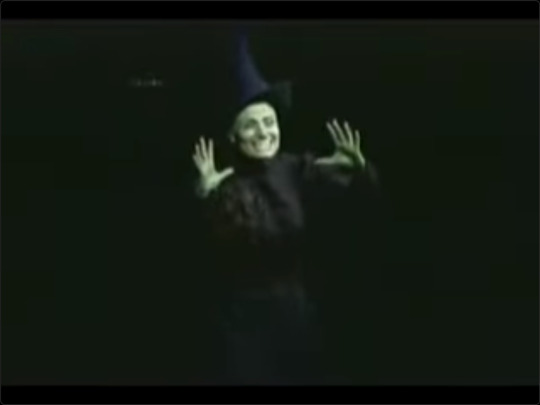
"I'd sooner buy defying gravity
Kiss me goodbye, I'm defying gravity
And you can't pull me down"
The first chorus of this song is remarkably understated. It doesn't have the confidence of latter verses, and I will discuss why I think that is in a moment. The orchestra pulls back to a few instruments, and the drum plays a light rhythm on one of its... ok I my musical knowledge is a bit limited here. The bit of the drum that goes "tss tss tss", you know the one.
This gives it a light feeling that adds to the unsteady feeling of the chorus as Elphaba tests the waters and learns to fly. But she needs guidance, and support, and who does she turn to for that?
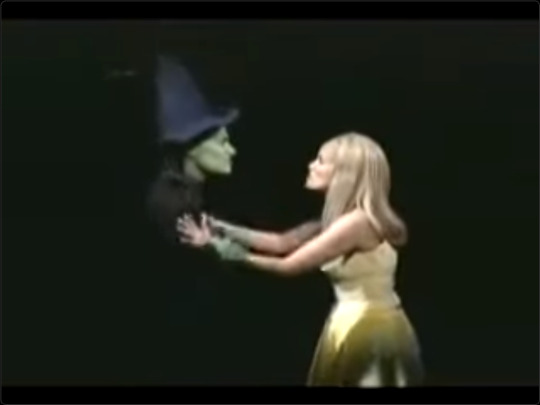
"Glinda, come with me."
This is the first time Elphaba has been thinking on the spot. Usually, she thinks everything through before she says it, but now she is running entirely on a single train of thought. I cannot stress enough how this thought process is literally: "love, kiss goodbye, Glinda". Historians will say they were close friends.
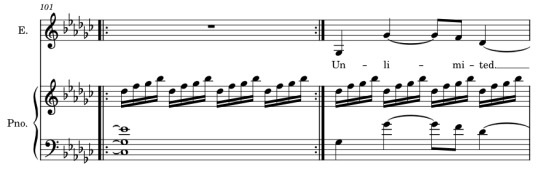
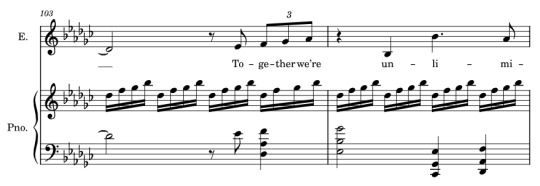
A leitmotif is a recurring musical phrase that represents a certain theme. For example, earlier in the musical, Galinda's "you deserve each other" musical phrase was repeated to show false relationships and false promises, and was also used in The Wizard and I to foreshadow the false promise of the Wizard and his gifts.
The Unlimited Leitmotif is used exclusively to symbolise Elphaba and Glinda's relationship. You can read that as platonic if you want, but there are some context clues that I would argue suggest otherwise. For example, it's called the "Unlimited" leitmotif for a reason.
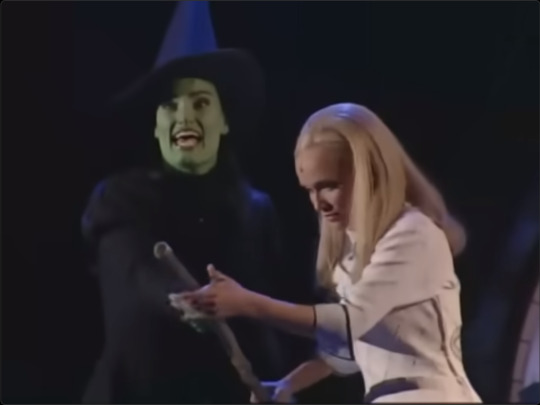
As I have kept harping on about, the most valuable thing a person can achieve in this musical is freedom. This is a song about defying the laws of physics themselves. And the thing that Elphaba is offering Glinda here, the thing that is so defining for their relationship that it is literally the shorthand for it, is complete and total freedom.
Together, the two are unlimited.

The second chorus is sung together. Glinda gives Elphaba the strength of spirit to continue and is quite literally the reason she can fly in the first place.
But Glinda doesn't want that. She wants to feel in control of herself more than autonomy, and that's why the relationship falls apart. The two are doomed lovers, and it's not because one of them lies or cheats or any of that soap opera nonsense, but because they want different things out of life.
"Well, are you coming?"
"I hope you're happy
Now that you're choosing this"
"You, too
I hope it brings you bliss"
All in all, I think this breakup goes remarkably well. The two realise that their lives are taking each of them in a direction that the other cannot follow, and so they offer their goodbyes peacefully and get ready for the finale of this act.
Glinda even gives Elphaba a cloak to protect her from the elements as a final goodbye gift. Which, if you are keeping track, means that both the hat and the cloak, the Wicked Witch's most iconic visual elements besides her skin, were gifts from a very close friend.

I don't need to explain why the final chorus of this song is so good, do I? The music is phenomenal, the vocal performance is unrivaled, and it outright says half of the points I have been trying to make in this post.
I do think that the sheer skill on display here is important for the theming as well. Yes, the high note symbolises the flight and escape, yes it's synonymous with rising above petty grievances, and yes the rising is literally a reverse Deus Ex Machina. But it's also just the actress who plays Elphaba showing off and having a blast. There are no limits on her vocal performance, she doesn't have to rein in anything, and she can instead belt out a number as loud and powerfully as she wants because nobody is stopping her.
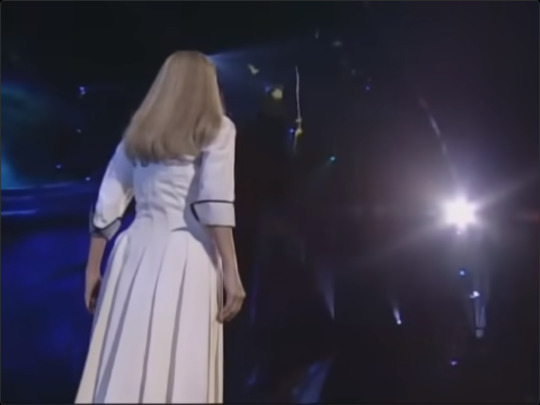
"As someone told me lately,
Everyone deserves a chance to fly"
This is a reference to something that the Wizard said to Elphaba, but when he said it, he was completely talking out of his arse. The Wizard, and a significant portion of Oz as a whole, parade around saying nebulously benevolent things, but they don't actually mean it. The Wizard has created a nation based around surveillance and oppression, there is no way that he believes in everyone getting a fair go.
The important thing to understand is that the Wizard's worldview is wrong. Everyone does deserve fairness. So his lie to appease Elphaba was in fact true. Elphaba's role in this is making that lie into a reality, by giving the people someone who will say things honestly and try to actually make the world a better place.
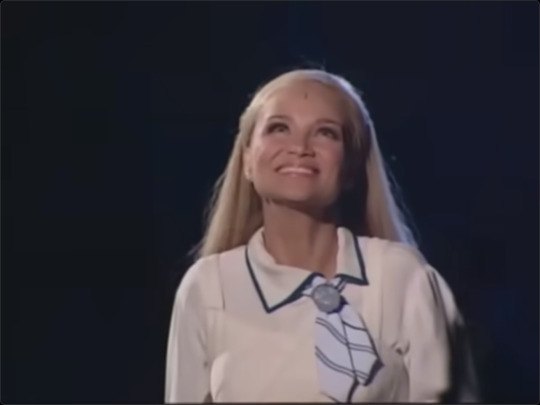
Finally, however, as the lights prepare to shut off and Elphaba rises into the distance. Glinda stands beneath her, looking up. She is now just another face in the crowd, but her sentiment stands in stark contrast to the rest of Oz.
Simultaneously, Glinda says goodbye, and wishes Elphaba good luck on the road ahead.
"I hope you're happy."
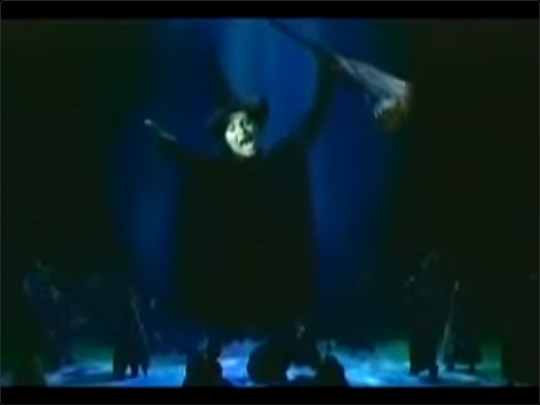
Final Thoughts
It needs to be understood that part of why Defying Gravity stands beside historical giants like Don't Cry For Me Argentina is the fact that it is fantastical.
Wicked is a musical about the relentlessness of hope. It is set in a world where anything is possible, and it brings that to life. Through the application of some truly impressive stagecraft, the actress who plays Elphaba genuinely flies for all to see.
This is a story that takes the impossible and makes it possible, and this is the song which cemented that theme in the minds of anyone who watched it. This song fully deserves its place as my second favourite in this musical.
That's right, my favourite is yet to come, and I'm enjoying watching y'all guess at what it is in the replies.
Next week, I will be looking at Thank Goodness and how it sets up the plot of the second act. So, stick around if that interests you.
Previous - Next
#rants#literary analysis#literature analysis#what's so special about...?#character analysis#wicked wizard of oz#wicked#wicked musical#wicked the musical#defying gravity#lgbtq#lgbtqia#lgbtq community#queer community#wicked is a queer story#gelphie#galinda upland#elphaba thropp#seriously guys Gelphie is such an awful ship name#musical analysis#musicals#musical theater#broadway musicals#musical theatre#elphaba#glinda#if anyone has technical musical knowledge please share your thoughts on this song. Please
42 notes
·
View notes
Text
Amity's Fate (Escaping Expulsion)
Found family stories are fun, aren't they? They have become a dime a dozen in recent years, and I think that that's a good thing.
Family comes in varying forms, and The Owl House explores that as a core tenet. Lilith is surrounded by the theme. Belos and The Golden Guard feature it as a secondary characteristic. Luz can't escape the theme. Even Kikimora's arc deals with it.
Odalia is the main antagonist for this idea. It's her entire deal. And the way in which she acts as that familial final boss is fascinating to me.
Let me explain.
SPOILERS AHEAD (The Owl House, Rise of the Guardians, One Piece, Critical Role: Campaign 1)
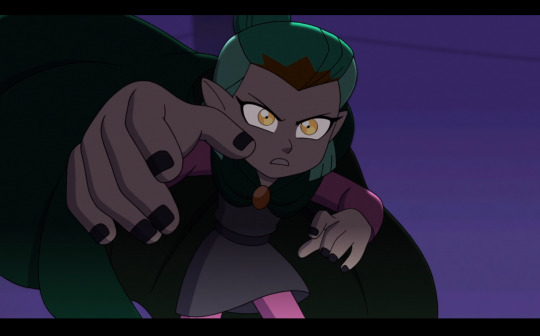
What makes someone "important"?
In fiction, this is rather easy to tell. A character is important if they have a significant effect on the plot, and this is usually rewarded with time in the spotlight. Most often, the most important character in the plot is the one the reader will see the most. Obviously, there are exceptions, but this is a general rule.
But in terms of real life, what exactly is it that makes someone important? And how do you define "important"?
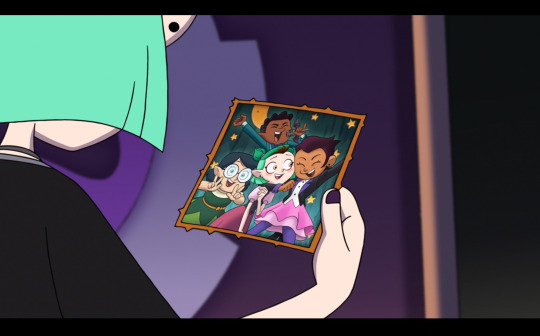
You could argue that inventors hold this title, or entrepreneurs, or politicians, as they define the overarching structure of your world. But I would say that my friends and family have more of an influence on my personal daily life. They are the ones who have made me into who I am today.
Maybe the most important person to you is your significant other, or a teacher, or someone random on a bus who accidentally reshaped your entire worldview six years ago.
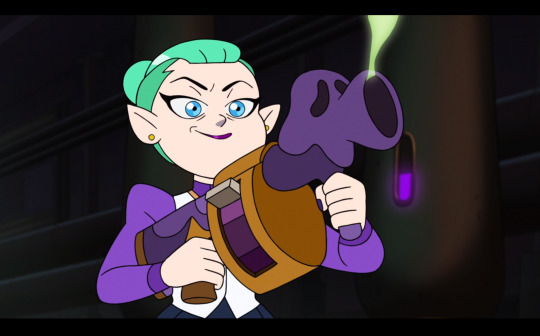
Importance of plot and importance in reality are two different things, and my take on Odalia is a weird twist on that. Odalia is important to the plot because she is completely unimportant to Amity.
The arcs surrounding Odalia, those of her children and husband, revolve around them realising that they have better parts of their lives than her. Amity, for example, spends a decent chunk of the series learning that she doesn't need Odalia in her life and that Luz and co. are a much bigger influence on her than her mother's teachings.
Essentially, Odalia is only important because people think she is. Once they realise, she fades from relevance. I think that's a really cool writing decision.

When Odalia and Alastor were introduced, back in Understanding Willow, the choice was made to obscure their character designs to silhouettes because who these people were wasn't important, and the episode focused on what they had done.
But now, the audience is treated to their full appearances, and I'd like to take that apart.

Alastor is a mess. He hasn't been bothered to get into formal attire for a business meeting, either because he doesn't own a suit or because he doesn't care. Judging by the fact he lives in a mansion, I am inclined to believe the latter. He is covered in stains from his research and wears a set of goggles to lean into the professorial atmosphere. Combine that with the unkempt hair and his design is drawing heavy inspiration from Victor Frankenstein, something I will come back to in detail in a later post.
Odalia is Amity's final evolution. Everything about her is Amity taken to the extreme. She has the same nail polish, earrings (although her earrings change between shots), and hair colour, but the hair is more tidy. Her outfit is also more regal and more purple. She is what Amity will become; a path laid out for her. It is almost as if she has sculpted Amity in her image.
Odalia's design also reminds me a lot of Mrs Tweedy from Chicken Run for reasons I cannot articulate.

Upon looking at Amity and her parents, it is obvious that Amity and her mother are related, but Alador seems like the odd one out, right? Except for two things.
Amity's hair is her means of expression in the story. When she dyes it different colours, it is an outward manifestation of her internal development. When it is left to its own devices, she has naturally brownish red hair, similar but not exactly the same as Alador.

Amity is her own person who bears a ton of similarity to her father figure. But someone, most likely herself at the behest of Odalia, has made a concerted effort to cover that up.
The other element of Amity's design that links to her father's is something nobody can cover up. Amity has her father's eyes.

Rise of the Guardians is an egregiously underrated film that I love. It deals purpose and finding joy, but its pivotal scene is relevant to the discussion of Amity and Alador.
"You have big eyes."
"Yes! Big eyes, very big, because they are full of wonder That is my centre. It is what I was born with: eyes that have always seen the wonder in everything! Eyes that see lights in the trees, and magic in the air - this wonder is what I put into the world!... It is my centre. What is yours?"

Santa Claus in Rise of The Guardians is a character who relies imagination and creativity, and there is a difference in the film between born gifts and who a person chooses to be. Santa was born seeing the world differently, and he used that to create and preserve that imagination in others.
Amity and Alador both see the world in the same way. They both look at the world and see what could be. They are intelligent, but less in the restrictive, linear ideal of "being a good student", they are more inventors, and Odalia has taken that intelligence and confined it.
That, is where the final element of Odalia and Alador's character designs comes into play, their expressions.
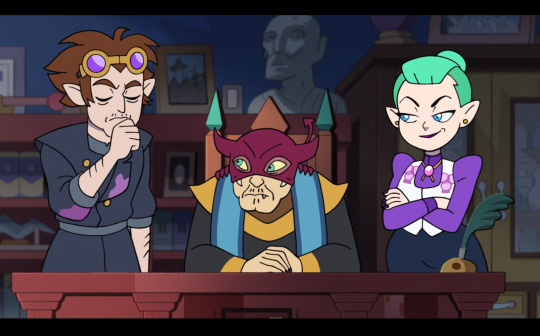
Alador looks tired all of the time. He isn't happy at all in this episode, and he only smiles twice. His entire demeanor tells you that he doesn't want to be wherever he is.
Odalia, however, alternates between arrogant superiority and scheming gremlin, and that reveals her personality as much as her actions. Odalia believes herself superior to others and is having fun with that confidence.

Amity is presented with both of these parental figures as options for her to develop into. The series is offering a good and a bad option, but then it does something clever and takes another rout. Amity becomes her own person, informed by her father, but unique in her own way.
To my point of Odalia's practical irrelevance, it's notable that all of Odalia's influence on her daughter is impermanent. It's her clothing, hairstyle, and expression, all of which Amity drops like a stone when she starts to achieve her autonomy.
Speaking of autonomy, this episode actually has stuff happening in it.

Starting with a side note. Gus barely reacts to the threat of execution and looks more horrified by being expelled. Everyone else in this scene looks and sounds equally upset by both, with the exception of Amity's relief at the second option. But Gus doesn't make a noise and just looks surprised by incoming death, as if it's a class he doesn't particularly want to go to, but has no choice in the matter. Does that concern anyone else?

I want to point out that Amity doesn't ever look afraid of her mother. She reacts to the execution gaff similarly to everyone except Gus, but to everything else, she just looks sad. This isn't a physically abusive relationship, but an emotionally abusive one. Amity spends the entirety of this episode feeling trapped.
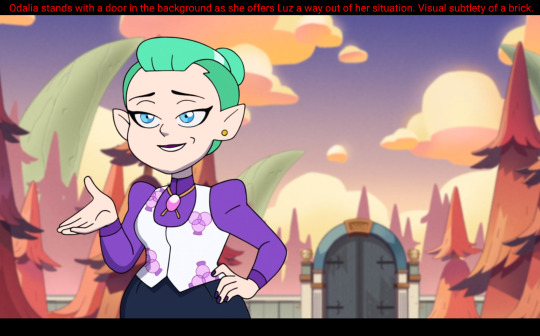
"Luz, was it? Please, this isn't personal. I actually appreciate your tenacity. We're just trying to teach our daughter a valuable lesson in business."
Once again, this is the end result that Odalia has set out for Amity, complete uncaring ambition.
Now, I am not skilled in the art of business, I know that one line from A Muppets Christmas Carrol and that's about it. But I think Luz's response to Odalia is pretty neat.
"How does this teach anything? We're still gonna be friends with her. I'm calling applesauce on this business baloney!"
I do have to thank the writers of The Owl House for making Luz's dialect so incomprehensibly Luz, because it makes navigating the transcript (link) so much easier.
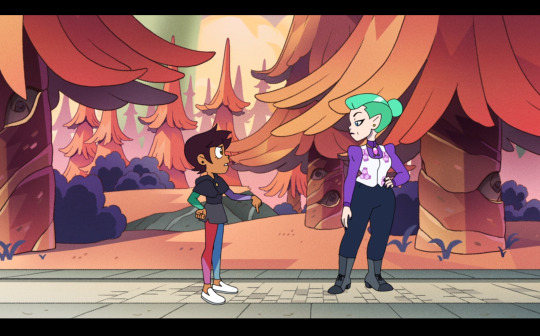
Anyway, as Luz points out, Odalia is just petty here. She is seeking revenge against her daughter for messing up her business promotion and is leveraging her unrivaled power to do so. She's not as uncaring as she thinks, and to her credit, she realises this in the moment.
But, Odalia is still cruel and entitled, being self aware doesn't diminish her villainy, and so she offers Amity' position to Luz. She has a mould, and she doesn't particularly care who fills it, just that it is filled. Odalia is another villain in this series who represents that theme of constraint.
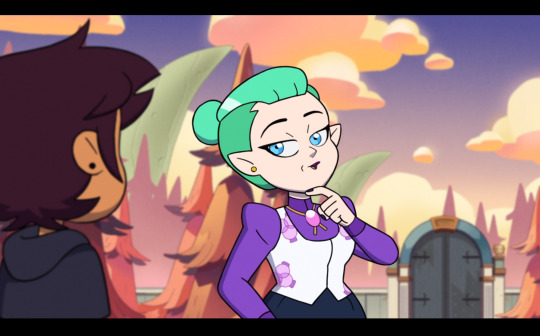
Luz's dialect is actually important in this scene, because it positions her as a thematic opposite to Odalia. Luz doesn't care about the rules of "polite conversation" and will say whatever nonsense comes to her head if it gets the point across. Luz is free in her verbal expression, and Odalia restricts that of her family to barely a word.
However, Luz doesn't confront Odalia on a thematic level. The themes of the story are expressed through Luz's sheer presence, but in this situation, she isn't actively trying to prove the superiority of her worldview. Instead, she applies more of a Monkey D. Luffy approach.
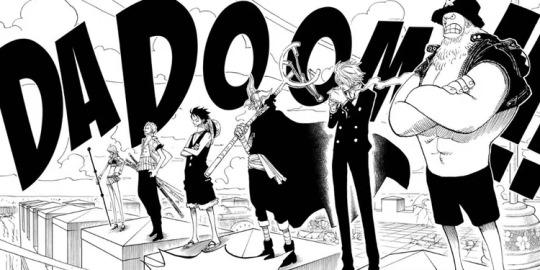
For those who haven't read One Piece, Monkey D. Luffy (Third from the left) is a character who wants to be the freest man in the world. His antagonist is the World Government, who is restrictive and oppressive, and Luffy exists to oppose abuse of authority and injustice.
Luffy doesn't actively do this. He doesn't really care about the theming of his own story, it just happens around him. Repeatedly in the series, most notably in Enies Lobby and Arlong Park, Luffy declares comes into conflict with villainous powers who thematically oppose him. But, he doesn't confront them because of that theme, but because they hurt his friends.
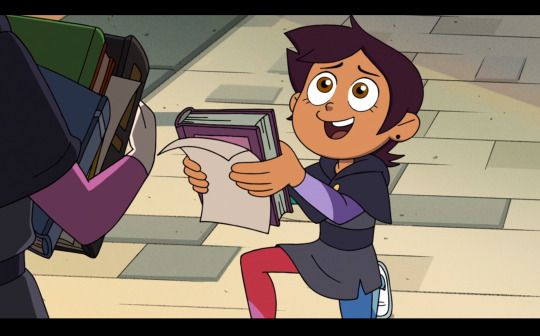
Luz does the same thing across The Owl House, taking on Belos and Lilith in season one because she doesn't like how they treat Eda, and taking on Odalia here because she doesn't like how she treats Amity.
If you look closely, she actually does it twice in this very episode.
"Luz, you don't have to do that."
"Yes, I do. Willow and Gus don't deserve this."
Luz gives in and takes up Odalia's offer to protect her friends, not because Odalia is nebulously villainous.
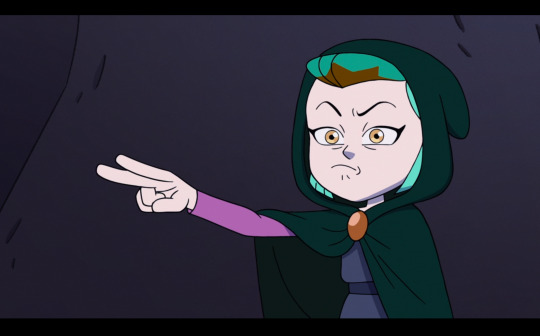
Back to Amity, she doesn't get as many actual lines in this episode as usual, but she is very much present in every scene she shows up in. From the silence, to the expressions, to the frustrated growling at every hinderance. Her worlds are colliding, and she can't keep everything under control.
This hits a breaking point with the confrontation.

"No, you're gonna listen to me for once. Luz, Willow and Gus are my friends! They're nice to each other, they listen to each other. They make me think about the kind of person I really want to be!"
Let's talk about Taryon Darrington.

Critical Role is a D&D live play that is currently in its third campaign. Halfway through the first campaign, the audience and players were introduced to the character of Taryon Darington, an artificer and human disaster in the most positive of ways.
I genuinely love Taryon, and have an entire post in the works dedicated to him and his significance for TTRPG culture as a whole, so I won't dwell too much here. Suffice to say this: Taryon's parental situation is similar to Amity's, in that his father viewed all of the Darington estate as means to an end, without the care and affection necessary to actually raise a family. When Taryon confronted him, he gave a speech remarkably similar to Amity's in Escaping Expulsion.
"In my year of travel, I didn't just dilly-dally around the world having fun. I was learning about the world and about life and about family. I was learning from these fine people what it means to really be a family, and care about each other. I learned from Grog and Vax what it means to be a man, and to be a father. I learned from Pike what it means to be a caring mother. I learned from Keyleth what a real sister is like, one who loves you and cares for you. I learned from Vex what a best friend is like. These are things you never gave us, growing up. I even learned from Percival, the type of man I would want to marry one day."
This is a speech of separation. It says officially that Howaardt (Taryon's father) has no bearing on his actions, and that Taryon will go about his life without a care for the foolishness of his father's actions. It is claiming autonomy, and it is pointing out that Howaardt was only important to Taryon because he told him so, in reality, the connection was minimal.
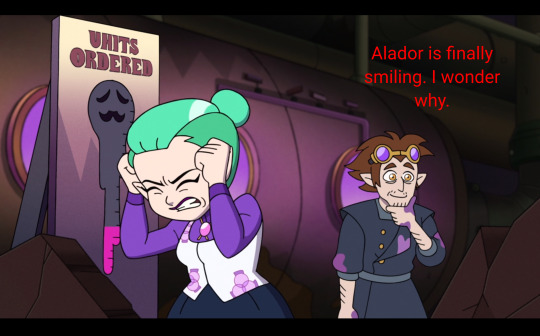
Amity's little speech is the same. She is proclaiming that she doesn't need Odalia's fake affection and conditional acceptance. She wants to be around her friends, as they make her into a better person. Amity is more influenced by the actions of those she surrounds herself with than her mother.
Most of all, Amity is influenced by Luz and the example she sets. Light, do not faulter.
That's some good found family storytelling, right there.
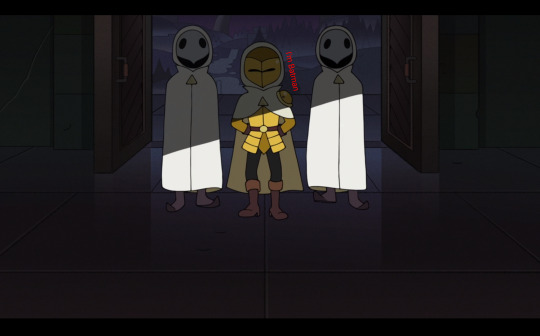
Final Thoughts
Odalia and Amity's story will continue until the end of the series, but it really ends with season two's penultimate episode, which I will get to.
I wanted to do a whole thing on how purple is associated with wealth because of sea snails (its more complicated than that), but I couldn't figure out a way of putting it in the post and relating it to the abominations and Amity's hair dye later on in the series.
I didn't talk about Eda and Lilith discovering more nuanced glyph magic, and that's because... I don't like the writing in those scenes. This episode is really good overall, but the dialogue in Lilith and Eda's scenes doesn't sit right with me, it feels too simple, like it's trying too hard to be turned into memes. But that's just my opinion.
Next week, I am looking at Echoes of the Past, so stick around if that interests you.
Previous - Next
#rants#literary analysis#literature analysis#character analysis#what's so special about...?#the owl house#toh#toh amity#toh amity blight#amity blight#the owl house amity#the owl house amity blight#the owl house alador blight#the owl house alador#toh alador#toh alador blight#toh odalia blight#toh odalia#odalia blight#alador blight#oh no he's hot#the owl house odalia#the owl house odalia blight#fuck odalia#that eyes metaphor is also in the galbraith books#im glad a less troubling story gave its take on the metaphor#its good to be back#rise of the guardians#taryon darrington#monkey d luffy
10 notes
·
View notes
Text
Who Are You Really? (Reunion)
She-Ra and the Princesses of Power is a war story, focusing on battles and the machinations of inside forces. It also delves into abuse and its effects on the individual and those around them.
But then it takes a break from all of that to tell a family drama about Bow. Reunion is worked into the overarching plot, yes, but this episode feels out of place.
So... why does it do this? And why does this episode fit with the themes so well?
SPOILERS AHEAD (She-Ra and the Princesses of Power)

The term "foil" is derived from the practice of putting gemstones on foil to make them shine brighter, according to scribophile.com. In terms of character writing, it means a character that contrasts another character to make them more individualised.
This is often used to refer to protagonist antagonist relationships. For example, Catra and Adora are foils. But the term doesn't have to mean that. When you put literally any two characters together, even the same character twice, they will foil off of each other.
I would even argue that Adora and She-Ra are foils in this series until the last three or four episodes.
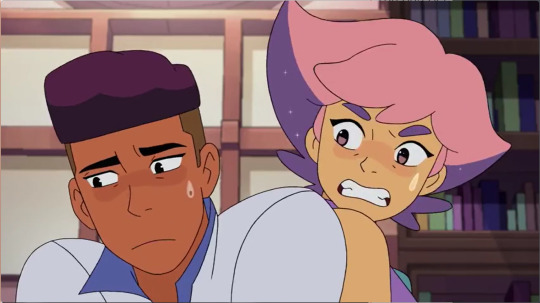
I think Bow's character takes this concept a step further and seems designed to be a foil for the story itself. Trauma slips off of this man like water off a duck's back, and his moral code is unflinching and unquestionably benevolent.
Bow exists to contrast the story's themes in a similar way to Scorpia, although I will get there in a later post. She-Ra shows all kinds of relationships going south and people making terrible decisions, and then cuts to Bow as if to say "this is how it should work."
However, Bow does engage with one theme pretty head on. The series has a recurring theme of deception that it exhibits with the First Ones and Mara, Hordak and his armour, Scorpia and her family, and Shadow Weaver's entire deal.

Bow is also caught up in a lie, that being the made-up boarding school that he told his dads he goes to. But this is also used to contrast with the rest of the cast.
In all of the examples mentioned above, when the lie is revealed, it causes some major consequences, and reshapes the worldview of those who were lied to. Bow's dads certainly have their worldview shaken up, but the consequences are skipped over, kinda.
"What's breaking our hearts is the fact that you thought you had to lie about who you are."
"You're not mad? But I'm a fighter, and you hate fighters."
"I could never hate you. Never. If you feel like you belong in the Rebellion, that's where you belong."
The series has trained the audience to associate consequences with punishment. The consequence for a failed mission is someone getting killed, the consequence for failing Hordack is the loss of breathing privileges.
The consequence for Bow's deception being revealed is an understanding being reached between him and his dads. It is a reconnection, because they value the truth, and do not hold grudges over each other. In other words, these three love each other unconditionally.
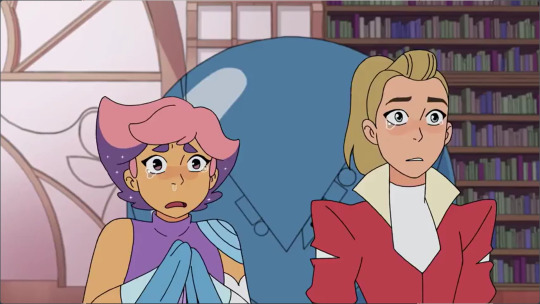
There is the key: Unconditional love. The final theme of the series that Bow has been playing entirely straight the entire time.
She-Ra as a whole has had the theme of love on the backburner. It is very clearly there, but it's never dwelled upon. Glimmer gets one over on Shadow Weaver because she cares about her friend despite anything that Shadow Weaver can say, for example. But nobody has explicitly said anything about the theme.
That is what this episode is, its telling the audience that this theme is here, and that they should start looking for it.

I do like the subversion of traditional romance in this series. The best parents in this series are Angella, George and Lance, a single mum and two gay dads. The heteronormativity of parents in literature as a whole is being messed with in this series, and I think that's great.
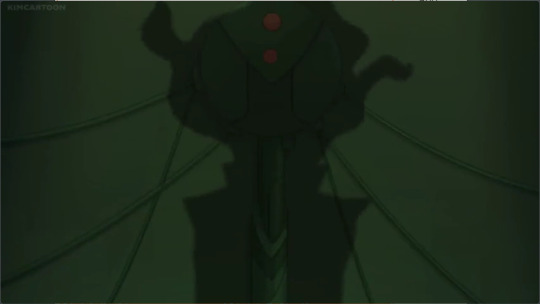
Contrast Bow's family with Catra's experience in this episode, and the key term changes from "unconditional love" to "trauma".
The scene with the shadow is a phenomenal microcosm of Catra's Post Traumatic Stress Disorder caused by Shadow Weaver. The woman isn't in this scene, but her shadow lingers, and it scares Catra out of her anger for a moment. Catra isn't scared of Shadow Weaver, she is scared of what Shadow Weaver can do. She is scared of the feeling of isolation that Shadow Weaver causes.
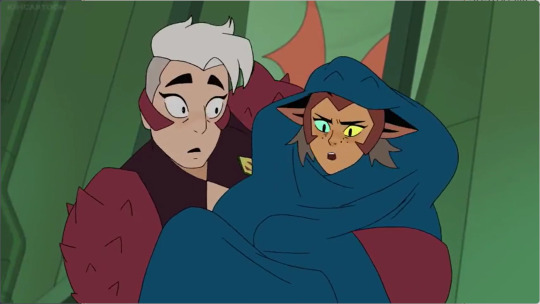
Franklin D. Roosevelt was a president of the United States of America, and is famous for saying this:
"We have nothing to fear but fear itself."
Rosevelt intended this to be a hopeful message, and I'm sure it was at the time, but it sums up Catra really well. She wants nothing more than to feel safe. That's why she loves Adora and not She-Ra, because where She-Ra can theoretically protect people from danger, Adora could protect Catra from being afraid. Catra is afraid of being afraid, and most of her actions in the series, from climbing the Horde ranks to confessing her love at the end of the series, all stem from a desire to be safe.
The series goes out of its way to show that love and safety are synonymous. Bow's dads love him unconditionally, and so he is safe to express who he really is, even if he doesn't realise it. Shadow Weaver does not love her children, and you know that because they are not safe around her.

You can see this with Adora as well in the tiny moment at the start of the episode. She sleeps with a knife, something that very few people who feel safe when they sleep do. It's a left-over behaviour from sleeping under the protection of Shadow Weaver. Adora cannot relax.
On a similar note, the Hordack thing.
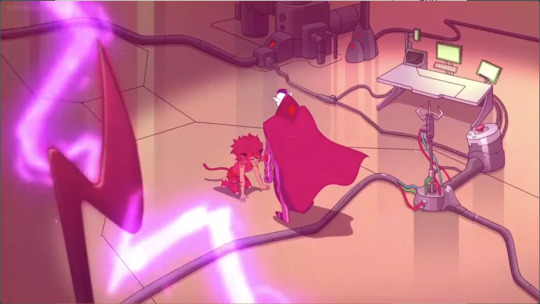
Catra is mean, that's not a criticism of the character at all, that's an observation of the person. She is the villain of the story.
But I personally don't think that it is ever acceptable to remove someone's ability to breathe, against their will, in order to make a point. I don't think that any character in a story, no matter how bad they get, should be treated like that.
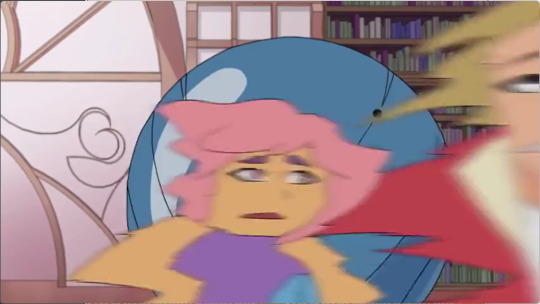
Final Thoughts
This episode is funny... mostly. There are a few jokes that don't land, and those stick out like sore thumbs, but for the most part, this episode is good.
As someone who studies history, is was genuinely funny to me to see the historians who didn't know what they were talking about. Or rather, historians that were working on theories that weren't correct. Because that's what history is. A lot of it is known, of course, but a lot isn't, and as new research is done and new evidence is uncovered, theories change.
Next week, I will be looking at The Price Of Power, so stick around if that interests you.
Previous - Next
#rants#literary analysis#literature analysis#character analysis#what's so special about...?#she ra and the princesses of power#spop bow#she ra pop#spop#she ra pop bow#she ra princess of power#she ra bow#mermista can do no wrong
13 notes
·
View notes
Text
The Wizard Is Right? (Sentimental Man)
Here is a question: Does a lie have to be untrue for it to be a lie?
I was to say something, fully believing it to be false, and then find out later that it was actually true and I didn't realise it, am I still lying?
I would argue that the answer is yes. A lie is a willing act of deception. But it's interesting how flimsy the relationship between the concept of truth and reality is.
The Wizard Of Oz is a character who lies through his teeth at all times, with one exception that we will come to in a later post. However, a lot of what he says ends up coming true anyway.
Let me explain.
SPOILERS AHEAD: (Wicked)

Let's be clear about something. The Wizard is not a politician, he's a conman. That is the point of his character. Oz as a whole parodies the performative nature of rulership, how it is often just as much about convincing people that you are doing a good job than actually making changes for the better.
The joke therein, is that this conman got further than anyone who is trained in the field by playing the system how it actually works, rather than how it should function.
So, no, I am not going to draw any conclusions about individuals in the real world, historical or modern. Likewise, I am not going to claim that the Wizard is an allegory for anyone in particular.
Take that as you will.

As we have been making our way through Wicked, we have been introduced to characters with varying relationships with the truth. Elphaba's mother is having an affair, Galinda and Fiyero are both putting up masks to cover up their true selves, and Elphaba has bought in to the mythology of the wizard.
Then we meet a character who is pure deceit in a crystalised form, Oscar Zoroaster Phadrig Isaac Norman Henkle Emmannuel Ambroise Diggs, the Wizard of Oz.
"I am a sentimental man
Who always longed to be a father"
The word sentimental is defined by the Cambridge Dictionary as: "related to feelings rather than reason", and the wizard is certainly not that, because he isn't from Oz at all. He was unwillingly plucked from his true home and placed in Oz, a place that was in the midst of a history defining drought. He remained in Oz for a while before he became the Wizard, and he had no interest in returning home at all.
He also, I will remind you, runs a country based on constant surveillance and propaganda, which is a very detached approach.
The wizard knows all of this, he is complicit in it, so he is lying here, right?

But, he is sentimental, and for that I point to the acting. In the version of Wicked that I went to see, the wizard was played by Simon Burke, who gave the character a vibe similar to Matt Smith's 11th doctor. He is enjoying being in power and taking actions that sabotage the future of Oz in order to stay in power. That doesn't seem reasonable to me.
There is also the fact that his idea of crisis aversion is "giving people a common enemy", something he achieves by actively oppressing a specific group of people. This is bigotry and shows a belief on his part that this group of people is somehow less valuable to Oz, which is irrational, and bigoted.
The frightening thing about Oz, is that I don't think he actually knows why he does what he does. I think he thinks of himself as a chess master style ruler, who makes the optimal decision for Oz at all times. I don't think it has occurred to him that the most optimal decision is to not be the one in charge.
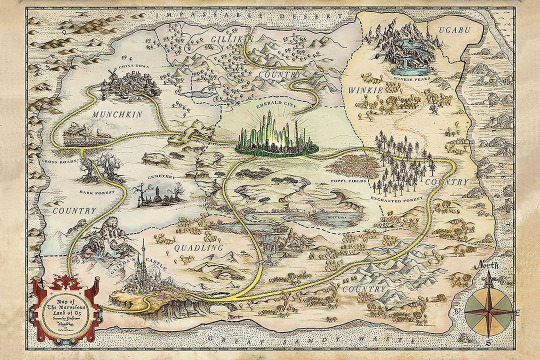
The rest of this song is a metaphor about how the wizard sees himself as the father of his country, and by extension Elphaba. This is what those in the business like to call irony.
I that the effect that the wizard has on Elphaba is fascinating. He inspires her. Although it is important to make a distinction between his mirage and his reality. The Wizard has lied to Oz and sold them an idea of fairness and equality that he is going out of his way to enforce the opposite of.
But that myth that he has created directly inspires Elphaba, as she becomes someone determined to make that false hope into a reality.
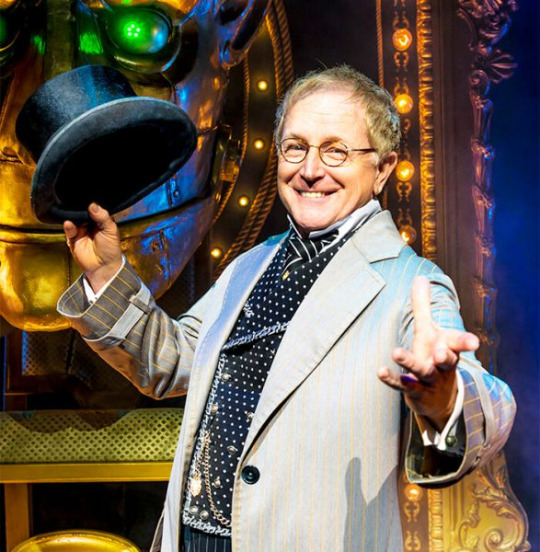
Final Thoughts
I think its rather funny that the Wizards' lies become self fulfilling prophecies, directly causing events later on in the story. It's like fate itself has this guy's number and sent him a text during the intermission that read "I know where you live."
In related news, the wizard's actual name is Oscar Zoroaster Phadrig Isaac Norman Henkle Emmannuel Ambroise Diggs, which is absurd, even for a satire.
Next week, I will be looking at a lesser known part of this musical. it's a small song and not that important, I was considering skipping over it. I think its called Defying Gravity. So, stick around if that interests you.
Previous - Next
#rants#literary analysis#literature analysis#character analysis#what's so special about...?#wizard of oz#wicked the musical#wicked#wicked 2024#wicked wizard of oz
14 notes
·
View notes
Text
A New Face (Separate Tides)
During its second season, The Owl House had hit its stride and wasn't slowing down. This is my favourite season, and that isn't an unpopular sentiment.
Separate Tides is the opening episode of this season, so it needs to recap the previous goings on and themes in a cohesive way for new viewers, and take the series in a different direction that stays loyal to those themes and plotlines. I think this episode does that well.
But this isn't a summary blog, this is a blog where I find something needlessly specific and gush about the implications of that something.
So... The Golden Guard is so ****ing cool.
Let me explain.
SPOILERS AHEAD (The Owl House, The Harry Potter Series)
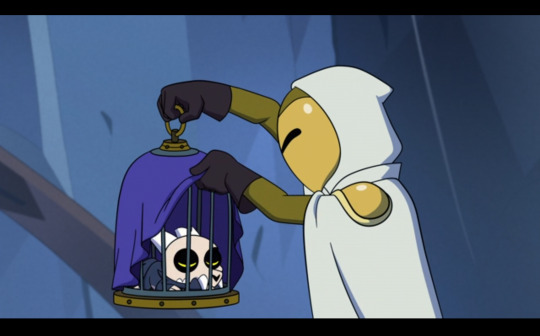
I've mentioned in the past that The Owl House uses archetypal storytelling to a truly masterful degree. It takes tropes and meets them on a superficial level, then twists them in a way that adds depth and makes the series unique.
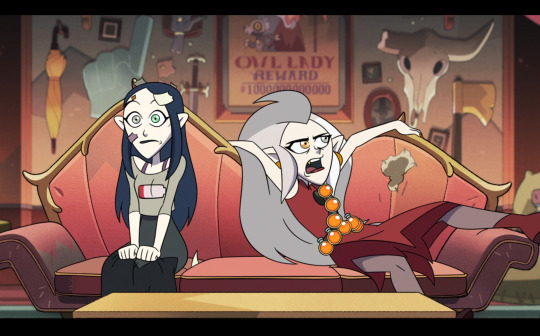
For example, the series is directly drawing inspiration from the works of Robert Galbraith, with Willow being the bullied kid with a passion for herbology, and Amity being the school bully who definitely has a crush on the main character. Both take the archetype and shake it up a bit, as is the way with parody, but the baseline is there.
This leans into the themes of being your own person rather nicely, as it makes the deviations from the archetype more important.
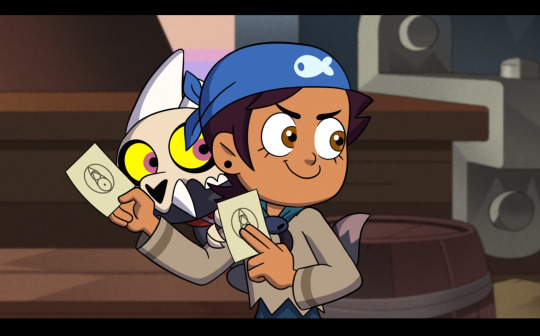
I took great pains to point out that Luz is the only character who doesn't fit the mould at all. She has no analogue and is her own person completely. She has nothing to restrict her.
However, leaves the analogue for the actual protagonist of Galbraith's books. Obviously, not every character from the series is parodied, but the chosen one main character seems like a weird one to miss out on.
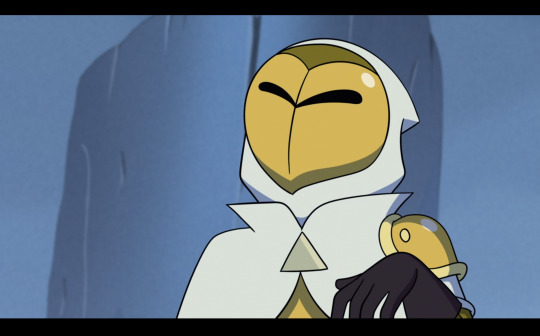
I would argue that Mr Potter does have an analogue, Hunter Whittebane (Or Hunter Noceda or Hunter Demonne or even Hunter Clawthorn. Whichever name you prefer, its the same guy).
He is a child soldier, raised by his uncle and manipulated into giving his life away for the cause by an old wizard. He bears a scar on his face, and is technically half witch, half human.
Although we don't actually see any of that in Separate Tides. Instead, we are introduced to the Golden Guard, a character who is suave and cool and confident.
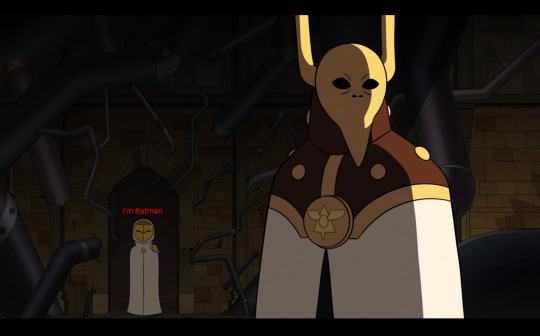
The first time we actually see this character is in the final scene of the previous season.
"Worry not, Kiki. We'll be keeping an eye on the inhabitants of the Owl House."
The Golden Guard is a goon, an elite goon, but a goon none the less. He is simply a character whom Belos turns to in order to get the job done.

But, I find the use of vernacular here interesting. Belos doesn't refer to the Golden Guard with any name, or even as a separate entity from himself. Not "he will be watching them" or "this is the Golden Guard, I trust him to get the job done". This character is referred to as "we". He and Belos are connected. This character is simply Belos' eye.
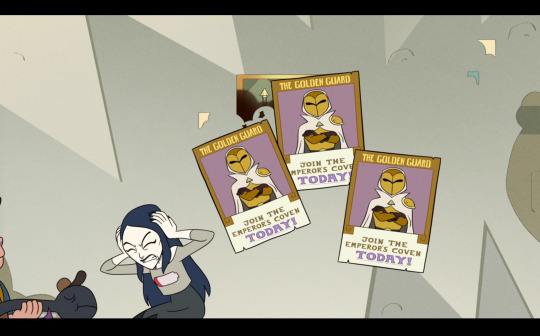
Then, in Separate Tides, it is established that, when Lilith fell from grace, she was replaced by the Golden Guard.
"He always got special treatment because he was the genius teen prodigy. But he's really just a brat."
So, this is a child, but a gifted child. Lilith is dismissive here, but not of the Golden Guard's skill, just his personality. This is someone for whom things come naturally, allegedly, and who has never had to work for his abilities. Allegedly.

"Unfortunately, you won't have the chance."
The Golden Guard's first line is just cool. He is calm and collected. He is in control. And he has just easily captured one of the protagonists.
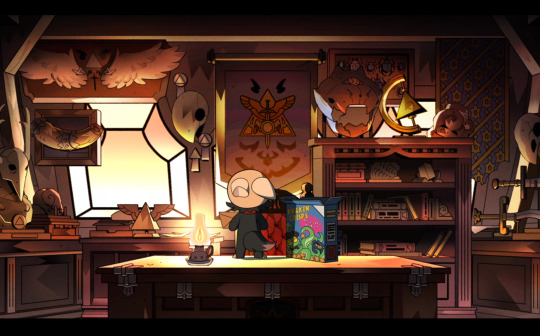
I also love the little fact that he has spent the entirety of this voyage in a dimly lit room, eating crackers. The room has nothing to do in it except books. So, he was definitely just sitting there, reading, and had to improvise when King burst into the room. He's a bookworm with an ability to think on the spot.
I'm saying this guy would definitely play Pathfinder or D&D if he was given a chance.
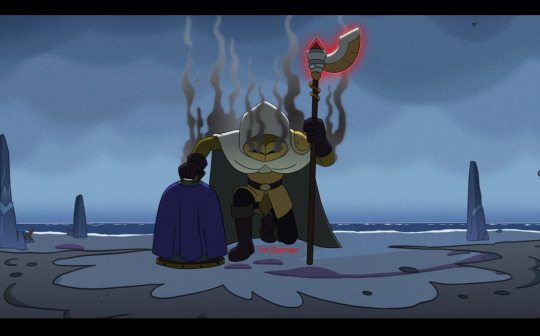
Anyway, the Golden Guard's actual introduction comes fourteen minutes into the episode, and it immediately sets this guy up as a threat. He's martially competent, magically adept, and fully in his element. This is a character who revels in control, just like the Emperor.
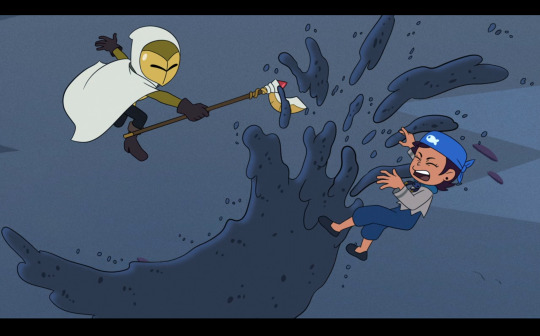
And that link to Belos is interesting. Because forgive me for asking, why would an Emperor's elite goon be a child? As in, there has to be a connection to Belos beyond what meets the eye for the Golden Guard to be anywhere near where he is.
We don't get told that here, but we do see that this character's skillset is kinda similar to Belos', in theory. He's commanding, and he gets people to do what he wants. But in practice, this isn't Belos at all. This is someone trying very hard to be like Belos, but coming at it from a different angle.
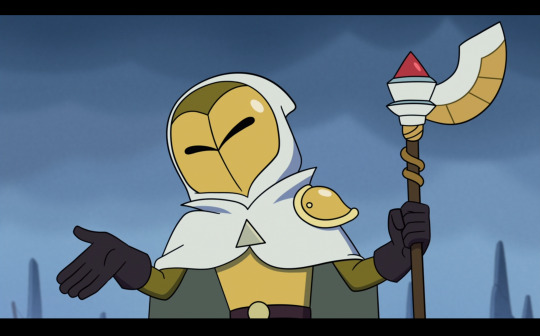
I do, however, think that the Golden Guard's greatest strength as a goon is revealed subtly in this scene.
"The Emperor ordered me to slay one. I'm just following orders."
We've seen through Lilith in the previous season that Belos covets blind loyalty, and that is what the Golden Guard offers him. He doesn't know or care why the Emperor does what he does, he just follows orders.
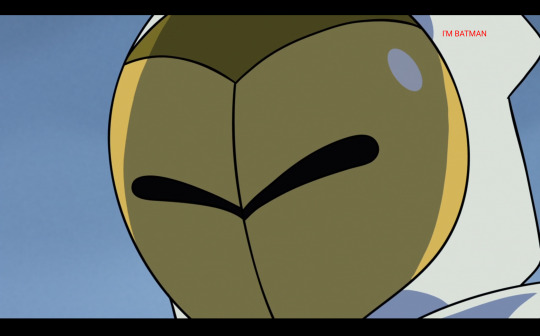
Essentially, the Golden Guard is a traditional Disney villain at this point. He is fun, bisexual, charismatic, and a physical threat. The Golden Guard we get introduced to is enjoyable to watch, and it sounds like Zeno Robinson is having a blast voicing him.
However, there is one element of the Golden Guard that we get introduced to in this episode that might fly under the radar. The Owl House is no stranger to masks, and people putting on a show to get the job done, but when we are first shown the Golden Guard in this episode, he is taking it off.

The intro sequence of this season features three characters who are under Belos' command. Lilith, The Golden Guard, and Kikimora. It then unmasks them, with Lilith becoming apologetic, and Kikimora becoming more aggressive. But the Golden Guard sits between them, removing his own mask to reveal... a single purple eye.

The eye is the window to the soul, of course. But there is something to the manner in which this is happening. Kikimora has been angered to the point of lashing out, and Lilith has been brought low with remorse. The Golden Guard, however, is lowering his own mask and staring directly at you with an air of "I'm doing this of my own accord. I see you, you see me, your move."
I wonder if agency is going to be a theme with this character.
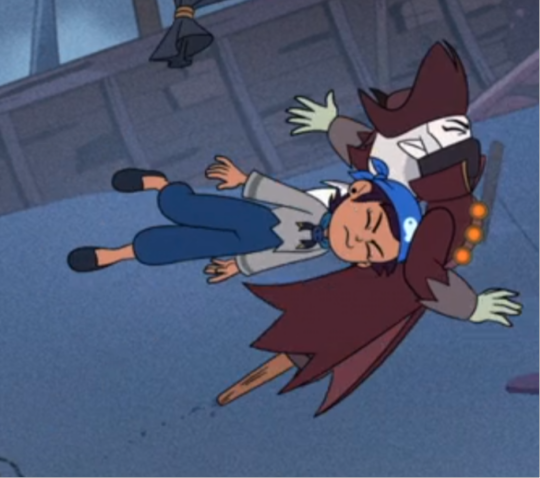
Final Thoughts
I love Hunter so much it is obscene, and there is a ton of ambiguity about him right from the bat. What is his stake in this? Who actually is he? And why does he have a purple eye?
As for the rest of this episode, Luz's guilt is starting to be expressed. In my opinion that is for the first time, but I have heard it said that this isn't a new character trait for her.
And Lilith... *sighs* There is a sentiment online as to the expedience of Lilith's redemption arc. Some people like it, others think she should have been "punished" more, and I would like to take a third rout.
I don't believe in punitive justice for fictional characters, and I certainly don't believe in telling writers how they should write. I do, however, think that it could have been slightly more interesting if the consequences of cursing Eda were explored more psychologically.
In any case, however, the series we got is the series we got, and I think it is perfectly fine, if not better, as it is. I don't see a point in getting angry online over what could have been.
Next week, I am looking as Escaping Expulsion and boy, do I have thoughts about Odalia Blight. So, stick around if that interests you.
Previous - Next
#rants#literary analysis#literature analysis#character analysis#what's so special about...?#toh#the owl house#the owl house hunter#toh hunter#toh golden guard#the owl house golden guard#We need to see more of Eda in Bloodborne cosplay
51 notes
·
View notes
Text
Genuinely Impressive (Light Spinner)
The term "humanise" refers to a kind of anthropomorphising. To humanise is to give a thing human qualities like speech or pseudo-complex thought. For example, the transformers are humanised vehicles.
In a weird way, this is how humanisation in literature works. It is the practice of taking a fictional character, thing that is very much not a real human being, and giving them the complexity befitting a human.
Unfortunately, there is a pitfall to this practice. When writers try to humanise their characters, there is a tendency for these writers to accidentally redeem their characters in the process.
Disney's Maleficent and Cruella had a problem with this. While the later got retconned from megalomaniacal to empathetic, diminishing her villainy in the process, the former got turned into a full blown hero, a decision that I... actually liked.
She Ra and The Princesses of Power, however, truly excels at humanisation, and nowhere is this more apparent than in Light Spinner.
Let me explain.
SPOILERS AHEAD (She Ra and the Princesses Of Power)

I want to prefix all of this with the fact that humanisation to any degree is a really difficult writing skill. The idea is to engineer understanding, instead of empathy, and that is a deceptively hard balance to strike.
Making a character empathetic is easy, but it's a different skill entirely to know how much of that to do, and when.
In short, artists deserve credit for the tiny acts of brilliance just as much as for their feats of awe inspiring grandeur.
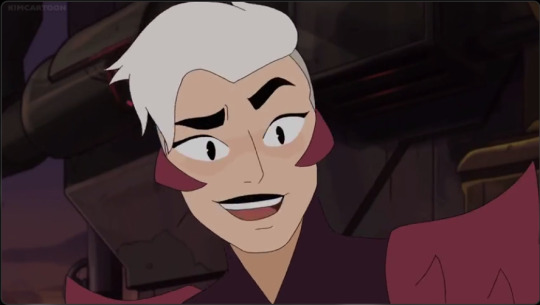
One thing that I noticed about this episode is that, to me at least, Light Spinner and Shadow Weaver are different people. Obviously they are the same individual, and there is some clear overlap between the two, but they feel like two different characters. As in, there are certain things that Light Spinner says that Shadow Weaver would never say, and vice versa.

This boils down to the idea of a character's centre. I have mentioned this before, but every character has a single element that is immutable about themselves, the thing that makes them who they are. If you would be to slowly change everything about this character, but leave this one element, they would still be the original person.
I think the difference between Light Spinner and Shadow Weaver is this centre. Shadow Weaver is cruel, and selfish, but Light Spinner strikes me as more ambitious and calculating. Obviously, there are shades of all of these in both characters, but these are the elements that are the most important to each person.
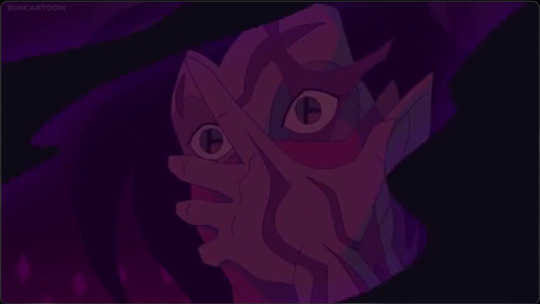
There is actually a moment in the episode where the characters switch, where Light Spinner is killed and Shadow Weaver remains, and that is in the ritual room. But to understand that, you need to understand the events leading up to it.
So, who is Light Spinner, and what elements of that are carried over into Shadow Weaver? Well, Light Spinner is ambitious, reckless, righteous, and... kind? I don't think kind is the right word, but maternal feels like a bridge too far.
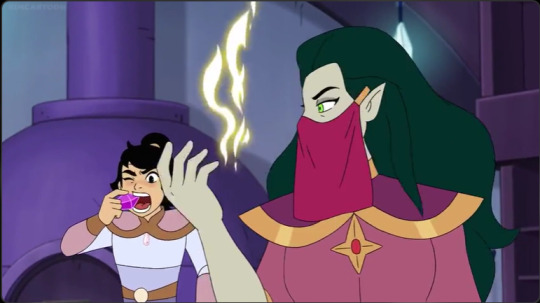
Motivations are complex. Often, actions are performed for a multitude of reasons. My main reason for writing this blog, for example, is because I love She-Ra and stories like it. But I am also doing this because I need an outlet for creativity, and because I want to develop my own understanding of the writing craft. Complexity.

Light Spinner's dynamic with Micah is one of teacher and student, but there is obviously some affection there. Light Hope is amused by his antics, and pushes him to do better because she knows he can. She fuels his passion and it is clear he has a trust for her and feels safe in her presence.
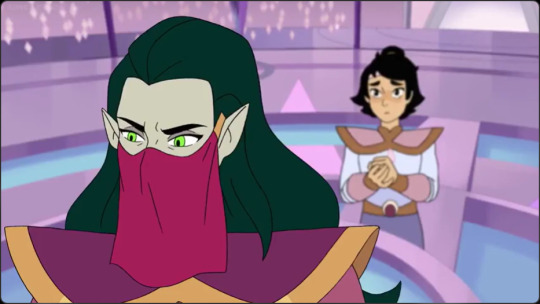
However, there is also some of that ambition there. Light Spinner is written in this episode as a limit pusher who wants to do more and gain more power. It's heavily implied in this episode that she is using Micah for her own ends.
"You have incredible power.
And I'm the one who will mould that power."
So, we can add megalomania to Light Spinner's list of attributes as well.
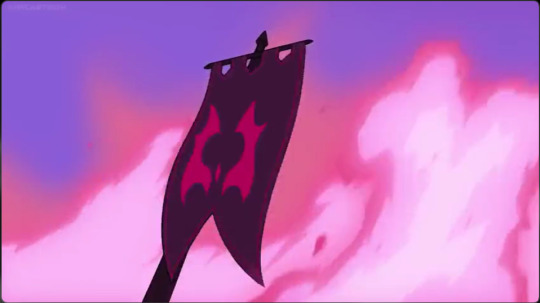
On a side note, the oracle spell things have some of the best camera placement and shot composition in the entire series. So whomever is in charge of that in universe is the most skilled cinematographer on the planet.
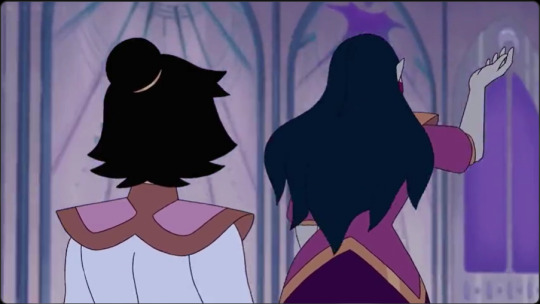
I want to point out Light Spinner's motivation here. She wants to protect Etheria from the Horde. This is partly why I think she and Shadow Weaver are so different, because Light Spinner would never switch sides like she does, because she wants to save the world.
"Norwyn and those fools don't care about magic, they just want to hold the rest of us back."
Forgive me, but that wasn't the point of the spell. That wasn't a discussion about magic, it was a discussion about people's lives. Light Spinner has taken the complete opposite memo as everybody else.
This is where the megalomania fits in. Because Light Spinner wants to be in command, she wants to be a hero, and she wants control, as well as saving Etheria. The shift in character comes when that ambition supersedes her more benevolent motivations.

Can we please take a moment to acknowledge how incredible this shot is. Light Hope is framed against the oracle spell, backlit and viewed from below like she's a ruler speaking from on high. The circle around her head mirrors the halo around the heads of saints found in stained glass windows. Light Hope views herself as a messiah figure.
But look at what that halo is showing. Light Hope is divinely surrounded by death and destruction, and the loss of the black garnet. Even now, Light Hope's greatest weapon is her radius of fear.

I also think props need to be given to this shot, with all of its complete lack of subtlety. Light Hope seeks power, and she seeks the spell as an means of achieving that, so the spell covers her eyes, blinding her to reality.

"We need this power. It's the only way to protect our people."
Here's a question: Is this the only way? Light Spinner certainly tells us that, but we haven't seen any other ideas. The guild was meeting to decide what to do, and Light Spinner interrupted it, then stormed out. So maybe they decided on something better and safer.
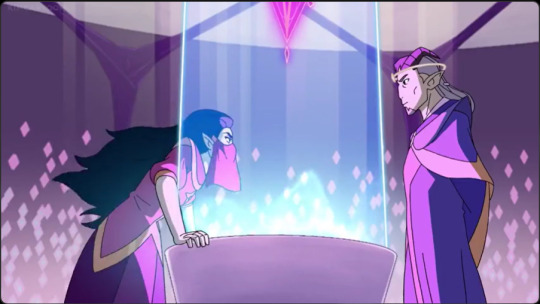
She-Ra has another "it's the only way" decision, later on in the series, that being the planet destroyer that the first ones set up. Shadow Weaver jumps on that idea as well, but its notable that in both cases, there actually is another way to defeat the horde, and it didn't compromise the morals or physical wellbeing of its participants.
The golden rule in storytelling is "Show, don't tell", and this is a case for why I disagree with it. Showing an audience something makes them believe it, telling them something makes them skeptical. If you keep telling an audience something, but never actually show it, you can end up with a distrust for the narrator, and that is used very intentionally here.
Light Spinner tells the audience over and over again how good this will be, but we never see that good. We actually see the opposite.
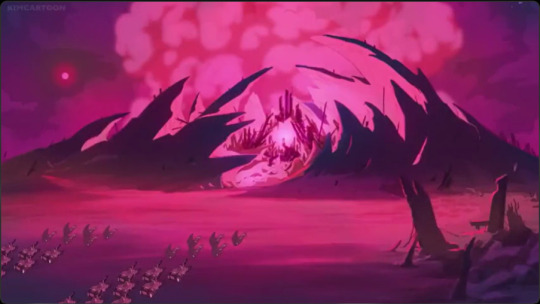
Consider this: The Horde, over the next however many years, makes very little ground, and that is mostly due to Shadow Weaver's assistance. So maybe if she did the princesses, or if she hadn't absolutely shredded the mages of Mystacor, things could have gone better.
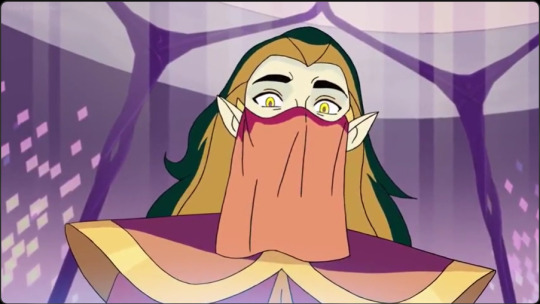
Which leads into the final domino that is set up for Light Spinner to change. Trust.
The mages of Mystacor do not trust Light Spinner's judgement, which leads to her believing her actions are futile for getting the admiration and respect that she "deserves".
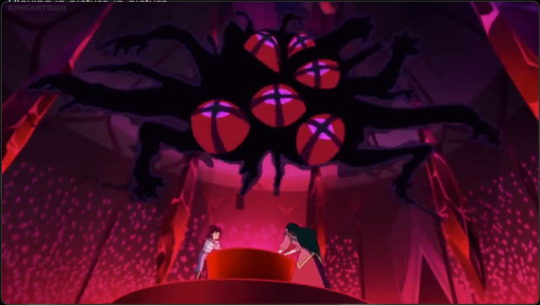
Enter the Spell of Obtainment. And as a general rule, if you are in a fantasy story and you start conjuring something with too many arms and eyes, you are probably doing something wrong.
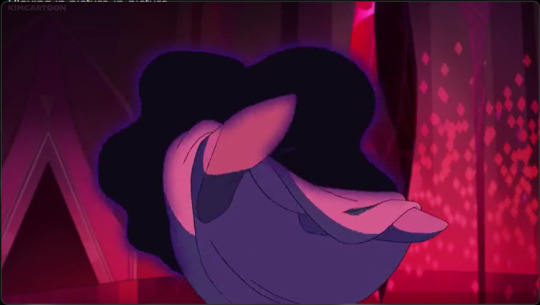
Also, this guy is dead, ponked into non-existence. A man dies, on camera, in a children's cartoon.

It is important to understand that this is a memory, and so the narrator is unreliable. From that perspective, Light Spinner was betrayed by Micah, and by the guild masters, and it got her killed.
But let's also look at what the spell would have done. Light Spinner insists that it would win the war, but doesn't reveal its actual capabilities. I think, judging from what the failure did, it would have focused power in on a single individual or two.
I think Light Spinner's idea of the ultimate spell was one that bolstered her abilities and made her into a super soldier.
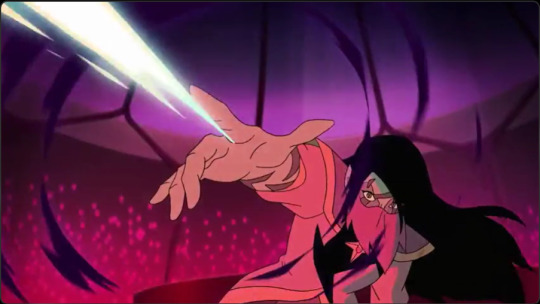
So, Light Spinner died because of her megalomania and ambition. She wanted to be the one to save the world, and it cost her. People backed away because she pushed them too far, and she can't see that.
The person that emerges from the cosmic horror bubble is Shadow Weaver, and the first thing she does is kill someone, then bail and switch sides. The power is now more important to her than what she wanted to use it for.
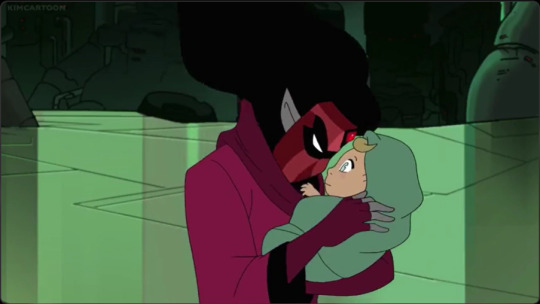
The final scene of the flashback is the adoption of Adora, and it does a few things. First up, Adora gets thrown into Shadow Weaver's care against the latter's will, and one of Shadow Weaver's first lines in the entire series is this:
"I saw talent in you the moment I found you as an orphan child and took you in."
So... that was a lie, wasn't it?

But the scene also shows a hint of Light Spinner peeking through, because I think there is something maternal there, and it is entirely separate from kindness.
One of the theses of She-Ra is that there is a bit of good, however small, in everyone. And the point of this episode is that Shadow Weaver once had it, and may still have it, but has made the choice to do evil. Villainy is very much a decision in this world, you don't get born into one side, you make your own choice.
That's something that keeps coming up, especially with Catra.
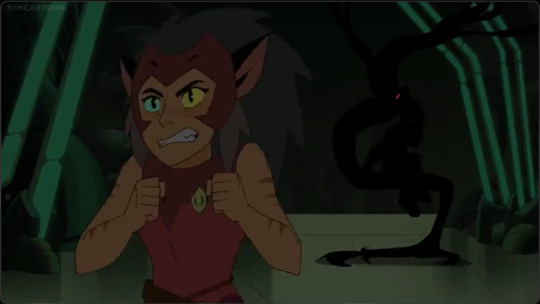
Speaking of whom, there is a reason I have separated Light Spinner from Shadow Weaver.
"You remind me of myself. You always have. Nothing was ever easy for me either. I wasn't born to power like Adora and the others. I had to earn my power, fight for it. Why should it be any different for you?"
There is some narrative parallelism going on in this episode, but it is specifically not between Catra and Shadow Weaver, but Catra and Light Spinner.
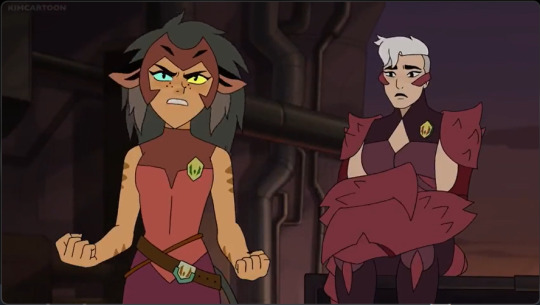
Both characters are seeking respect, and find that taken out from under them, and both push their closest friends away. The stories are extremely similar, but there are two things to dispute about this idea.
First up, Shadow Weaver is doing some heavy projecting here. Once again, this is her memory, so the narration should be taken with a grain of sand. She was also trying to do something forbidden, while Catra is trying to follow orders to the best of her ability.
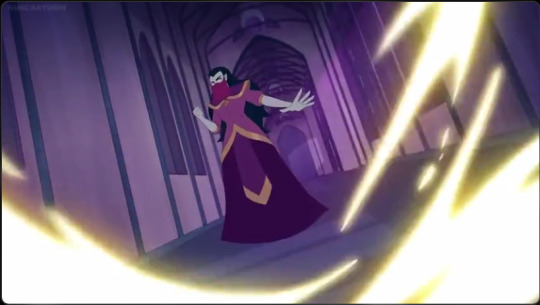
Second, Light Hope wasn't abused by the mages of Mystacor. Well, I guess she could have been, but it isn't even implied that this is the case, so do with that what you will.
I think Catra puts it best:
"I was a child when you took me in. What could I have possibly done to deserve the way you treated me?"
She-Ra as a whole does not shy away from discussion of the cycle of violence, and it is worth noting that Shadow Weaver perceives injustice directed at herself, and believes it is perfectly reasonable to take that out on a child. Yes, Hordak did probably use that anti-oxygen device on Shadow Weaver at some point, but she then made the decision to use that anger to bully a child.

Shadow Weaver's treatment of Catra in this episode is pure manipulation. There are hints of that maternal element, but they are being used to lull Catra into a false sense of security. She is falsely giving Catra affection to service her own needs. Notably, through the use of her touch, Shadow Weaver exhibits control over Catra's emotions.
AJ Michalka needs so much more credit than she has for her voice acting than she has received, especially in this episode. Catra's increasingly frantic pleas are so incredibly well realised, and the last scene of the empty jail cell is carried entirely by her acting.
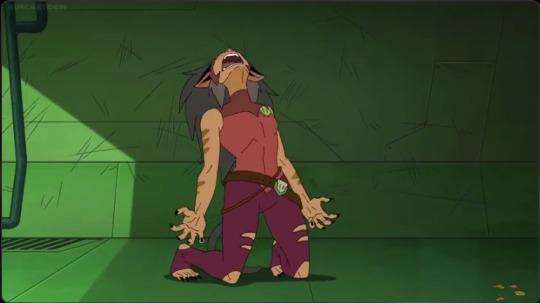
This episode adds a ton of ambiguity to Shadow Weaver, as well as providing depth to her character. But it makes one thing abundantly clear:
As justified as you think your methods are, you are still responsible for the actions of cruelty that you chose to take.
Catra is close enough to Light Hope for the end result to be reasonably likely. Shadow Weaver is what Catra will become, if she does not stray from the path she currently walks.
That's why Catra's redemption arc is so compelling to me, because we know what is at stake. We know where that path leads.
Old. Bitter. Weak.

Final Thoughts
This episode is a technical masterpiece. The first rule of literary analysis is "don't compare a story to food or architecture", but I'm going to do that anyway.
The rest of She-Ra has a habit of prioritising the big spectacles and feats of brilliance. Each episode is a fully made cathedral with stained glass windows and a mosaic ceiling. This episode isn't that it's an incredibly well-designed fountain in a park, dedicated to an old friend. It is emotional and heart-felt, and mechanically superb.
Next week, I will be analysing Reunion, so stick around if that interests you.
Previous - Next
#rants#literary analysis#literature analysis#character analysis#what's so special about...?#she ra catra#she ra shadow weaver#spop#she ra#she ra spop#she ra and the princesses of power#she ra princess of power#shadow weaver#catra#mermista can do no wrong
26 notes
·
View notes
Text
Wicked And Worldbuilding (One Short Day)
The medicine journey is a stock storyline across a ton of literature and mythology. It's the hero's journey, but broader. The protagonist must go to a place (physical or metaphorical) to retrieve a thing (the medicine) and return home. Sometimes the medicine is enlightenment, or a secret suitcase with the MacGuffin the spies are all after, or even literally just medicine. The story focuses in on this journey.
The Wizard Of Oz follows this plot in a roundabout way, and its prequel, Wicked looks like it is doing the same. But Wicked is a satire, and so it takes this plot and twists it in a different direction. Before it can do that, however, it needs to plant its heroes in a new location.
Enter One Short Day, a song that is essentially just a transition piece to show the audience that the geography has changed. But this song manages to do a lot of worldbuilding for this place, and for some of the people who reside in it.
Let me explain.
SPOILERS AHEAD: (Wicked, Annie)
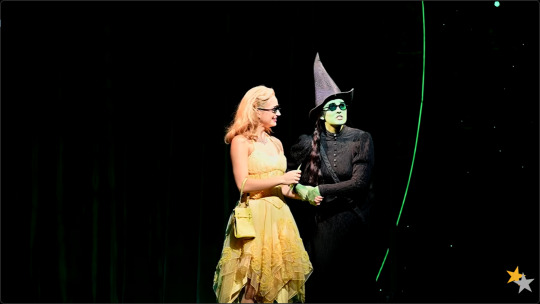
So... the Emerald City is New York City. Not explicitly, this isn't like Aslan, and the argument for the metaphor is shaky. I'm talking about vibes here.
Speaking as a non-American, New York has the stereotype of being "the big city", the place that is fast moving and cosmopolitan and chaotic in that way that you can't help but love. I don't know how well it lives up the image, but I'm guessing it's slightly more complicated.
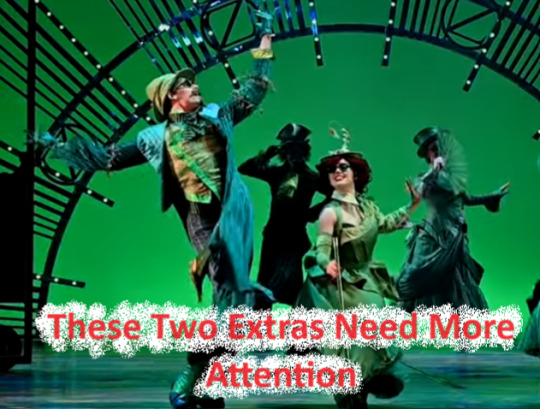
Anyway, that's what Oz is, that stereotype, but with complications. And just like any stereotype, the closer you look to it, the more it diverges, and we will get to that.
But first, you know why I associate this stereotype with New York? And why I associate the Emerald City with that stereotype? Annie, which has this exact song, but for New York.
For those who don't know, Annie is a 1977 musical and a half decent 2014 film about a billionaire named Oliver Warbucks who adopts an orphan for the hell of it. There is a lot more to it, but you don't need to know that for this post.
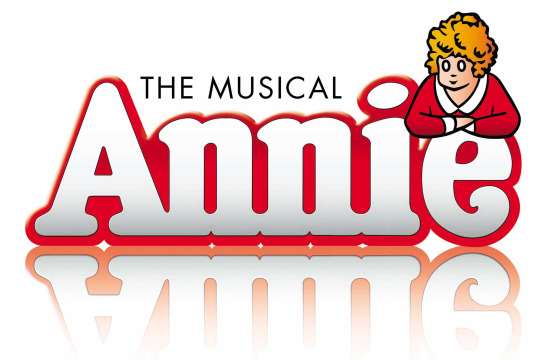
During the story, Warbucks decides to show Annie around New York, and the audience is treated to a song called N.Y.C, which has lyrics like this:
"The city's bright
As a penny arcade
It blinks, it tilts, it rings."
"To think that I've lived here all of my life
And never seen these things"
Compare that to the following from One Short Day:
"There are buildings tall as quoxwood trees"
"Dress salons"
"And libraries"
"Palaces!"
"Museums!"
"A hundred strong"
"There are wonders like I've never seen"
"It's all grand"
"And it's all green"
"I think we've found the place where we belong!"
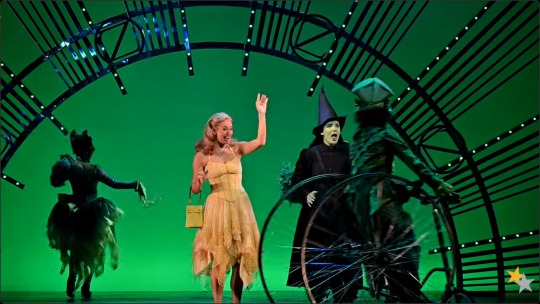
So, there's very much a common link between the two. You, the audience, are supposed to feel awe for this new place. The characters are small fish in the sea and everything has a sense of wonder.
But did you catch Annie's line in N.Y.C? "I've lived here all my life and never seen such things." Annie has some themes that, while not the focus, are far from subtext. In this case, New York City is a great and wonderous place... for rich people.
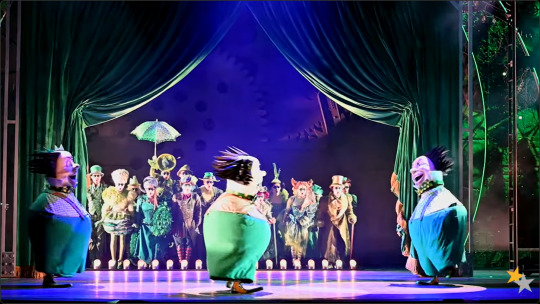
Wicked does this kind of thing a lot, because in this story, duality is a core tenet, and the first thing to talk about is the sycophantic nature of the citizens. Although that isn't exactly the truth, is it?
"Who's the mage
Whose major itinerary
Is making all Oz merrier?
Who's the sage
Who sagely sailed in to save our posteriors?
Whose enthuse for hot air ballooning
Has all of Oz honeymooning?
Isn't he wonderful?"
This doesn't read to me like spontaneous love for a leader, especially since the Wizard is established later to be looking into improving efficiency through a system of spies, and his second in command is his press secretary. Is it that far out of the question that this might be, in some way, propaganda?
That reflects on to the rest of the song. Oz is wonderous, but it feels fake. The actors are playing characters who are putting on a show by everything they do. All the citizens of Oz are living in a delicate balance of seeking popularity and coveting the popular. Everything is fake, and the fact that the real-life actors manage to get that across intentionally is really impressive.

I went to see the musical in Sydney twice (I knew one of the cast members), and the difference in performance between the first performance and the last was incredible. Not in terms of quality, but in terms of the emotions being conveyed. Most notably, Courtney Monsma's Glinda and Sheridan Adams' Elphaba changed from joy and wonder the first time, to the kind of disbelieving amazement of watching a drunk friend do something somehow both stupid as hell and genuinely impressive at the same time.
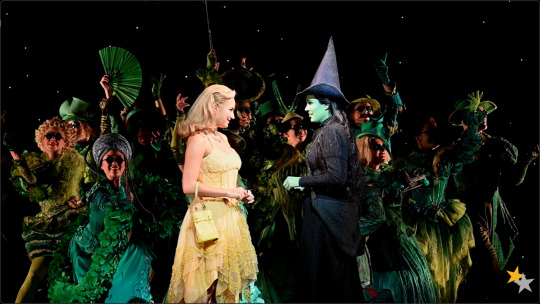
"We're just two friends."
"Two good friends."
"Two best friends"
Ah yes, the totally platonic and completely "just friends" maneuver of immediately relocating your entire life after your friend quietly asks if you want to come with them.
It is also notable that Glinda is the one standing out in this place. This is Elphaba's world, and Glinda is highlighted in it in gold. Just something to point out.
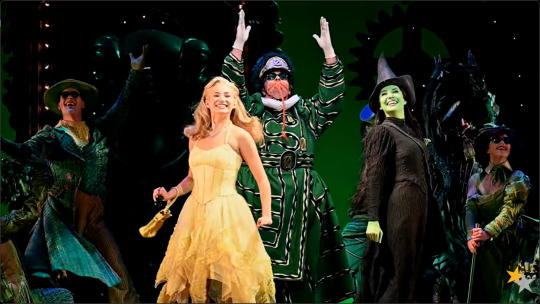
But, back to the worldbuilding, I think its important that Elphaba fits in here, because Wicked is a story about dreams and reality colliding, and part of that is Elphaba's dream of belonging, and freedom from ridicule. It feels important to the gut punch that she comes so unbelievably close to getting what she wants, but it isn't her that's the problem here, its the falseness of the Emerald City and Oz as a whole.
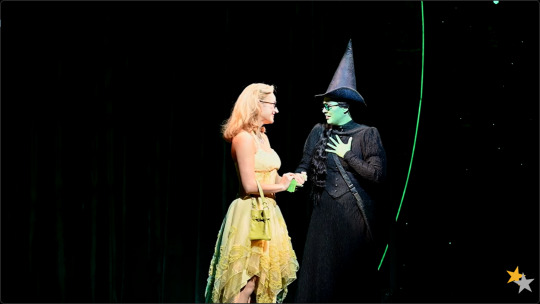
"You look positively emerald."
Suddenly, Elphie is in a place where green is a compliment. This is the defining abnormality, the thing that everyone, even her father, used as an insult.

And if you want something incredible to drive home this point, in the books, the Emerald City isn't even green. The outer wall is green, but the inside only looks that way because everyone is wearing mandatory tinted glasses make it look that way. The Emerald City's name is a lie. Everyone is just so caught up in the moment that they don't notice. It's like rose tinted glasses, but emerald.
The green-ness is actually fascinating, because the colour is usually associated with sickness and evil, but the story has been chipping away at that association through Elphaba's entire deal. So, the thematic of a specifically green city is confused, and I don't actually know what to take away from that.
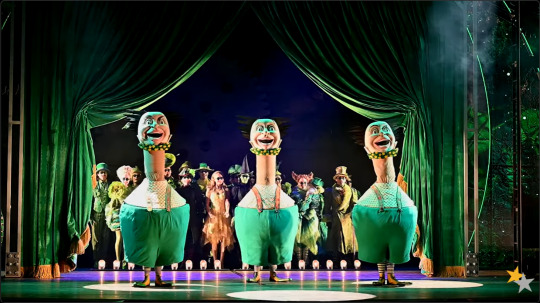
Also, the Wizard dancers look like... well I'm not going to explain what they look like because I want to keep this vaguely PG. But suffice to say this: It is a cool piece of visual storytelling that, under all the facade of heroism and wisdom and magic, the wizard is barely more than a bellend with a bow tie.

Final Thoughts
I have a completely irrational love for this song, derived entirely from my time performing this musical back in high school. I was the guy at the end who shouted, "the wizard will see you now", and that's all it took to get me to like it.
The song still isn't my favourite, however. I'm going to keep y'all guessing about what that is until we get there.
Next week, I will be looking at Sentimental Man, a song that deconstructs the musical's idea of truth. So, stick around if that interests you.
Previous - Next
#rants#literary analysis#literature analysis#character analysis#what's so special about...?#wicked#wicked the musical#wicked musical#emerald city#one short day#gelphie#lgbtq
35 notes
·
View notes